How IFAW has helped animals and people during the Ukraine crisis
How IFAW has helped animals and people during the Ukraine crisis
Your support has helped almost 192,000 animals in need
24 September 2024
Our work in Ukraine was developed initially and largely in response to an immediate crisis. As the full-scale invasion developed, IFAW set out a comprehensive, multi-year response and resilience plan – simply because it was the right thing to do. In June 2024, we had been active in Ukraine for almost 2.5 years. We are proud of the long-standing partnerships we have made with local organisations in Ukraine and of the work we have achieved together – helping almost 192,000 animals in need.
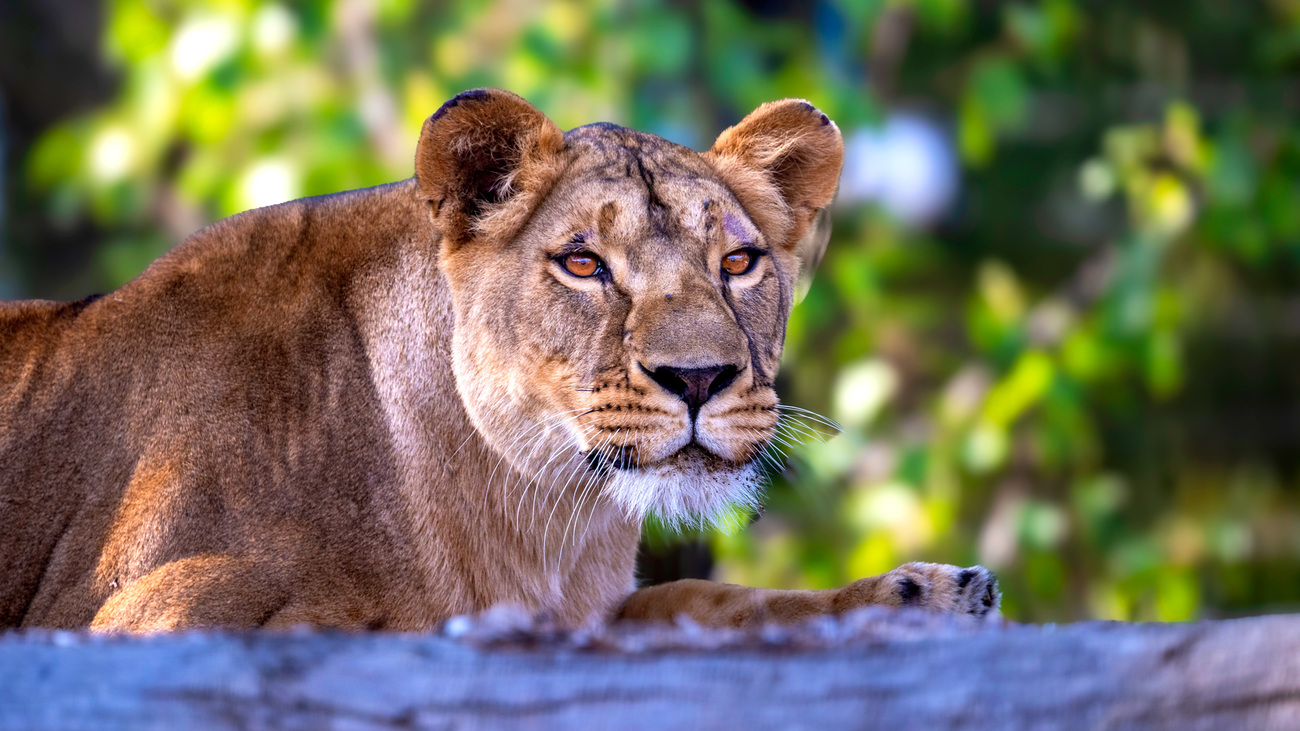
Between February 2022 and June 2024, our key activities were shaped along two main initiatives:
- Feed, Treat, Heat & Reunite: We provided support to local animal shelters and other organisations to purchase and distribute food and pet supplies, and to treat companion animals with veterinary care. During winter periods, we expanded our efforts to ensure pets could stay warm by providing support to purchase electricity generators, distribute beds and mattresses, and to adapt appropriate (thermal/insulated) sheltering. Together with our local partners we also worked to reunite pets with their families that were separated due to the impact of the war.
- Rescue, Rehab, Rehome & Release: IFAW focused on working with local organisations to help rescue and evacuate captive wildlife from zoos, sanctuaries, breeding facilities, private ownership and other facilities affected by war. We also supported local brigades rescuing and providing relief to native species of wild animals and releasing them back into safe habitats. Moreover, we trained wildlife caretakers and veterinarians in best practices on animal welfare and handling, and supported them in developing a network of regional centres for the rescue and rehabilitation of wild animals.
Between July and September 2024, IFAW's activities in Ukraine focused mostly on working with a few trusted partners in supporting the evacuation of rescued big cats from Wild Animal Rescue in Kyiv to appropriate sanctuaries in Europe, like The Big Cat Sanctuary in the UK. To read more about the journey of Yuna, Rori, Vanda, Amani & Lira to their new forever homes, please follow along here!
We will continue to monitor the situation on the ground in Ukraine and consider supporting local organisations as needs arise through individual grants. To apply for an emergency grant to help animals threatened by this disaster, local animal aid organisations can send their request to disasterresponse@ifaw.org
Protecting wild hedgehogs, bats, and hamsters amid war
12 June 2024
Hedgehogs, bats, and hamsters are unlikely to be top of mind when considering the conflict in Ukraine. But helping wild animals like these flourish in their natural habitats and preventing species extinction are crucial ways to support animals in need during a war.
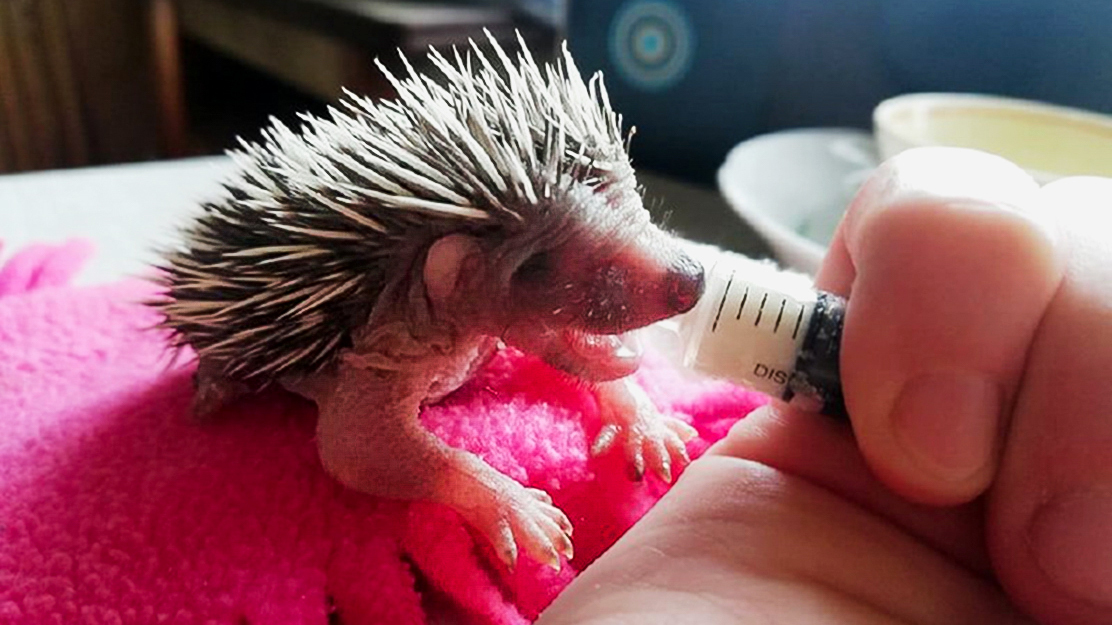
Rescued hedgehogs return to the wild
The First Private Hedgehogery (FPH) in Kyiv, Ukraine is a hedgehog shelter managed by Kyrylo and Solomia. Two people with a love for animals who joined forces and started a small organisation to rescue and rehabilitate hedgehogs.
Since the start of the full-scale invasion, Kyrylo and Solomia have faced daily challenges in taking care of the rescued hedgehogs. When the air alarm goes off to signal another raid, they rush to get themselves to a bomb shelter with armfuls of baby hedgehogs that need feeding. If the power goes out again, they find ways to ensure the heating mats for aged or sick hedgehogs still work. All this on top of the struggles of finding resources such as food, hay and medical supplies.
IFAW supported FPH with buying supplies and equipment including crates, electric batteries in case of power outages, a washing machine for reusable towels, boxes for storing animal food, and other vital supplies. ‘It is so great to know that the animals we took care of are seen around cottages or in villages one or two years later—some also walking around with their cubs. This means they were able to successfully continue their life in the wild, which is amazing!’ said Kyrylo and Solomia.
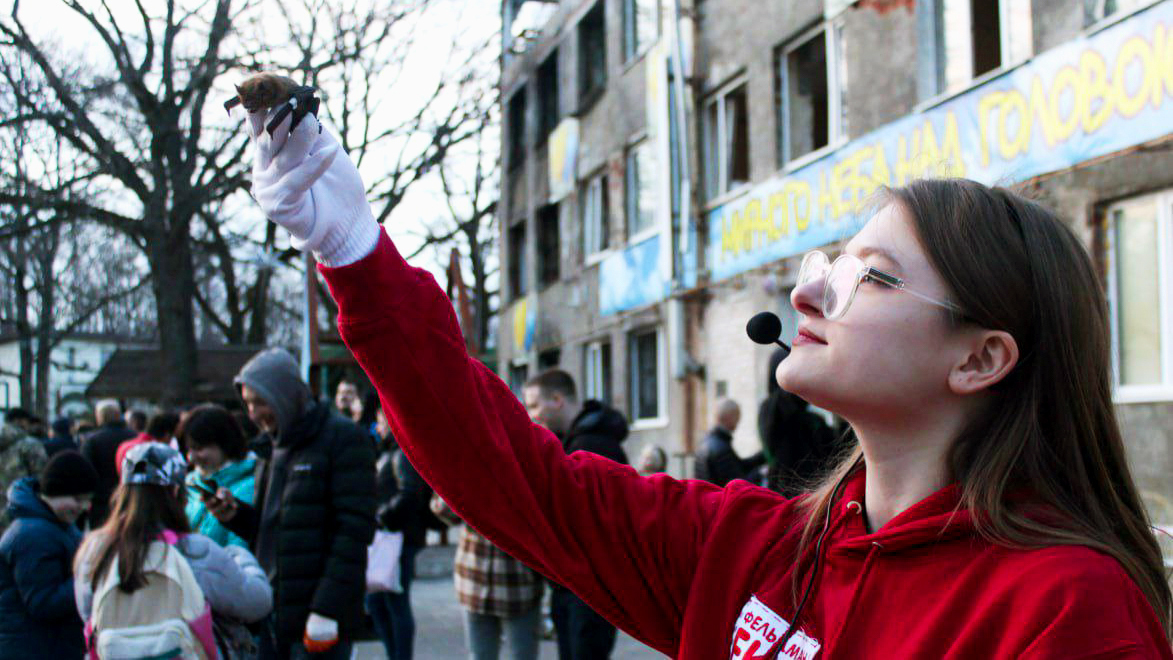
New facility supports bat rehabilitation
Between 2022 and 2024, IFAW also provided several emergency grants to the Ukrainian Independent Ecology Institute (UIEI), an NGO that runs the Bat Rehabilitation Centre near Kharkiv. Our funding was used for food, rescue missions, veterinary supplies, transport costs for rescue and release events, equipment for the center’s bat hibernation facility (such as a battery to ensure stable electricity supply during electricity cut-offs and a cage for keeping bats which are on lifelong rehabilitation), and certain staff costs.
We also helped set up a new bat hibernation and rehabilitation facility, which combines a pre-release ‘bat collider’ (a doughnut-shaped enclosure) for bats in lifelong rehabilitation and a facility focused on hibernation activities during the winter months. The new facility is designed as a transportable modular/container, so that in case of an emergency or military escalation in the Kharkiv area, it can be transferred to another city. The facility was installed in April 2024 and opened in May 2024, with a target capacity of 5,000 bats.
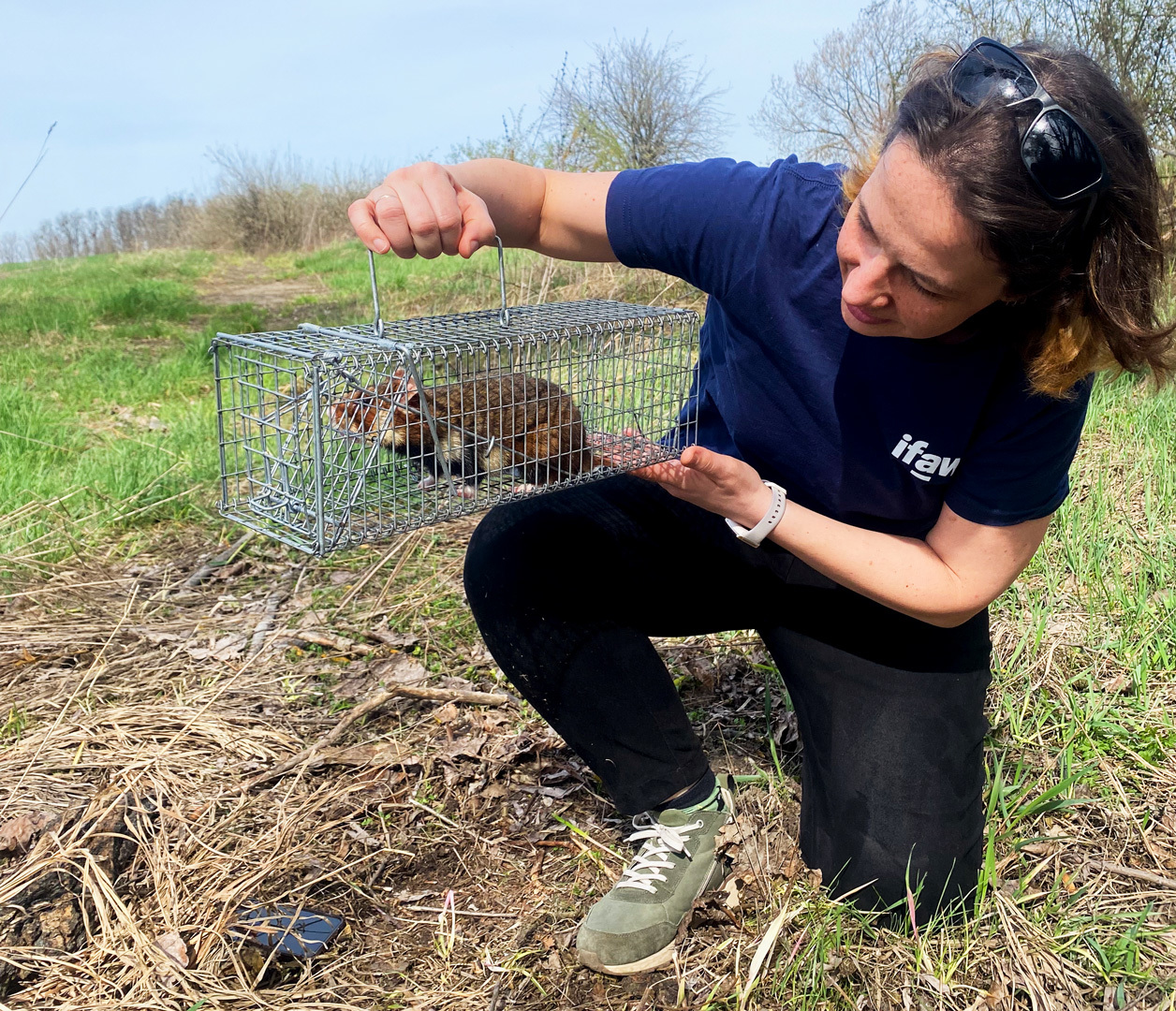
Conserving European hamsters in the wild
Conservation breeding programmes to help support European hamsters—which are declining due to agriculture, habitat loss, and persecution by those who consider them pests—have also been affected by the war. One such programme is at the Breeding and Reintroduction Centre of Protected Species at Kyiv Zoo in Ukraine. Established in 2019, the centre is supported by the non-profit Ukrainian Nature Conservation Group (UNCG), Zoo New England, and IFAW.
Traditionally, the hamsters would be released into historical ranges to support wild populations, with the animals tracked to monitor the programme’s success. However, the war has limited potential release sites and brought hamsters closer to humans, who often request their removal. So, in 2023, the Centre began rescue missions to catch the hamsters and release them either directly into the wild elsewhere or keep them at the centre as part of the conservation programme.
IFAW supported UNCG with emergency financial assistance for food, veterinary care and supplies, and equipment and crates for the hamsters. We also provided expertise to support successful releases back into the wild and improved welfare for each animal to help ensure the survival of the species.
Emergency evacuation of horses from Kharkiv to Kyiv
1 June 2024
With the recent increase of Russian attacks on Kharkiv, the Dergachi Youth Horse Riding School in the town Dergachi saw itself left with no other option than to call for help. IFAW immediately issued an emergency grant, and together with our partner UAnimals and other local organisations, 38 horses were evacuated from Kharkiv on 18 May 2024. The evacuation wasn’t a moment too soon, as the day before there was shelling nearby, which blew out all the windows in the stable, and on 30 May, the riding school was completely destroyed by a missile attack. Thankfully, no horses were killed as a result, and no staff members were present at the riding school at the time of the attack.
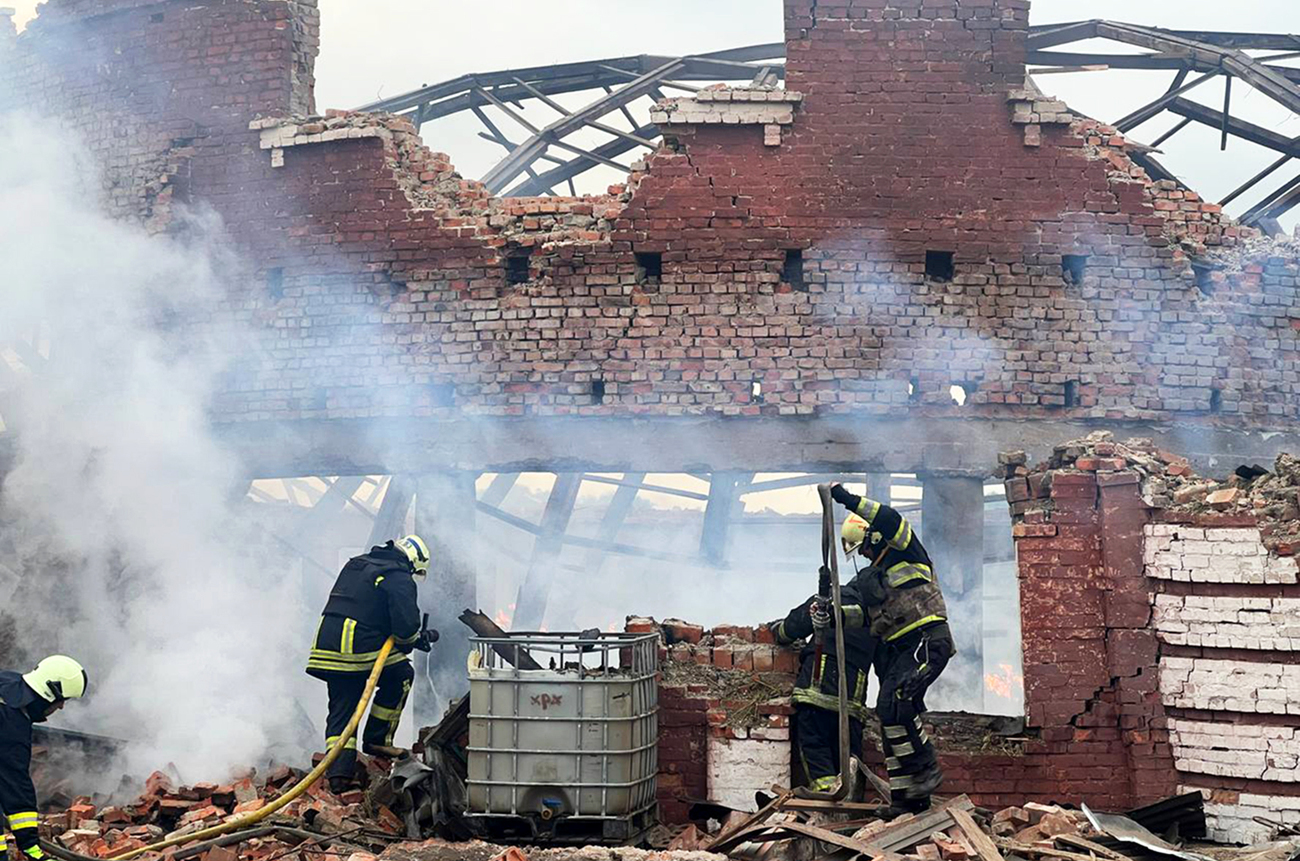
The horses have now found shelter at a stable in the village Didivtsi in the Chernigiv region and the Horse Paradise stable in Kyiv. The Horse Paradise stable is a partner that IFAW has been supporting since early 2024 with funds for veterinary products (like deworming drugs, insect repellents, salt blocks, vitamins, etc.), the repair and reconstruction of stables, and the installation of an electric fence.
Before the war, the school had about 50 horses. They’d evacuated most of them to safer regions in 2022, but then took in other horses that needed rescue from the war zone. Given the current situation, they decided to evacuate all 38 horses. Some of them had already been evacuated three times before. We hope the animals can now stay in their new homes and recover from the stress of the war.
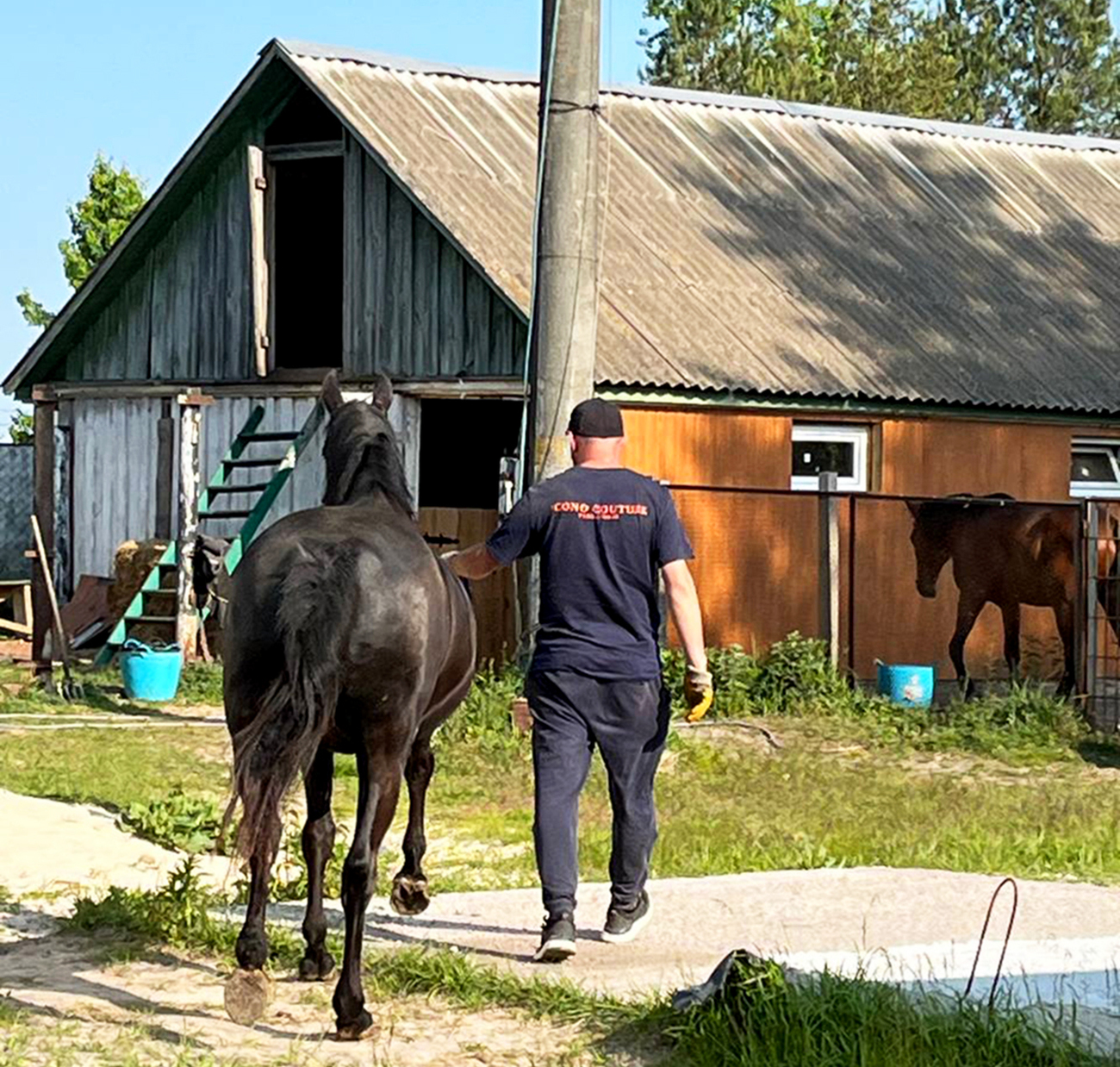
National pet registry launches in Ukraine
29 May 2024
A nationwide state system for pet registration and identification has long been a request from animal aid organisations and veterinary associations in Ukraine. The full-scale invasion by Russia expedited things, as the number of displaced pets and the stray population has grown exponentially.
That is why the Ukrainian government is now launching a national registry of pets. The aim is to keep better track of whether pets are vaccinated, help guardians find their animals when they are lost, and ensure Ukrainian legislation matches international standards and legislation. The latter is driven by the experience of hundreds of thousands of refugees fleeing to neighbouring countries in the EU, which led to a temporary waiver of pet entry requirements. The registry will be exempt from state fees, and vaccination and chipping should become standard practice for pet guardians.
Animals to be recorded in the registry are cats, dogs and ferrets—which are highly sought-after pets. The data that is going to be recorded in the registry includes the pet’s name, age, microchip number, vaccination history, and guardian’s contact details.
In March 2024, IFAW issued another grant to our partner Element of Life to deliver free vaccination and microchipping services via its Save Pets of Ukraine initiative to 7,000 pets of internally displaced people through veterinary clinics across the country. Several hundred pets have already been registered, with the aim of including all 7,000. Providing support to this government initiative is part of IFAW’s goal to support families with pets suffering from the war, minimise risks of spreading diseases between pets and wild animals, and help improve animal welfare standards in Ukraine. Should the pet registry initiative prove successful, the Ukrainian government might consider setting up a similar registry for captive wildlife.
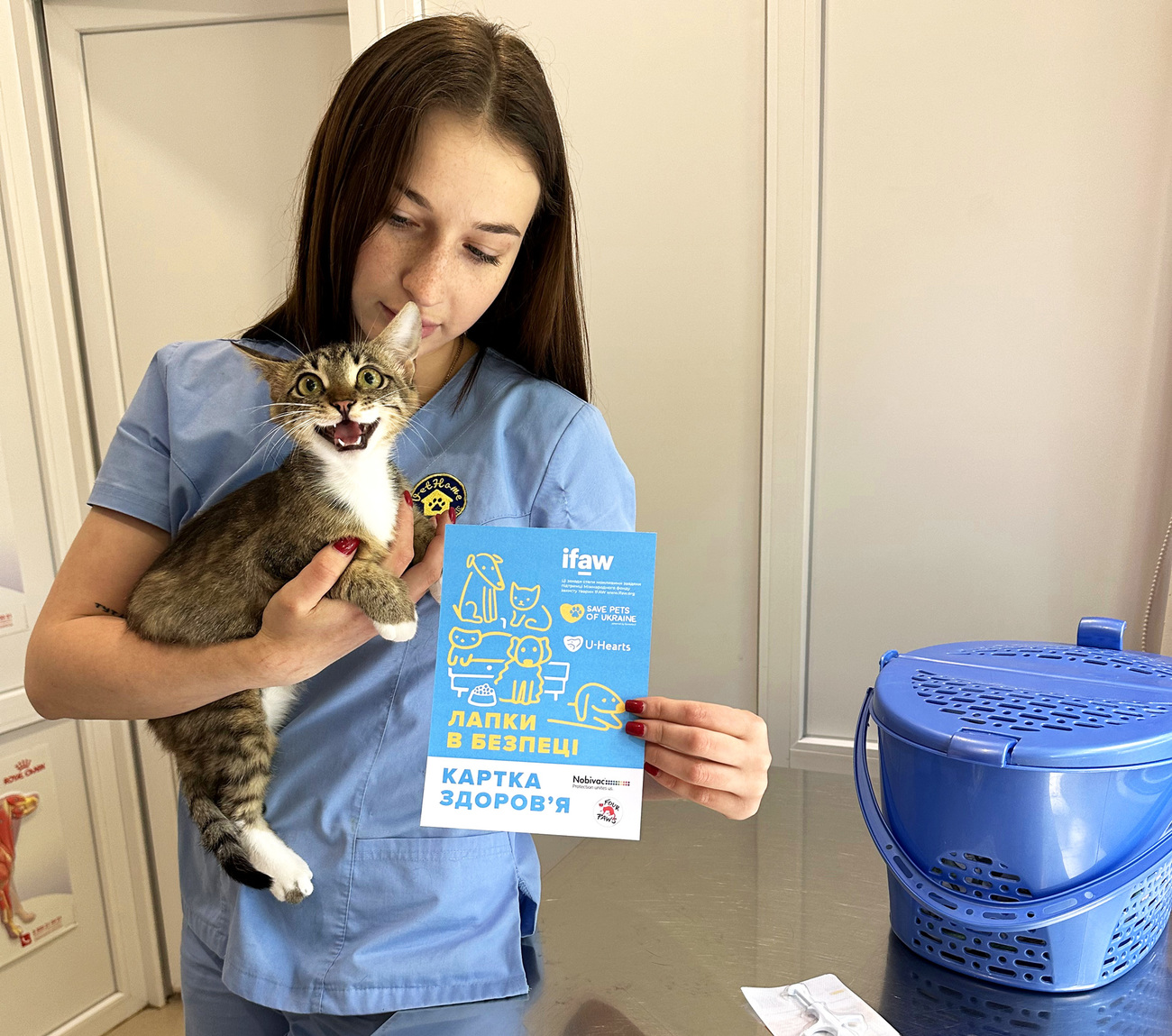
Three young lionesses rescued from a breeding facility and private ownership
19 April 2024
Our partner Wild Animal Rescue recently rescued three young lionesses, Vanda, Amani, and Lira, from an illegal breeding farm and private apartment, where they suffered from severe stress and neglect. IFAW helps support them with food and veterinary care until we find them a new home outside of Ukraine.
Read more about the three cubs here.
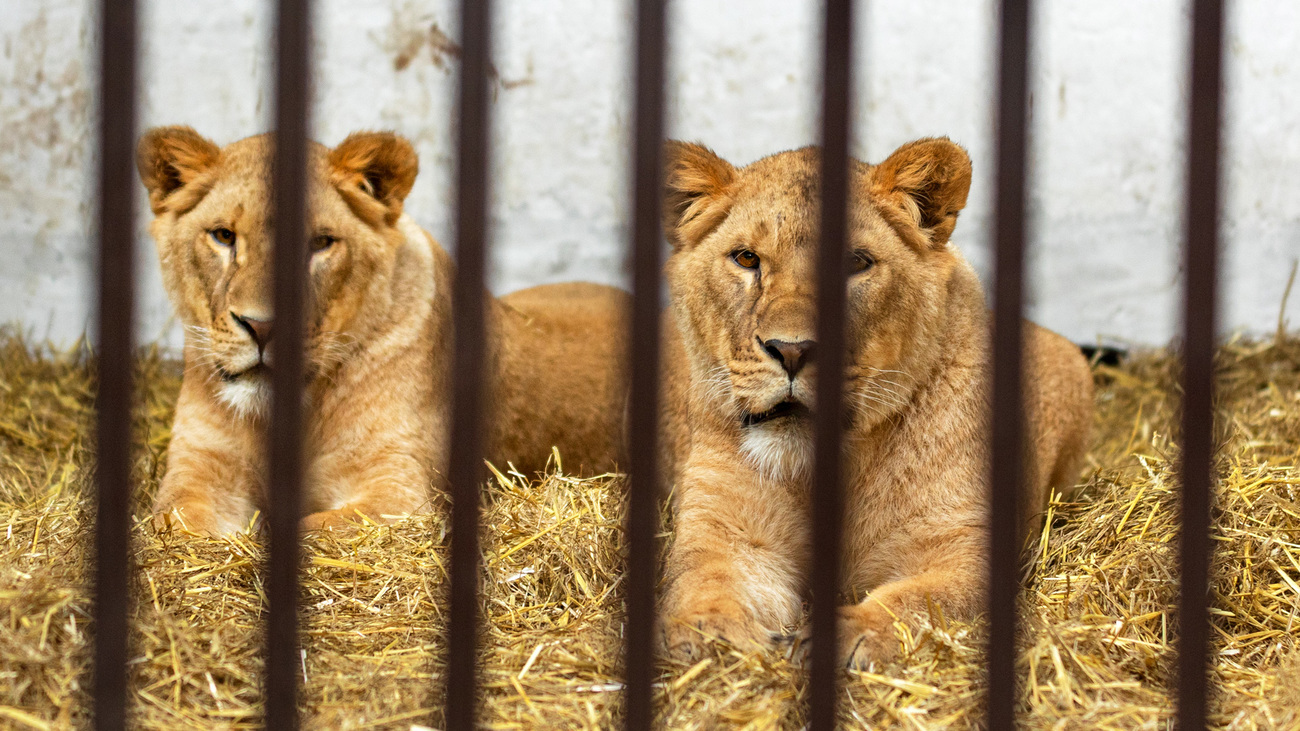
IFAW has been helping animals threatened by the intense conflict in Ukraine since February 2022. Thanks to overwhelming support from people around the world, IFAW’s work and that of our partners continues to make a difference for the animals and people impacted by the war in Ukraine and around the world.
A lioness and her three cubs are safe in their new home in the UK
22 March 2024
Lioness Asya and her three cubs Teddi, Emi, and Santa have arrived safely at their forever home in the United Kingdom. In June 2023, they were evacuated from war-torn Ukraine by IFAW and Wild Animal Rescue and cared for at Poznań Zoo in Poland while a permanent home was secured.
After a journey of more than 48 hours across six countries, via road and ferry, the four lions arrived at Yorkshire Wildlife Park late at night on Wednesday 20 March.
As the cubs were born at Wild Animal Rescue in October 2022, they knew no other life than their enclosure. According to an article in The Mirror, after the cubs were released, they initially huddled together but soon got to playing with the logs and other enrichment materials in their enclosure. Asya was released into a pen next to them and seemed quite quickly at ease, taking in the sky and her surroundings.
We are happy that they will be able to feel the grass beneath their paws and rummage around like young lions should. Asya and her three cubs have gone through a traumatic ordeal, but they are now safe and miles away from the warzone they came from.
Wild animals born in captivity and rescued from these situations cannot return to the wild, so providing quality lifelong care is the priority. Housing options can be scarce, and the ongoing war has caused a marked influx of animals needing homes, straining the already limited number of suitable venues with capacity. Yorkshire Wildlife Park is well placed to offer these big cats a good life in the park’s Lion Country area, where they have housed numerous lions similarly rescued from traumatic situations.
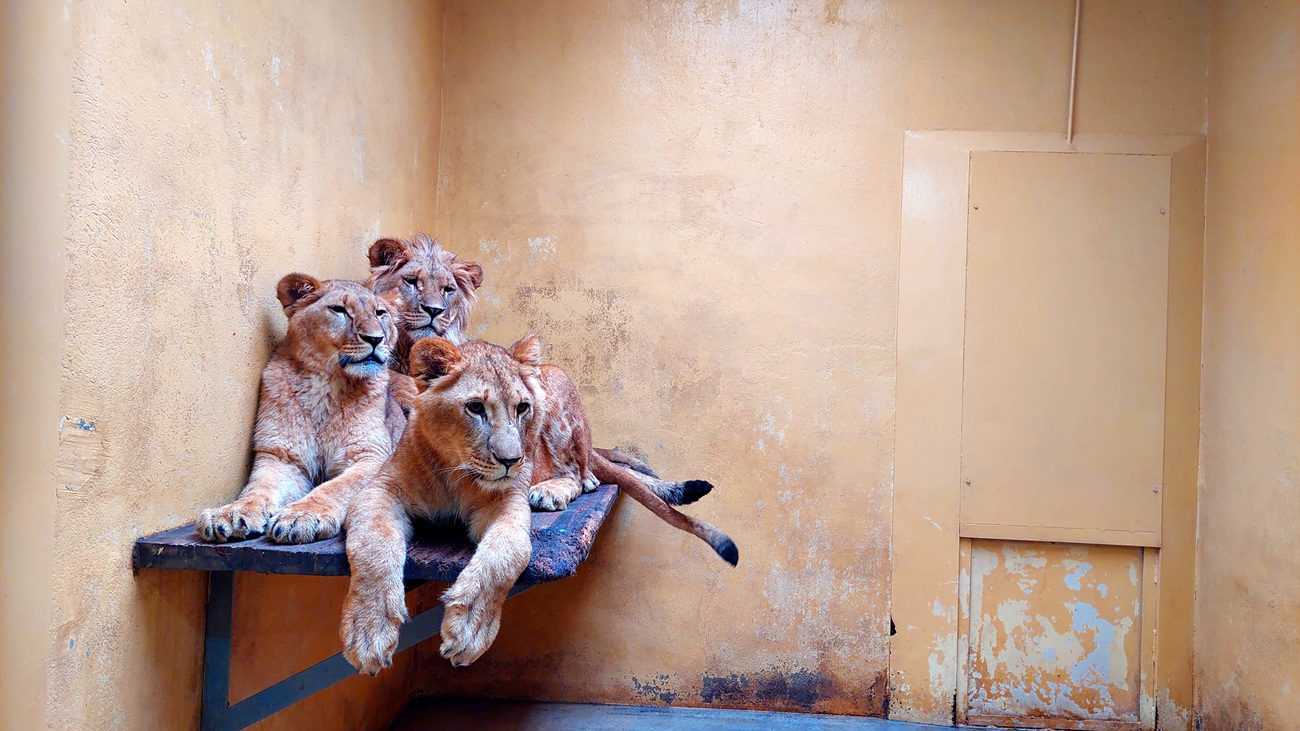
Safe refuge for rescued wildlife in Western Ukraine
23 February 2024
Kasova Hora is the largest meadow-steppe area in Central Europe and stretches out over more than 130 hectares (321 acres) in Ukraine’s Ivano-Frankivsk region, 71 hectares (175 acres) of which belong to a local community. The community-owned area was at risk of wildfires because of significant shrub overgrowth and numerous alien species. To help restore the ecosystem, local environmental group Eco-Halych worked with IFAW to set up a wildlife rehabilitation and release area.
Not only will rescued animals have a safe space to be rehabilitated and become wild again, but they will also help recreate and preserve the unique meadow-steppe ecosystems of the area through moderate and controlled grazing.
The community land is under consideration to become a protected nature reserve. This status will hopefully be granted in the coming months. The intention will then be to rehabilitate and release wild animals in a fenced-off area within the new nature reserve.
Several animals rescued from the war or from inappropriate living conditions have already been released into the reserve, including one Przewalski’s horse, an injured hare, five roe deer, and a mouflon—a wild sheep species.
One of the young roe deer was found all alone in a forest, and another was found by local mushroom pickers near its dead mother. Both were taken in by local families, kept in their backyards, and fed cow milk. The young male hare was the sole survivor of an attack by stray dogs on him and his siblings. He was taken in by a group of military personnel for some treatment. The female Przewalski’s horse was found wandering in the Kyiv region, at risk of being shot by local people for food. Luckily, the military was able to guard it for a few months. After being rescued by Eco-Halych and Wild Animal Rescue, these animals were placed in temporary enclosures near Kasova Hora. There, they received food and care and were able to socialise with other animals.
‘These animals initially lacked the skills to survive in the wild, but with time and patience, we’ve been able to slowly rehabilitate them,’ explains Natalia Gozak, wildlife rescue officer Ukraine at IFAW. The animals have moved onto a plot of 23 hectares (2 acres) of fenced meadows in Kasova Hora. ‘Here, we should see their natural wild instincts start to flourish so they can truly live as the wild animals that they are. Seeing rewilding in action is always exciting.’
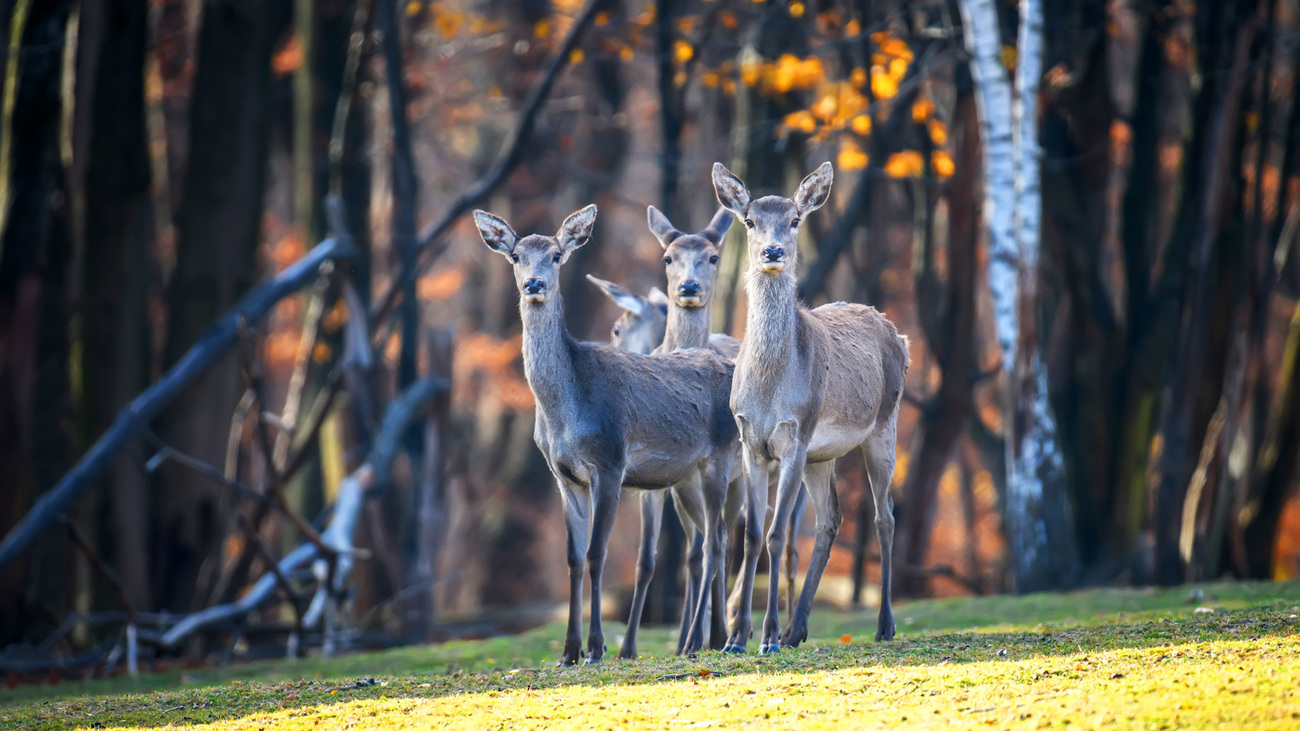
New home for two wolves rescued from captivity in Ukraine
22 February 2024
IFAW has supported the evacuation of two wolves from Wild Animal Rescue in Ukraine to Arcturos, an environmental centre and animal sanctuary in Greece. The two female wolves, Dora and Venera, were both raised in captivity, but the private owners could no longer care for them.
In the Zhytomyr region, Dora was left alone in a cage after her owners fled the country due to the war. For a while, locals fed her sporadically—once every three days or so. Evacuation was risky due to the abundance of mines in the area, but Wild Animal Rescue manager Natalia Popova was eventually able to rescue her. Upon examination, Dora was found to have rickets in her back legs.
Venera was found in the Kyiv region. Most likely, she had been purchased as a young puppy by owners who mistook her for a domesticated dog. However, as she grew up and started behaving like the wild wolf she is, the owners gave up on caring for her.
After being transported by Wild Animal Rescue from Kyiv to the Poland-Ukraine border, M&M Zoo Service brought the wolves to their final destination in Greece. After arrival, the wolves were placed in separate enclosures, so the Arcturos team can monitor their behavior while they are on their own.
Dora and Venera will soon join a pack of other wolves or establish a new pack of their own in the Agrapidies area of the sanctuary—a large, natural, 70,000-square metre oak forest positioned at an altitude of 650 metres, closely resembling their natural habitat. It will provide a peaceful refuge away from the war zone.
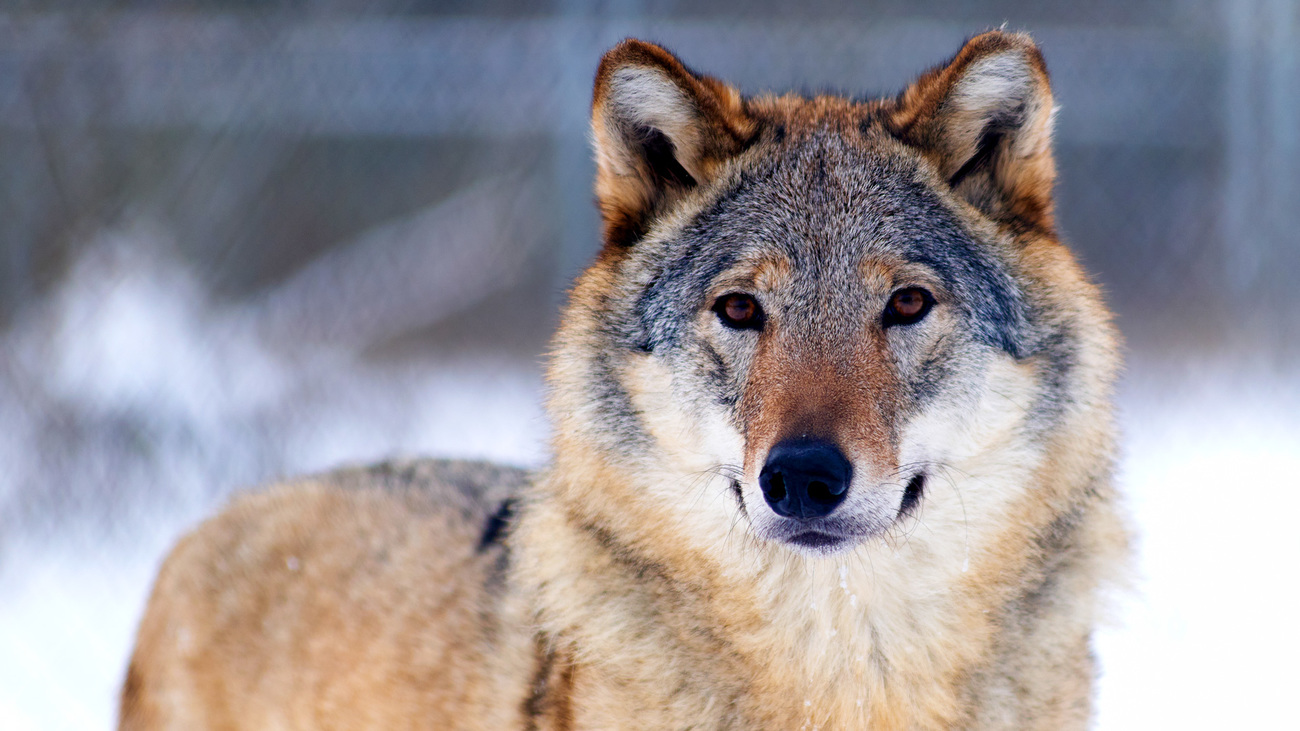
Three lions rescued from Ukraine find forever home in France
26 January 2024
Three lions have been successfully moved to their new home at Parc de l’Auxois in France, after travelling for 4 days (about 88 hours) out of war-torn Ukraine.
The first is Atlas, a male lion born in July 2021. He was rescued from a private owner in the Kyiv region who was ‘not enjoying [the lions] anymore’ and reported that the ‘male became too aggressive.’ This aggression is likely due to the extremely small size of Atlas’s enclosure and the nearby bombing he experienced. When he was found, Atlas had wounds from the cold concrete floor, and he was extremely overweight at 294 kilograms (648 pounds)—120 kilograms (265 pounds) is the norm—as he was overfed with bad poultry.
The second is Luladja, a lioness born in 2021*. In summer 2022, she was rescued from eastern Ukraine. Alongside Queen, the third lion set to go to France, she stayed for a few months in temporary enclosures. When the pair arrived at Wild Animal Rescue, Luladja was underweight as she is a slow eater. She also required dental care.
Queen, another lioness, was also rescued from eastern Ukraine in summer 2022. When she and Luladja arrived at Wild Animal Rescue, Queen was overweight and ate most of the food served to the pair—so the two lionesses soon got separated during feeding time. Otherwise, they enjoy each other’s company.
After a final veterinary check, Natalia Popova transported the animals from her rescue center to the Ukraine–Poland border. From there, they were taken by M&M Zoo Service to their new home in France.
* Late January we were notified by Parc de l'Auxois that their veterinarian has estimated the two lionesses to be around 10 years old. The difference is most likely caused by the fact that in 2022 the veterinarian at Wild Animal Rescue had to make a visual assessment without sedation, whereas the veterinarian at the Parc was now able to do a full assessment with sedation.
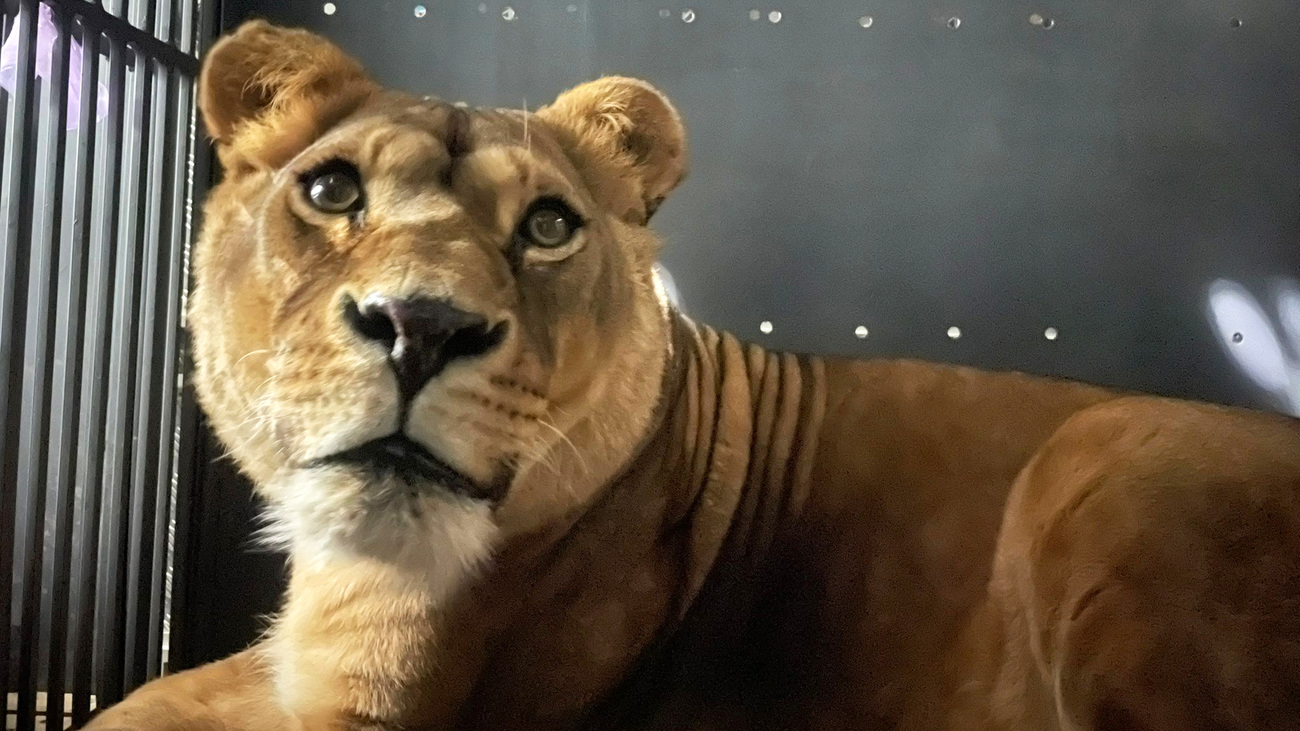
Missile attack in Kyiv
2 January 2024
In the early morning of 2 January, there was a massive missile attack in the Kyiv region in Ukraine. Our colleague Natalia Gozak, who lives in Kyiv, immediately checked in and confirmed she and her family are doing okay.
‘I spent the night with my children sheltering in the hallway of our house,’ she said. ‘We slept on the floor, hiding from the glass windows. We've been up since before 7 a.m. because of the explosions. They are very loud.’
Gozak also reached out to our partners in and around Kyiv and learned that debris from one of the dozens of missiles struck just 300 metres from Wild Animal Rescue. Wild Animal Rescue is a rescue centre jointly operated by Natalia Popova and Help Animals of Ukraine, rescuing captive wild animals like lions, tigers, and wolves from private owners who have fled the war. The attack’s impact has left Popova, her staff, and their animals in shock.
This video shows lioness Yuna mere moments after the attack, when the team at Wild Animal Rescue was checking on all the animals. Yuna unfortunately suffered a severe concussion, as she was unable to hide from the missile debris that struck near her enclosure. She was left disoriented and unable to stand. ‘It will take quite some time for her to get well,’ said Popova.
As local veterinarians were out of reach, Gozak helped Popova find veterinary support elsewhere. Our friends at AAP, a specialised rescue centre in Spain, and Arcturos in Greece responded right away and offered helpful advice on emergency procedures. Luckily, the local veterinarians were later able to respond and are now working at Wild Animal Rescue to help provide the necessary treatment to all affected animals.
This morning’s event unfortunately underlines why we are continuously trying to get as many animals as possible out of Ukraine and into safe homes elsewhere. Thanks to your support, we are able to do so.
African leopard Brave evacuated safely from Ukraine
24 November 2023
Brave, an African leopard, successfully reached a rescue centre in Spain after travelling over 3,600 kilometres (over 2,200 miles) in three days through five countries, leaving war-torn Ukraine.
The male big cat who is four years old, was found after his owner—a private exotic pet collector—evacuated eastern Ukraine, leaving Brave behind without food or water. Wild Animal Rescue in Kyiv rescued him, finding him emaciated and traumatised from nearby explosions.
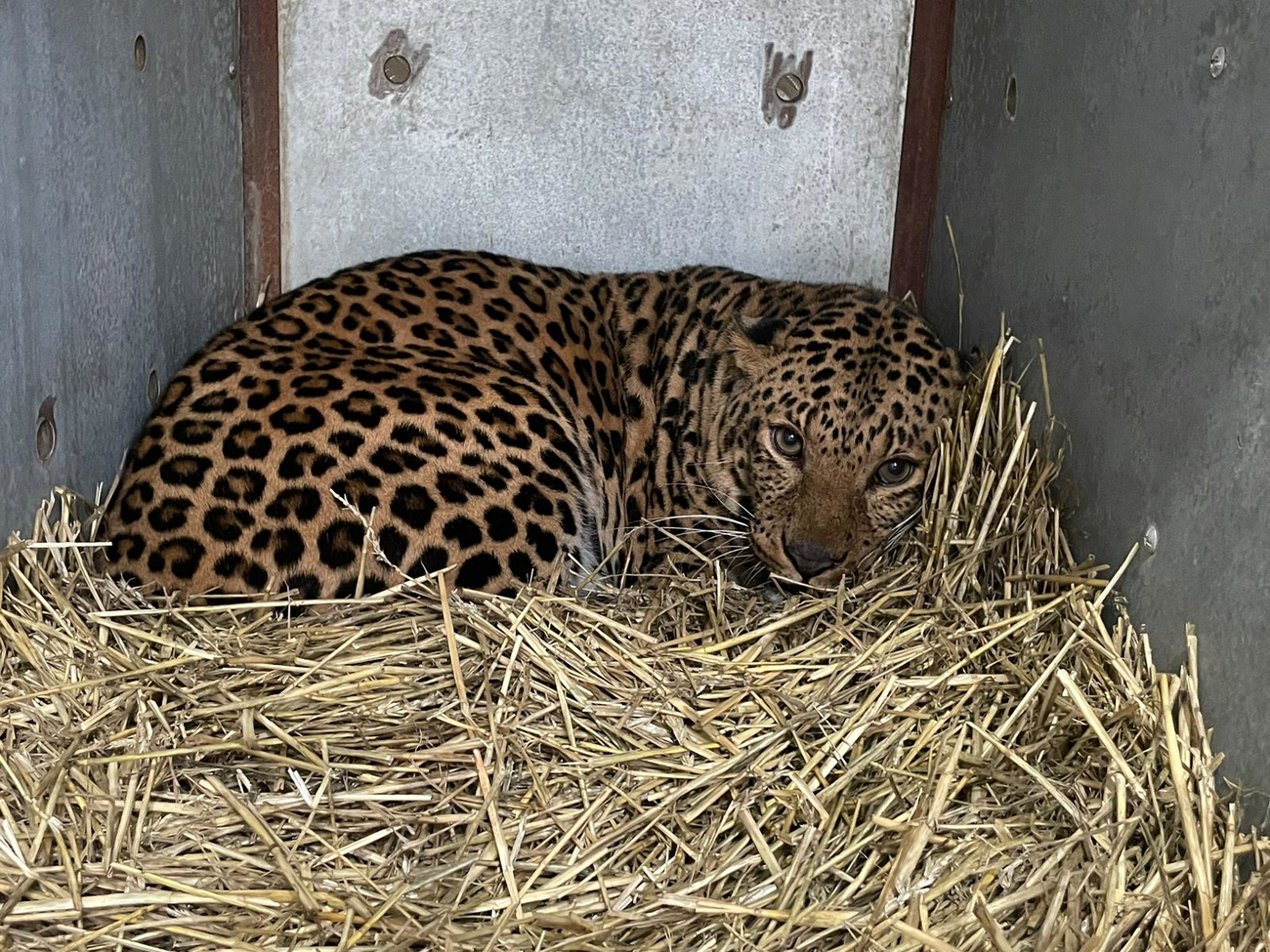
IFAW supported Wild Animal Rescue in caring for Brave and organising his transportation to the Poland-Ukraine border. From there, a team from AAP Animal Advocacy & Protection travelled with Brave to their specialised rescue centre in Spain, where he will remain until they have found him a forever home.
This rescue is just one in a wider mission led by IFAW and Wild Animal Rescue to evacuate big cats and other wild animals. Earlier in June, a group of five lions was rescued from Ukraine, travelling for close to 20 hours before reaching safety at Poznań Zoo in Poland.
A mother lion, three-year-old Asya, was rescued from a private breeder while heavily pregnant and gave birth to three lion cubs in October 2022. Although the cubs—named Teddi, Emi and Santa—have had a traumatic start in life, they are fortunate enough to be together and to have had little human interaction. A male lion, two-year-old Viseris, was rescued from the same breeding facility but is believed to be unrelated to the others.
As soon as a suitable new home has been found, the lions will be transferred and live out the rest of their lives safely away from conflict.
Support for rescue and release of wild animals
31 October 2023
Conserving critically endangered wild hamsters
Wild hamsters are critically endangered. That’s why the Breeding and Reintroduction Center of Protected Species at Kyiv Zoo, supported by the Ukrainian Nature Conservation Group, runs a conservation breeding program. Between April and December 2023, IFAW granted emergency financial assistance to the Center to help provide food, veterinary care and supplies, and equipment and crates for the hamsters.
Sadly, wild hamsters are often thought of as pests. Thanks to support from IFAW and UNCG, the Center has been able to launch rescue missions to catch hamsters found in gardens and release them either directly into the wild or to include them temporarily in the conservation program.
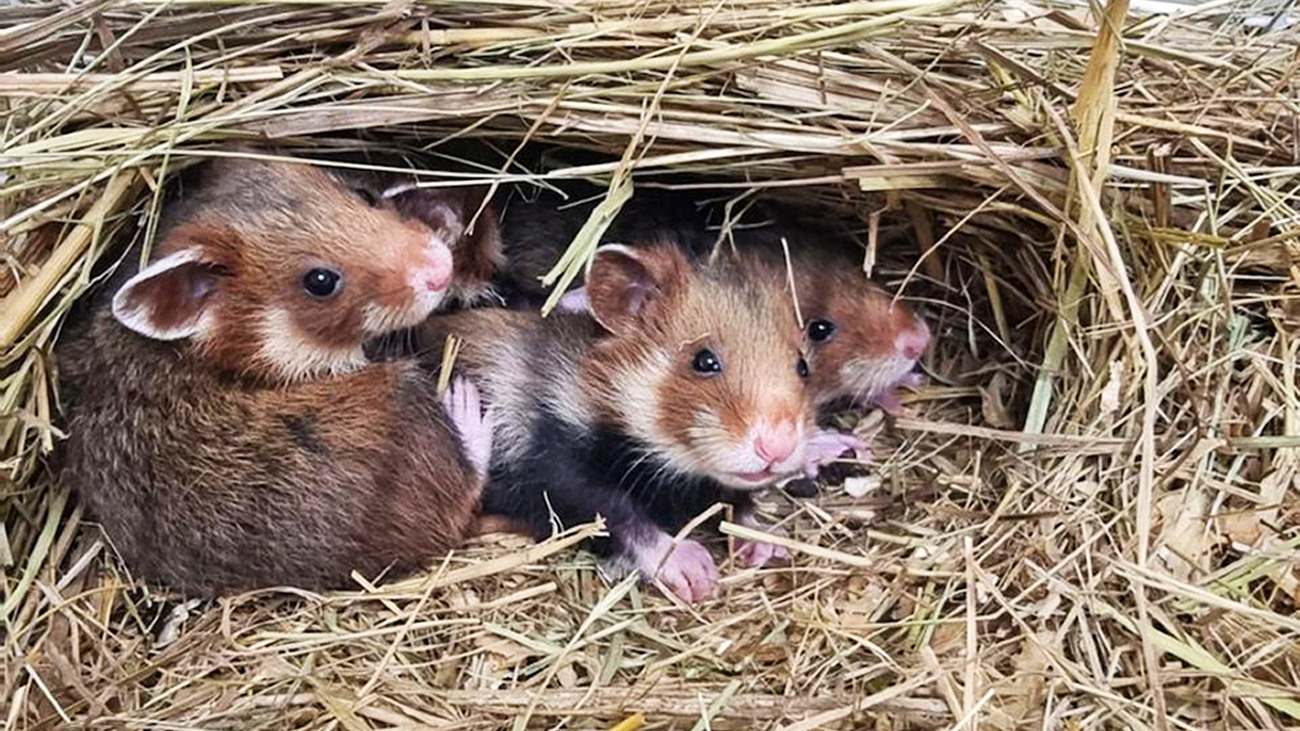
Rehabilitating and releasing swans
The Swan Shelter in Mezhyhirya, a public park located in the Kyiv region, cares for wild birds rescued from war-torn regions. IFAW has provided emergency funds to purchase food and feeding buckets and repair enclosures. After rehabilitation, the birds are released back into the wild when possible.
Several birds rescued during winter were released into the park’s ponds once it became warm enough. In March and April, 6 swans left these ponds to find new homes. Later in the spring, 12 more swans joined a bigger group of 11 in one of the ponds.
IFAW also supported Bird Shelter Niushannikovo in the Kyiv region, where 12 young swans were rescued and rehabilitated in the spring. They are now old enough to soon return to the wild.
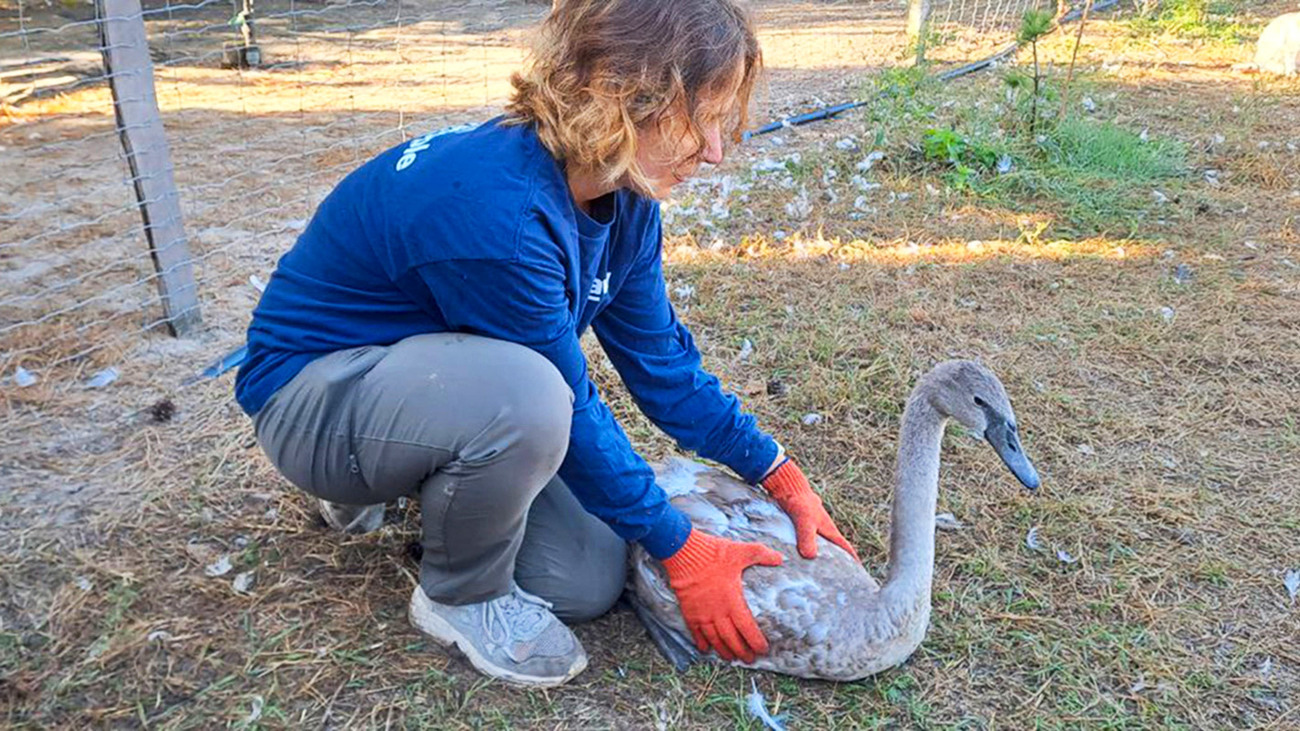
Helping animals join families
31 August 2023
A new home for a rescued beaver
In early June, a young beaver was found with a front paw fracture. She was transported to Wild Animal Rescue, a centre supported by IFAW in the purchase of food, veterinary medicine, and fuel costs for rescue and release missions.
The beaver’s paw unfortunately required amputation. By August, she was fully rehabilitated and ready for a new home. With no proper beaver sanctuaries available in Ukraine, a release team traveled to IFAW’s partner Nature Park Beremytske and identified a suitable wild beaver family which adopted her. She was microchipped before her release, and the park staff temporarily supervised her to ensure successful integration.
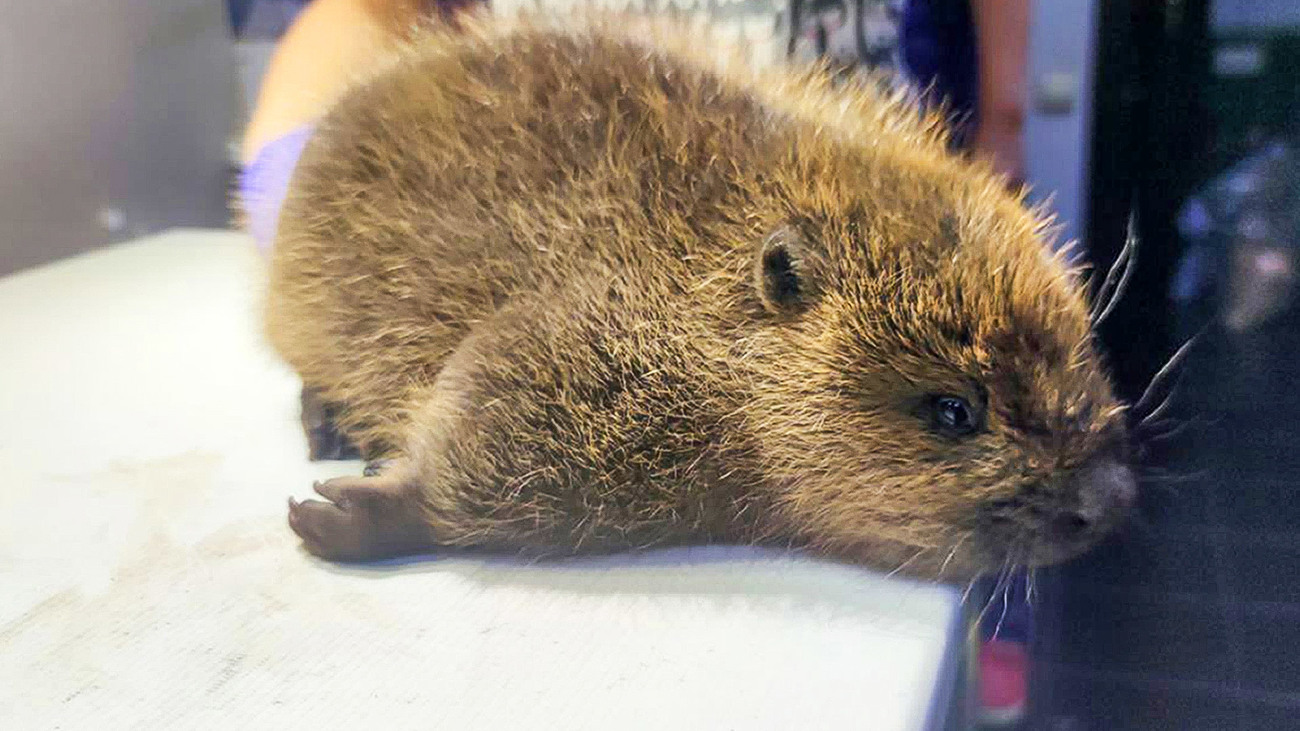
Reuniting dogs with their people
IFAW provides grants to Nova Ukraine, a Ukrainian charity that supports animals in shelters and works with local rescue centres, including Animal Rescue Kharkiv (ARK). Through their work, more than 150 pets were reunited with their families.
One such dog was Terry, whose family evacuated from Kozatskoe, a village in the south of Ukraine, to Germany. As the situation worsened, Terry needed to be rescued. The ARK team retrieved Terry, conducted a medical exam, administered vaccines, and chipped her. Later, she was reunited with her family in Germany.
Two dogs, Hrom and Dunai, spent five days floating on a raft with no food or clean water. At ARK’s veterinary clinic, they were examined and treated while the team attempted to track down their family. Sadly, their family had been forced to evacuate to Poland. Although Hrom and Dunai were not able to join them, they are now part of another loving home with soldier and animal welfare volunteer Natalia.
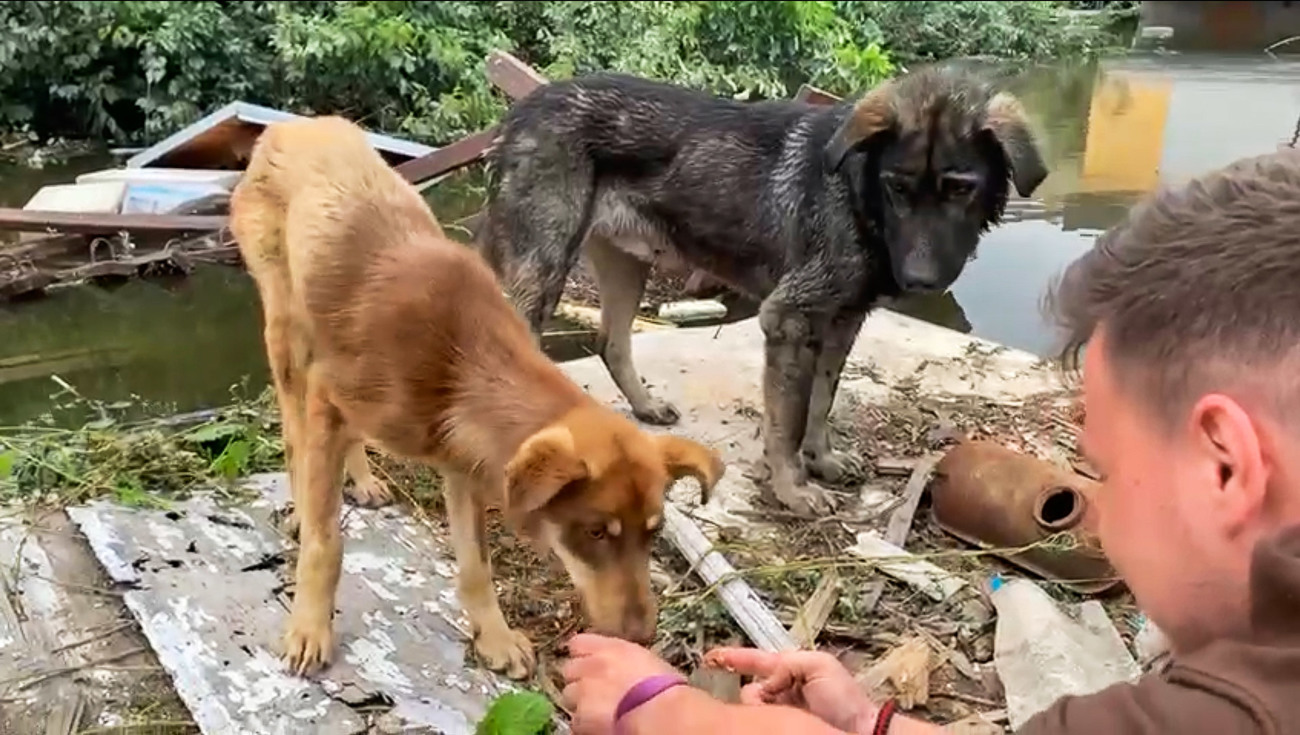
IFAW responds to destruction of Ukraine’s largest dam
8 June 2023
In the wake of the destruction of Ukraine’s largest dam, IFAW is helping our partners in the neighboring region of Mykolaiv, to which many people and animals have fled due to flooding.
>>> Follow the latest updates on our response here.
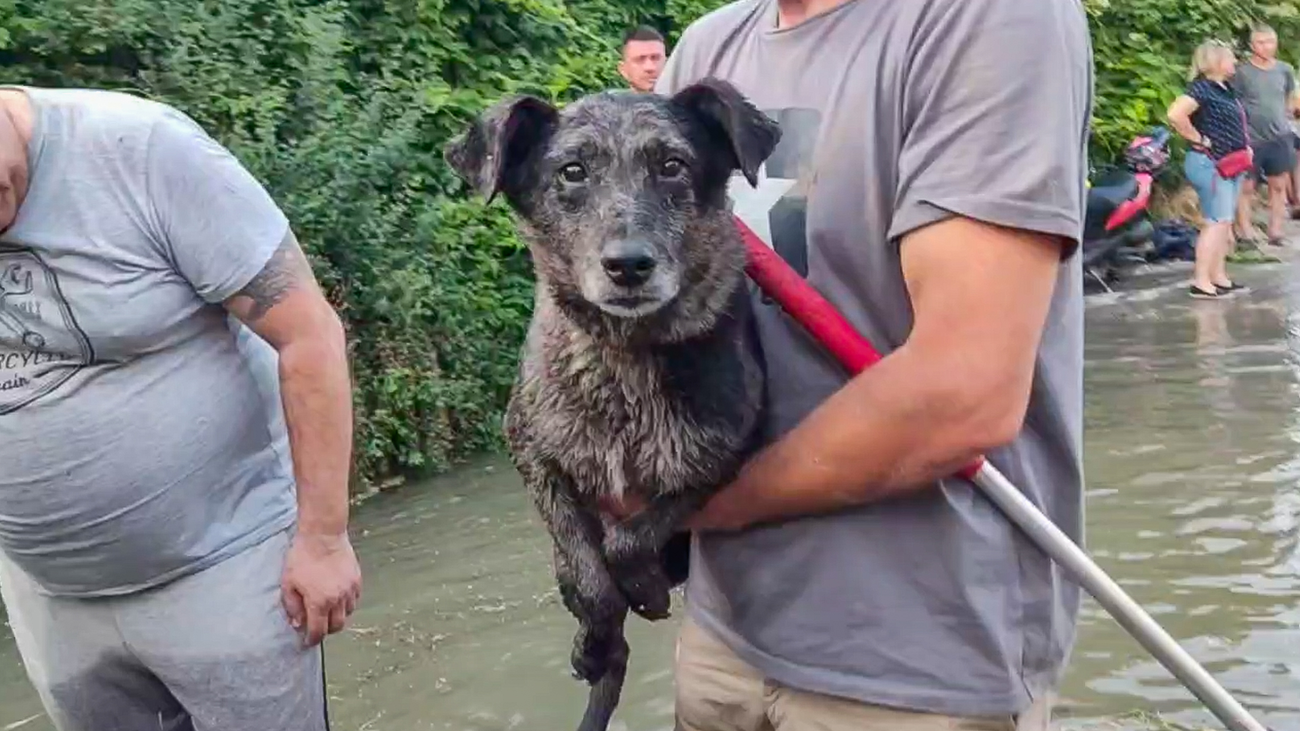
feeding, bedding, and treating animals in need
29 May 2023
IFAW continues to provide emergency relief and funds to help the Ukrainian people and their animals impacted by the ongoing war. These are some of our most recent and upcoming activities:
Providing beds and vet services for pets in Mykolaiv: During the winter period, IFAW supported Mykolaiv Red Cross in providing 374 families with insulated beds for 900 animals. In May and June, Red Cross in Mykolaiv will be providing veterinary care for pets from displaced and resident families, whose accommodation was damaged during the war.
Treating animals with war-related injuries: To date, support from IFAW has enabled Nova Ukraine to help nearly 12,000 animals. In addition to providing food for shelters and animals of families in need, IFAW funds are helping Nova Ukraine create mobile accommodations for animals at shelters and rescue centers. Nova Ukraine’s local partners treating rescued animals include Alden Vet Clinic, the Step Up rehabilitation center, and Animal Rescue Kharkiv.
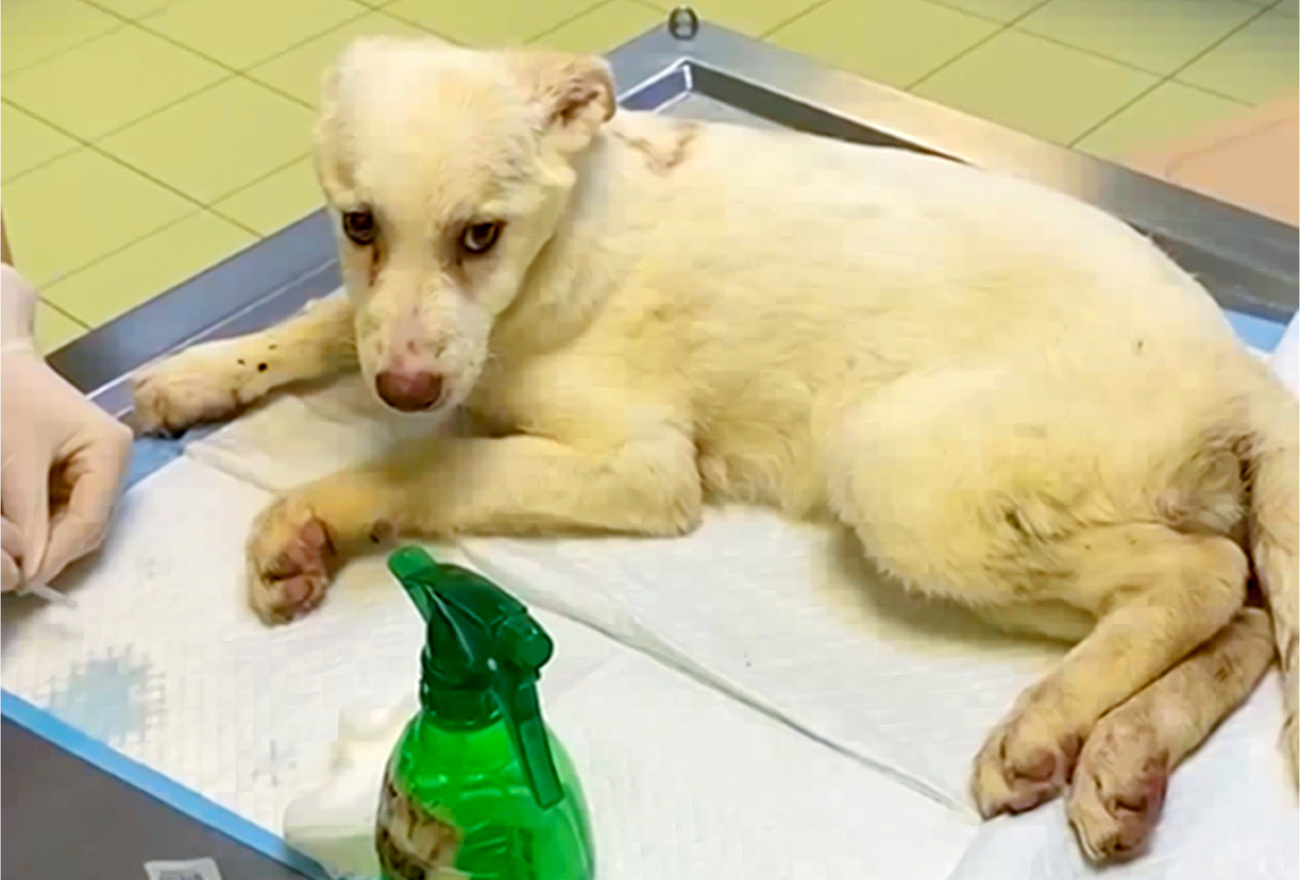
Supporting the local economy and delivery of free pet food: In March 2023, IFAW began purchasing directly from Kormotech—Ukraine’s largest pet food manufacturer—as part of a strategic partnership to maximize capacity to deliver food to shelters and families in need. IFAW purchased 3,508 kilograms of pet food (7,734 pounds) from Kormotech in March, which was delivered to 227 cats and 51 dogs in the Lviv region. In June, IFAW plans to purchase around 50,000 kilograms (110,000 pounds) of pet food and distribute it among shelters and families located in frontline regions like Mykolaiv and Kharkiv, and regions which host many displaced families and pets.
Evacuating wildlife and supporting rescue centers: IFAW supports zoos, sanctuaries and rescue centers with emergency grants and animal welfare advice for the evacuation and transportation of wildlife into safer areas, both inside and outside of Ukraine. To date, IFAW has rescued 14 wild animals from Ukraine: 11 big cats (two caracals, one leopard, and eight lions), one wolf, and two brown bears. We are currently working with Wild Animal Rescue and UAnimals in Kyiv to evacuate another 14 big cats from Ukraine and transport them to Poznań Zoo in Poland.
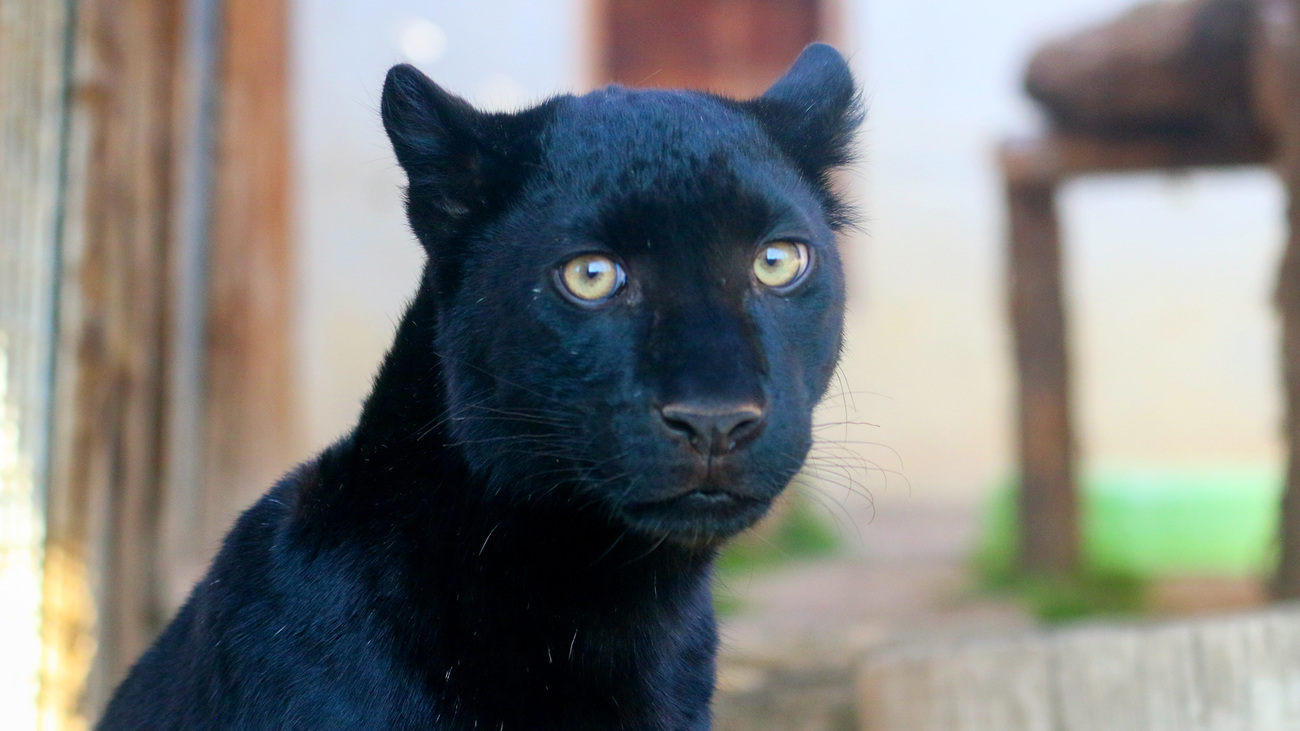
Led by wildlife rescue field officer Natalia Gozak, we recently assessed and signed grant agreements with several wildlife centers, which take care of big cats, bats, hamsters, birds, and captive wildlife rescued from illegal trade.
Veterinary services for owned and shelter animals: IFAW and USAVA work together to provide free vaccination, chipping, and sterilization for pets from displaced and resident families and for shelter pets in the cities of Kyiv, Lviv, Dnipro, Kharkiv, Odessa, and surrounding areas. USAVA has partnered with 18 veterinary clinics in those cities to provide veterinary care onsite. By the end of March, over 14,400 animals were vaccinated, 14,900 were chipped, and 2,100 were sterilized.
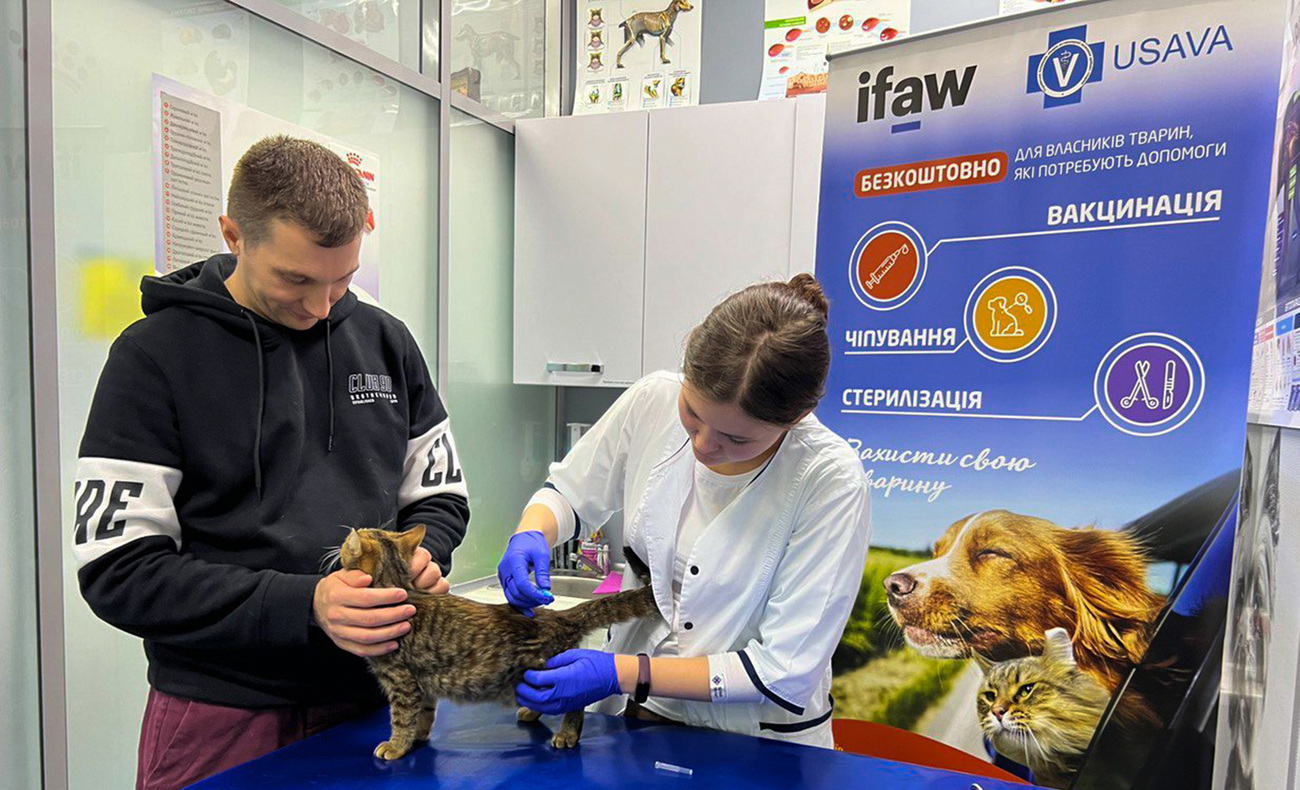
more than 500 bats rescued in northern Ukraine
6 April 2023
Earlier this year, IFAW’s partner bat rehabilitation center rescued 576 bats from an underground location near Kyiv in northern Ukraine and relocated them to Rivne Zoo.
We are supporting the rehabilitation center with funding to cover basic equipment, including rechargeable batteries to ensure electricity supply for the fridges where the bats hibernate, cameras to install inside the fridges to monitor the bats, veterinary care, and transportation crates.
Natalia Gozak, IFAW’s wildlife rescue field officer, received a call about a group of bats that needed to be rescued from a cellar which was being converted into a shelter for humans due to Russia’s full-scale invasion in Ukraine. On arrival, she discovered that the cellar was fully occupied by a colony of the rare and endangered Barbastella bat and several other bat species.
It took two people more than six hours to collect and crate all the bats, after which they were safely transferred to Rivne Zoo, with support and supervision of experts from a bat rehabilitation center based in Kharkiv. The next day, veterinarians carefully examined and weighed the animals, gave them water, and placed rings around their wings to help monitor them. Most of the bats were in good health, weighing eight grams or more, and could continue hibernating. Others were too thin and had to be fed for a few weeks, after which they resumed their winter hibernation. As the weather warms up, the bats will soon be released close to where they were hibernating.
The relocated animals included 573 Barbastelle bats (the biggest colony of this species every saved in Ukraine), one Daubenton's bat, one Natterer's bat, and one Serotine bat.
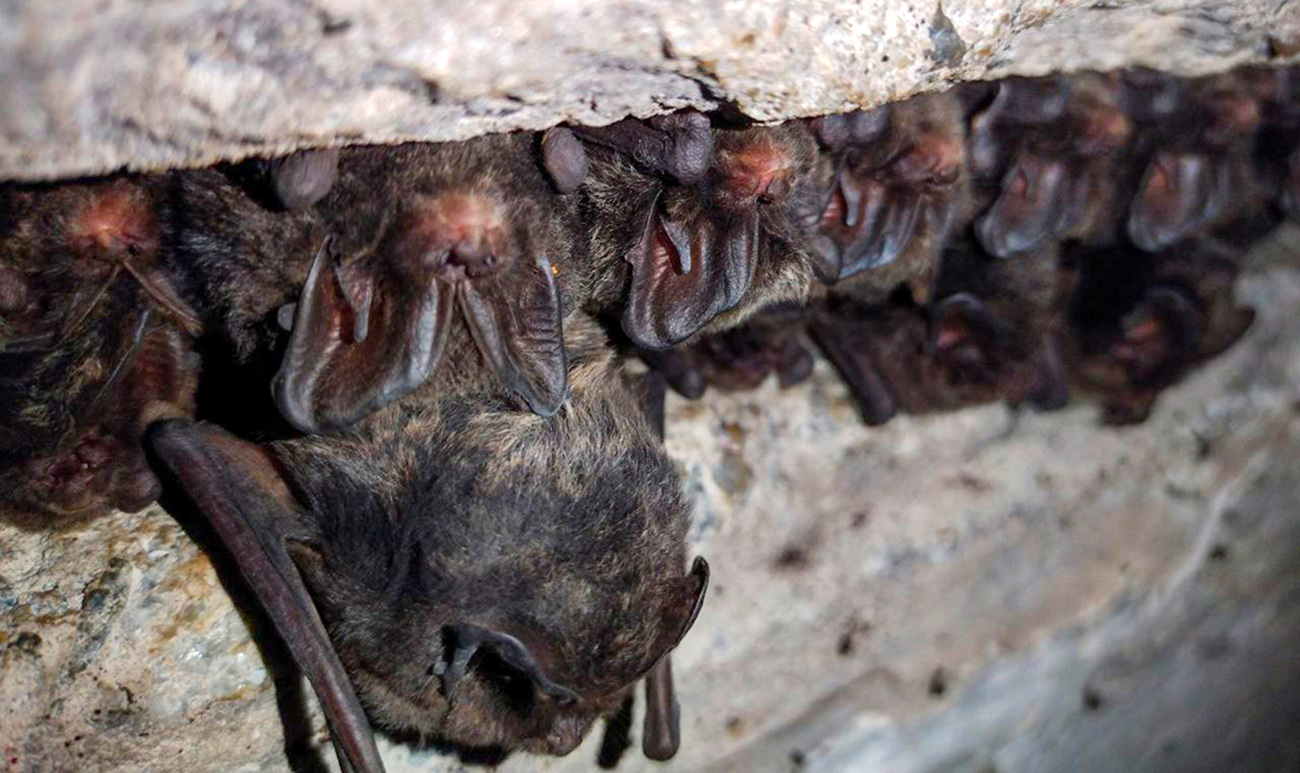
Ukraine 1 year on: more than 103,000 animals saved
22 February 2023
IFAW has been providing emergency relief and funds to Ukraine since the start of the war. We helped more than 103,000 animals in 2022 by providing local shelters and rescue centres with food, supplies, and veterinary services (including vaccinations, chipping and sterilisation).
Leading up to winter, we expanded our efforts by helping partners to purchase and distribute beds, mattresses, and blankets and to adapt and construct thermal/insulated sheltering. IFAW has also helped with the rescue, evacuation and temporary care of wildlife, such as bears, bats, lions, tigers, wolves and caracals.
IFAW continues to aid the Ukrainian people and their animals despite hardships on the ground. With the destruction of transportation, fuel deposits and energy infrastructure, as well as the impacts of winter, we must constantly adapt our emergency efforts to tackle the changing needs.
All of this would not be possible by the ongoing generous support from our donors. Thank you for being there for animals in their time of need. Your dedication truly makes a difference in Ukraine and all over the world.
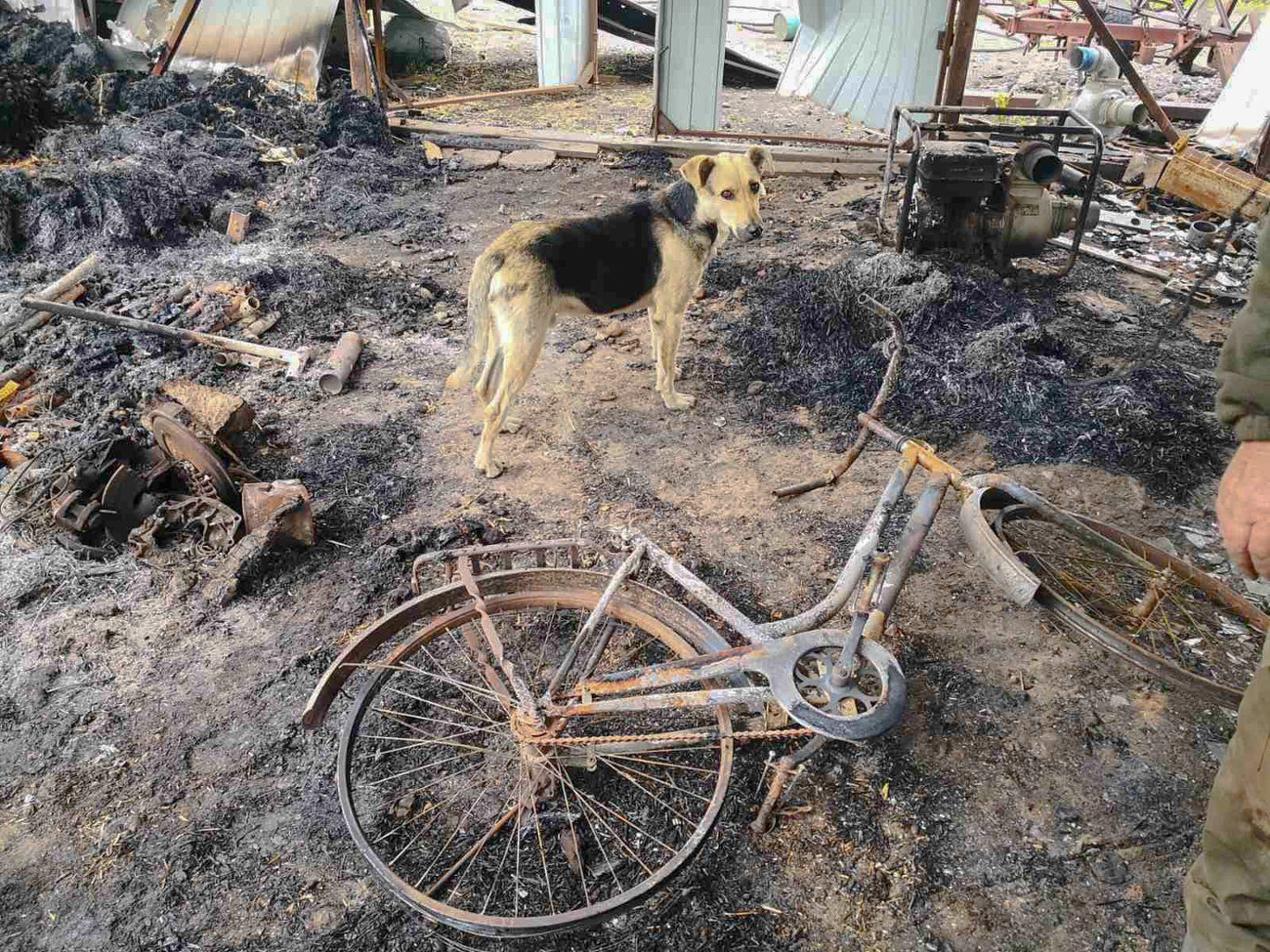
20 Ukrainian volunteers receive award for saving animals during the war
14 February 2023
The first-ever Ukrainian Animal Protection Award was presented to 20 volunteers who saved the lives of animals during the war in Ukraine. The ceremony, initiated by UAnimals and Humane State, took place in one of the bomb shelters in Kyiv on 2 February 2023.
"This award is our way of thanking the hundreds of thousands of Ukrainians who, amid shelling and under occupation, continue to save animals: dogs and cats, cows and sheep, tigers and lions,” says Oleksandr Todorchuk, a soldier of the Ukrainian Armed Forces, founder of UAnimals, and founder of the awards.
Anyone could nominate volunteers, including those working at civil society organisations, shelter staff, veterinarians, or animal activists. The final list of 20 recipients was determined by an expert jury, which included Céline Sissler-Bienvenu, programme director for IFAW’s disaster response work in Europe.
“So many people have stepped up to help Ukrainian people and animals in need during the war—it is truly heartwarming,” says Sissler-Bienvenu. “IFAW also supports volunteers, shelters, and other organisations in Ukraine and neighboring countries with emergency funds for food, shelter, supplies, and veterinary care. It is wonderful that there is national recognition for the brave and compassionate actions of these people.”
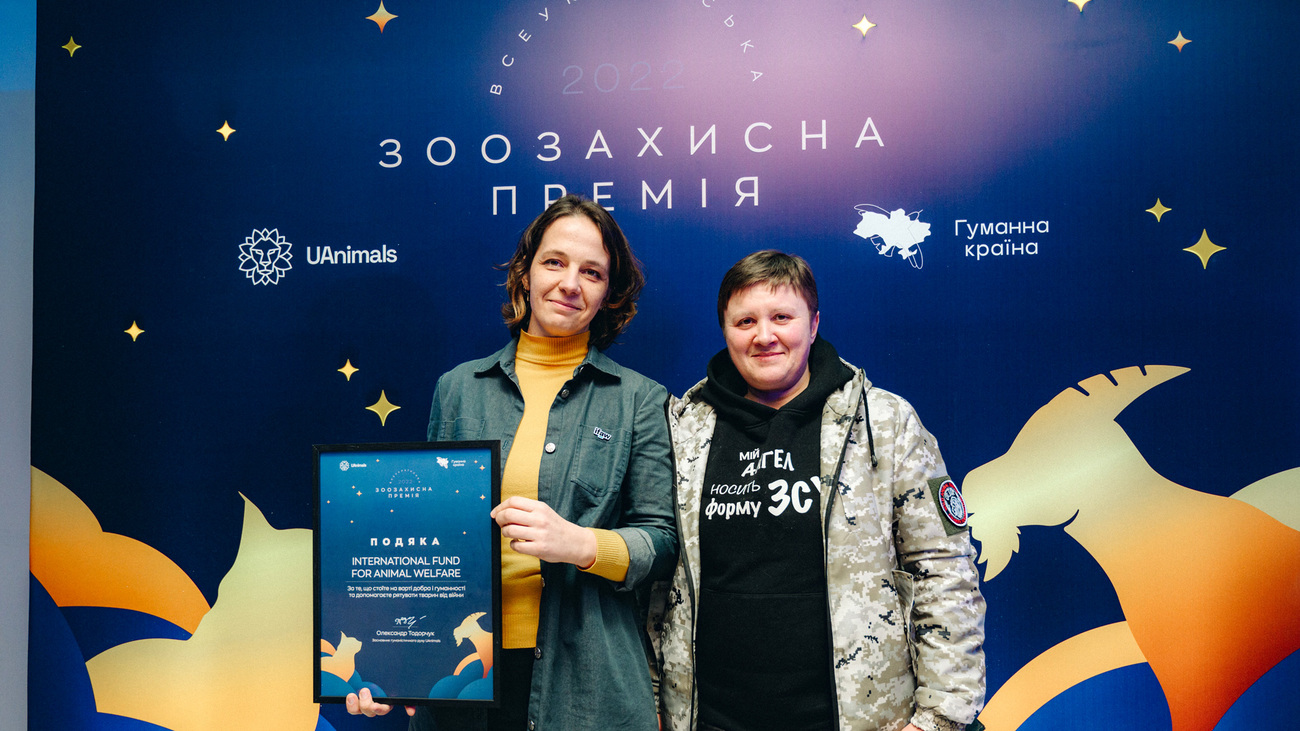
IFAW has been helping animals threatened by the intense conflict in Ukraine since February 2022. Thanks to overwhelming support from people around the world, IFAW’s work and that of our partners continues to make a difference for the animals and people impacted by the war in Ukraine and around the world.
To learn more about how many animals we have been able to help to date, how we distribute funds raised, and our next steps, please read this FAQ about our work.
delivery of feed keeps 150 horses alive in Ukraine’s Mykolaiv region
3 February 2023
Before the war, there were an estimated 100,000 horses living in Ukraine. But since the war began, many of those horses have been displaced, killed due to bombing and shelling, and died of hunger or injuries; the current number of horses in Ukraine is unknown. The threats they face are now exacerbated by the harsh winter conditions.
In response, IFAW has granted Ukrainian Equestrian Charity Foundation (UECF) US$50,000 to support the production and delivery of special feed and the distribution of hay to horse owners in the Mykolaiv region. In the past two months, the grant has enabled the delivery of 75 tonnes of hay on nine trucks, which, together with 40 tonnes of compound feed, has helped keep more than 150 equines in 15 stables alive.
“Because of constant shelling, mined fields, lack of fuel, and financial resources, the stables in the regions were not able to harvest hay and source the compound feed. Blackouts added a problem with electricity and water supply,” says Mykhaylo Parkhomchuk, founder and CEO of UECF.
“With support from IFAW, we have helped all stables that we could identify in the region, such as shelters, riding schools, stables specialising in breeding and training of horses, and small home stables with just a couple of ponies or horses. The feedback that we have received from the horse owners gives us confidence that this kind of systemic large-scale approach to aid equines is efficient and much needed. We are incredibly grateful to the IFAW for their continued and valued support of the UECF project for Mykolaiv.”
The UECF was established in Belgium on 28 February 2022, with the aim of helping the Ukrainian equestrian community during and after the war. Its efforts include distribution of horse feed and hay to stables, relocation of horses from dangerous regions to safer areas in Ukraine, opening evacuation shelter stables, and providing veterinary supplies and services to Ukrainian equines.
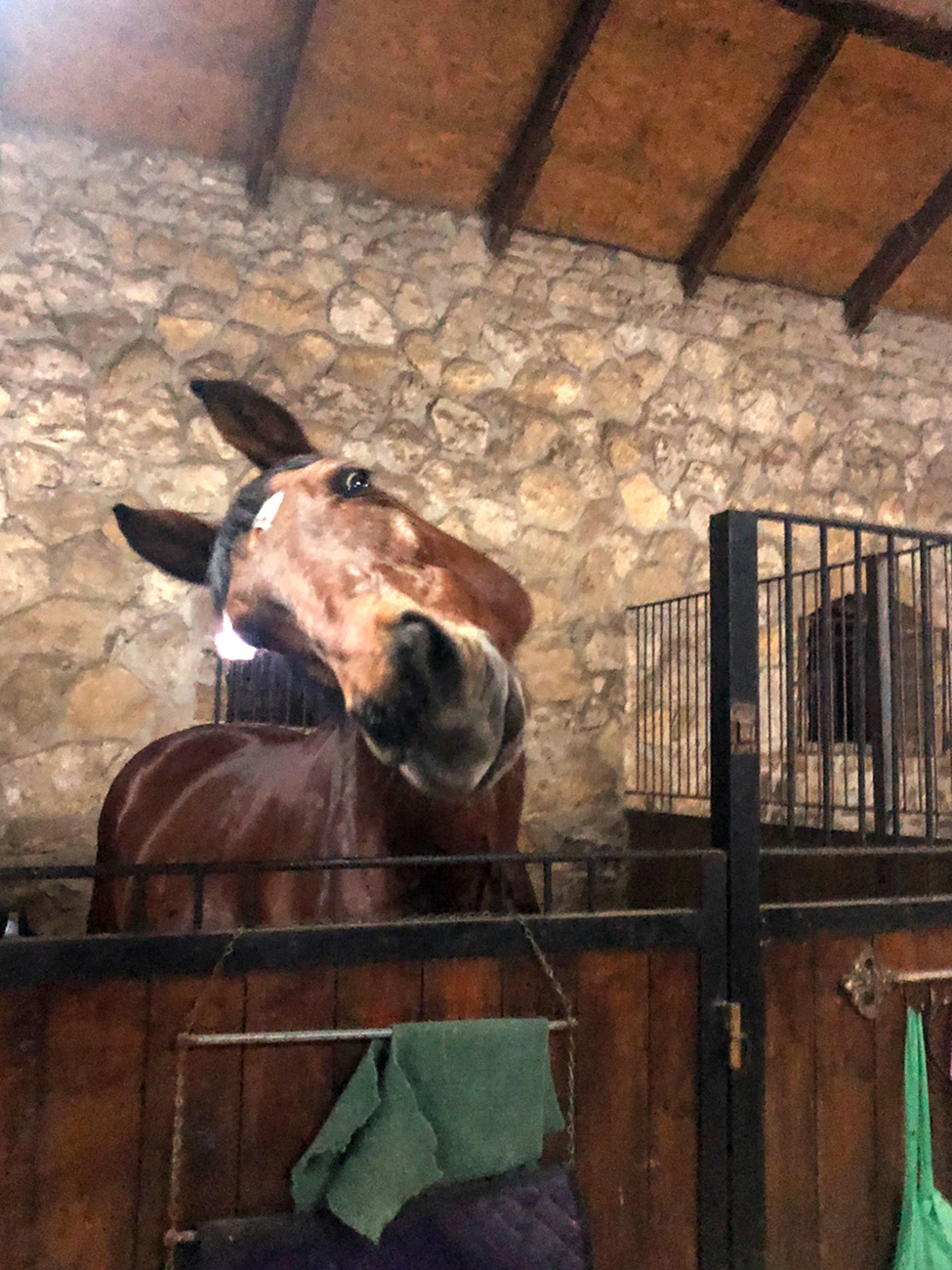
keeping animals warm this winter
21 December 2022
With the arrival of winter in Ukraine, we at IFAW are expanding our efforts by partnering up with Mykolaiv Red Cross and Nova Ukraine to provide mattresses, blankets and insulated houses for cats and dogs, as well as food for animals of families in need and free home visits by veterinary specialists. We’ll first focus on animals whose owners’ homes have been destroyed, those staying in shelters and those with injuries from the war.
We know that by helping animals, we are also helping the people who love them. We are proud to team up with local organizations in Ukraine to make a greater impact for the animals and people in need.
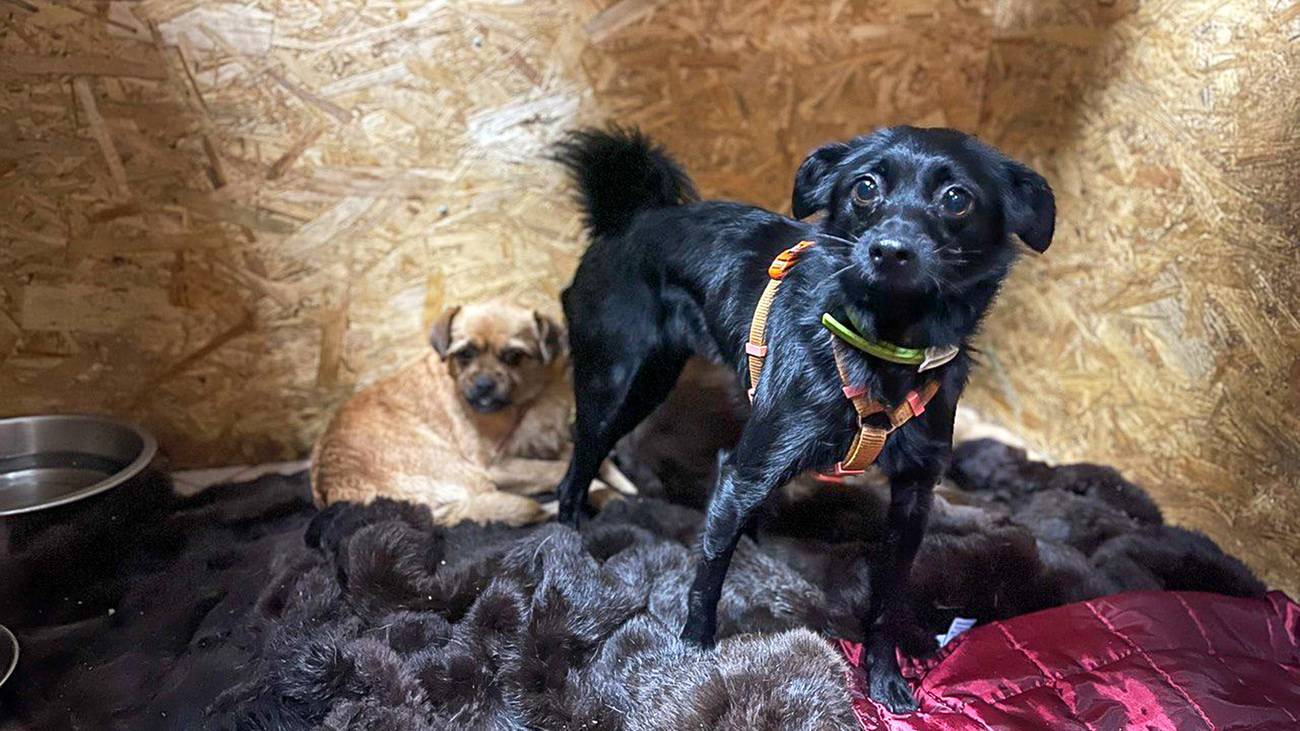
rescued cubs from Ukraine arrive safely at their forever home
27 October 2022
Four lion cubs and a black leopard cub survived recent drone attacks and sporadic bombings in Kyiv followed by the journey to Poland from their war-torn birthplace in Ukraine. The four lion cubs then completed the final leg of their journey, arriving at their forever home —The Wildcat Sanctuary (TWS) in the United States. The black leopard cub was transported from Poznań Zoo in Poland to a wildlife rescue center in France called Tonga Terre d’Accueil. IFAW was proud to fund the rescue, transport and care for these soon-to-be big cats.
According to their permits, all of the cubs were born at breeding facilities in Ukraine and surrendered to animal rescue organizations, Vet Crew in Odesa and Wild Animal Rescue in Kyiv, after local officials started to enforce laws on the exotic pet trade in Ukraine.
“An estimated 200 lions live in private homes and as the war rages on, they face increasingly grim outcomes,” says Meredith Whitney, Wildlife Rescue Program Manager at IFAW.
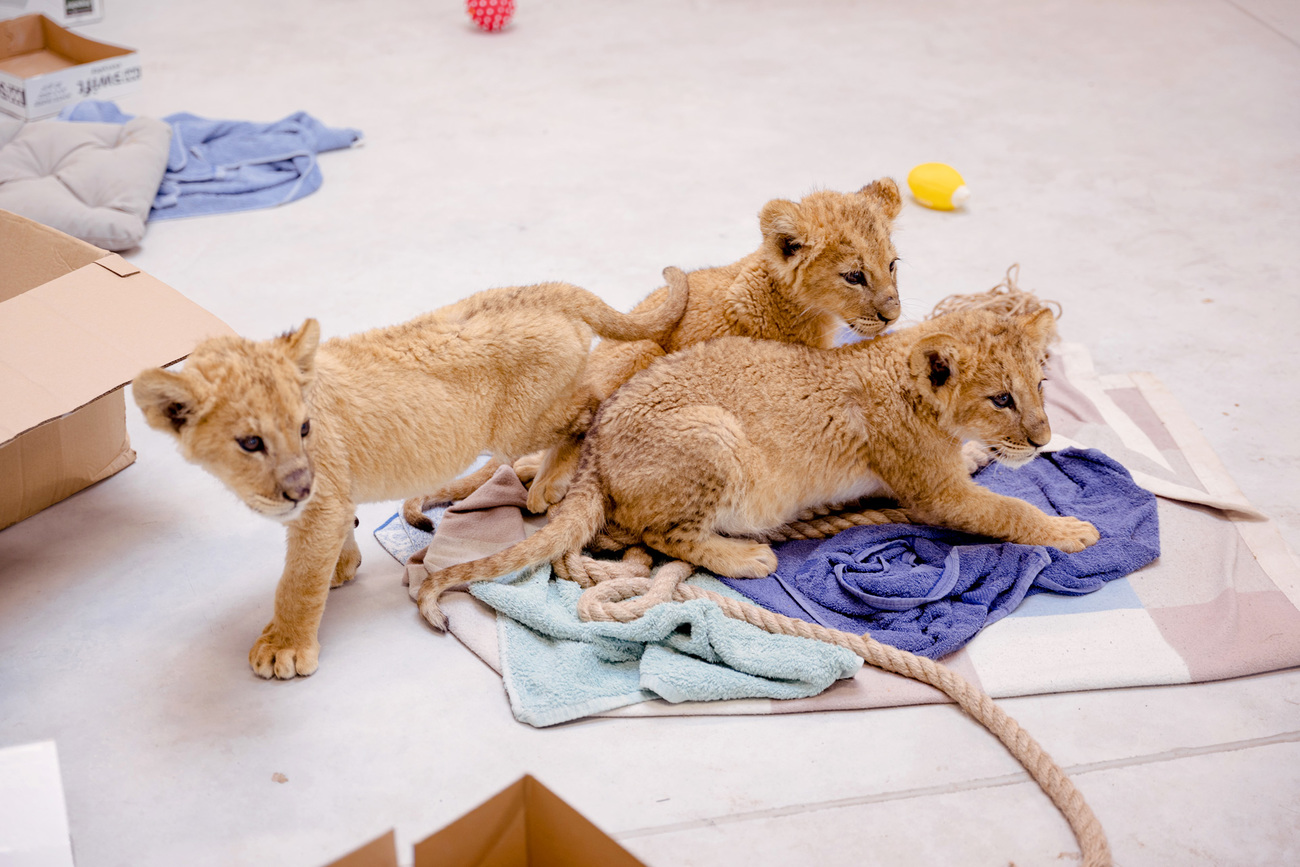
bat rescue and rehabilitation continue despite war
11 October 2022
When the war began in Ukraine, rescued bats quietly hibernated at the Ukrainian Independent Ecology Institute’s Bat Rehabilitation Center in Kharkiv. Despite shelling and heavy artillery, the dedicated biologists and veterinarians at the Institute managed to rehabilitate and release more than 3,000 bats belonging to nine species between February and April, with support from IFAW.
The Institute has rescued injured and orphaned bats in Ukraine for over 20 years, and the war hasn’t stopped them.
Due to the presence of Russian troops and shelling near the Institute’s usual release site this year, staff decided to release the bats near a river at sunset—that would allow the bats to use the river to help them navigate to nearby forests. All 3,287 bats were released safely back to the wild.
The staff at the Institute fully understood the risks involved in remaining in Kharkiv during the war. They decided to continue to rescue and care for bats as long as utilities were running, and stores stayed open.
Bats play an essential role in pest control, plant pollination and seed dispersal. They eat more than 70% of their weight in insects each night, making them a natural pesticide for agricultural crops. They are also an important prey species for other animals such as owls and snakes. With the alarming decline in biological diversity, bats need to be protected so they can help other flora and fauna survive and flourish.
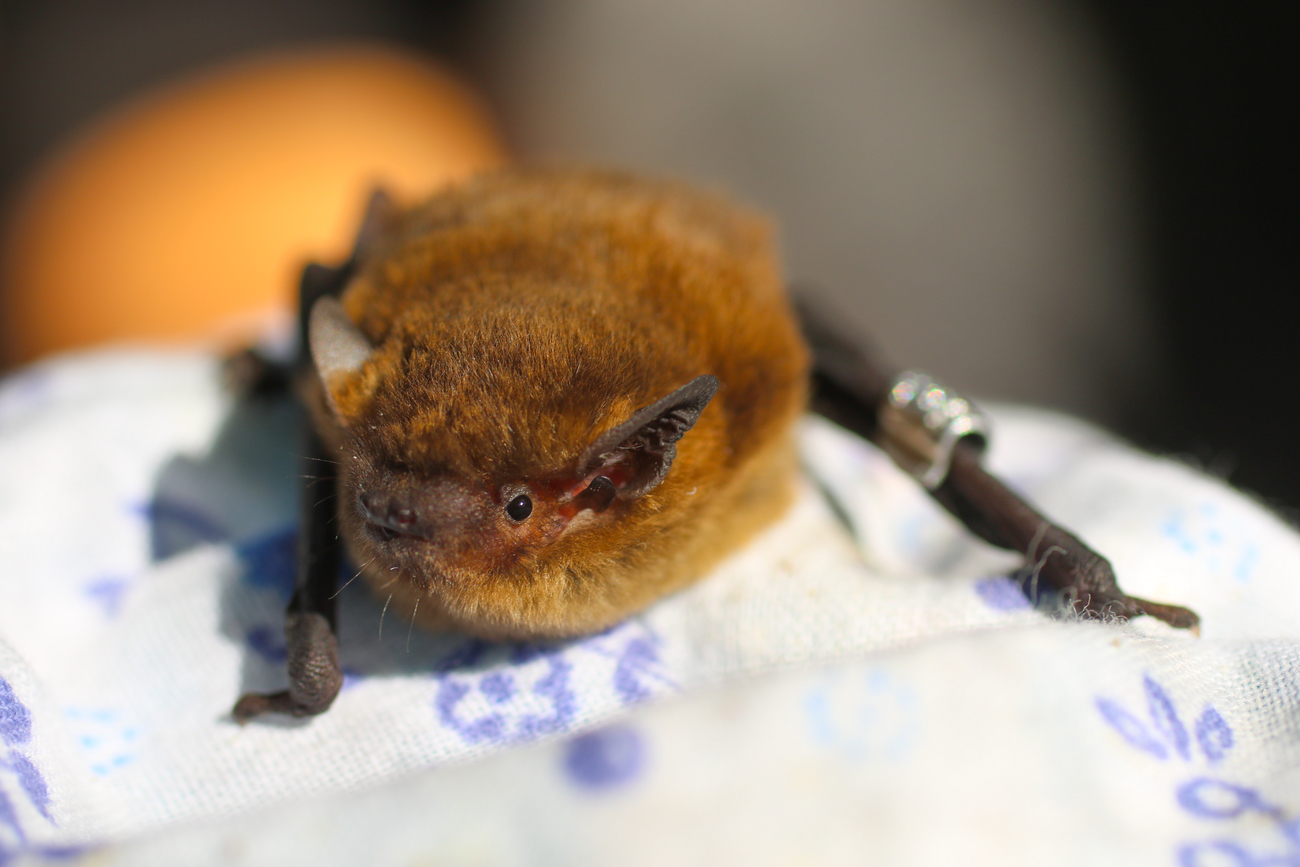
veterinary surgeon who treated pets of refugees during Ukraine war joins ifaw
3 October 2022
Veronika Herasymenko, a veterinary surgeon who treated thousands of pets of refugees from Ukraine arriving in Poland this year, is now joining IFAW as our new Rescue Operations Coordinator in Ukraine.
With experience in primary emergency and surgical care of domestic animals, from 2014 until the start of the war in Ukraine, Veronika co-owned and co-managed a veterinary clinic called Darsolina in Kharkiv. When the city of Kharkiv and her mother’s house were shelled, she was forced to move her family to Lviv, where they continue to reside.
Read her full story here.
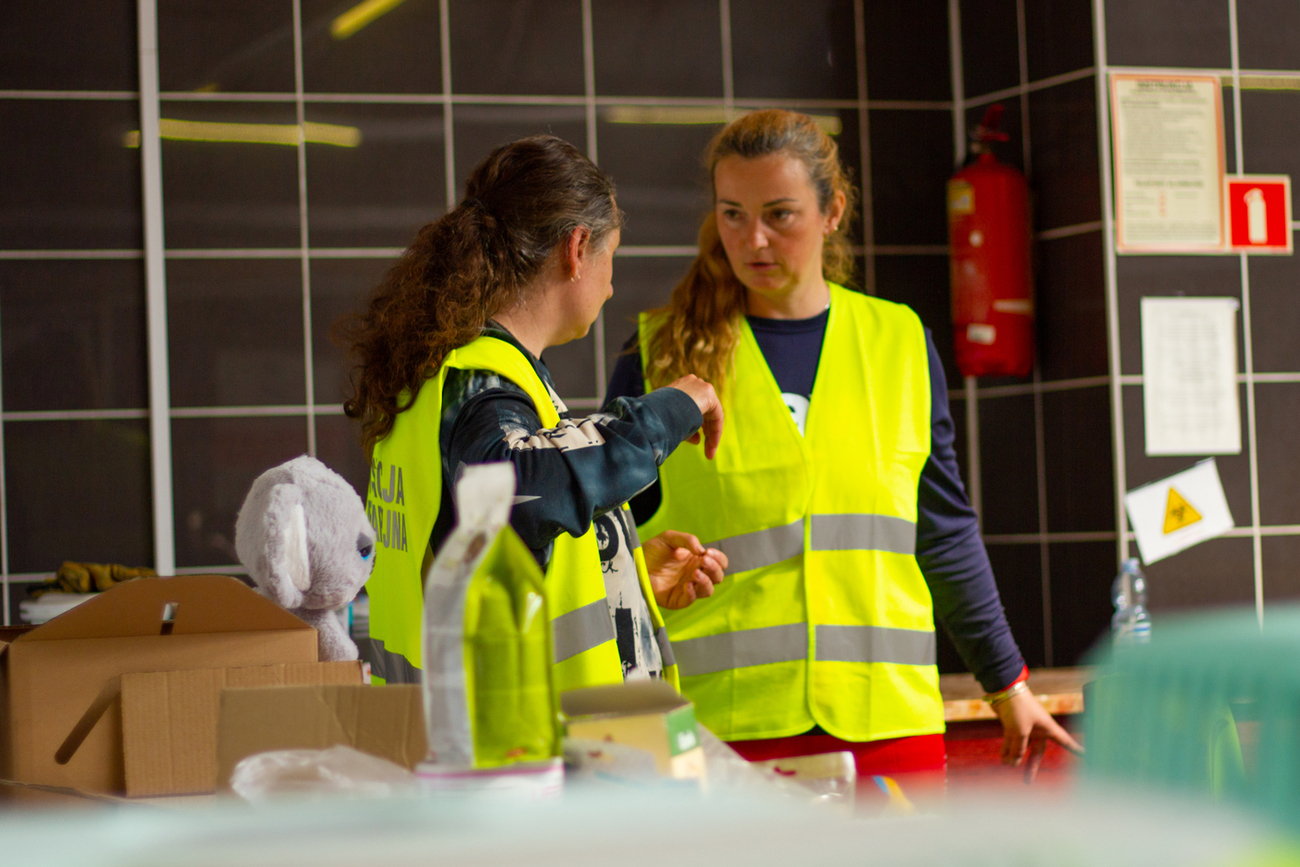
free vaccinations for 20,000 pets
26 September 2022
As part of its multi-year commitment to animals in Ukraine, IFAW started a project in partnership with the Ukrainian Small Animals Veterinary Association to support veterinary services for pet owners in Ukraine. The project aims to vaccinate and chip 20,000 and sterilize 4,000 pets from displaced and resident families at veterinary posts in four key cities—Kyiv, Lviv, Kharkiv and Odessa. These services, made possible by generous donations from BNP Paribas’ Rescue & Recover Fund and Anicom Holdings Inc., will be provided for free to meet the needs of many pet owners who do not have sufficient funds.

"The war did not stop us from doing our work,” says Dr. Vladlen Ushakov, President of USAVA. "Animals continue to get sick and need medical treatment, regardless of external circumstances. We are therefore very grateful for IFAW’s support in helping us to continue to take care of animals in need."
Since the start of the projects, the number of participating veterinary clinics has grown from four to eleven. As Forkun Valeriya Igorivna, founder of TRUST, a 24-hour veterinary clinic, explains: “Some people have had to leave their homes, and some lost their property altogether. Almost every family has relatives who are currently at the front. Despite the circumstances, people do not leave their animals but evacuate together with them, in makeshift carriers. It's inspiring and we want to support such owners. This is our opportunity to help people keep their animals healthy.”
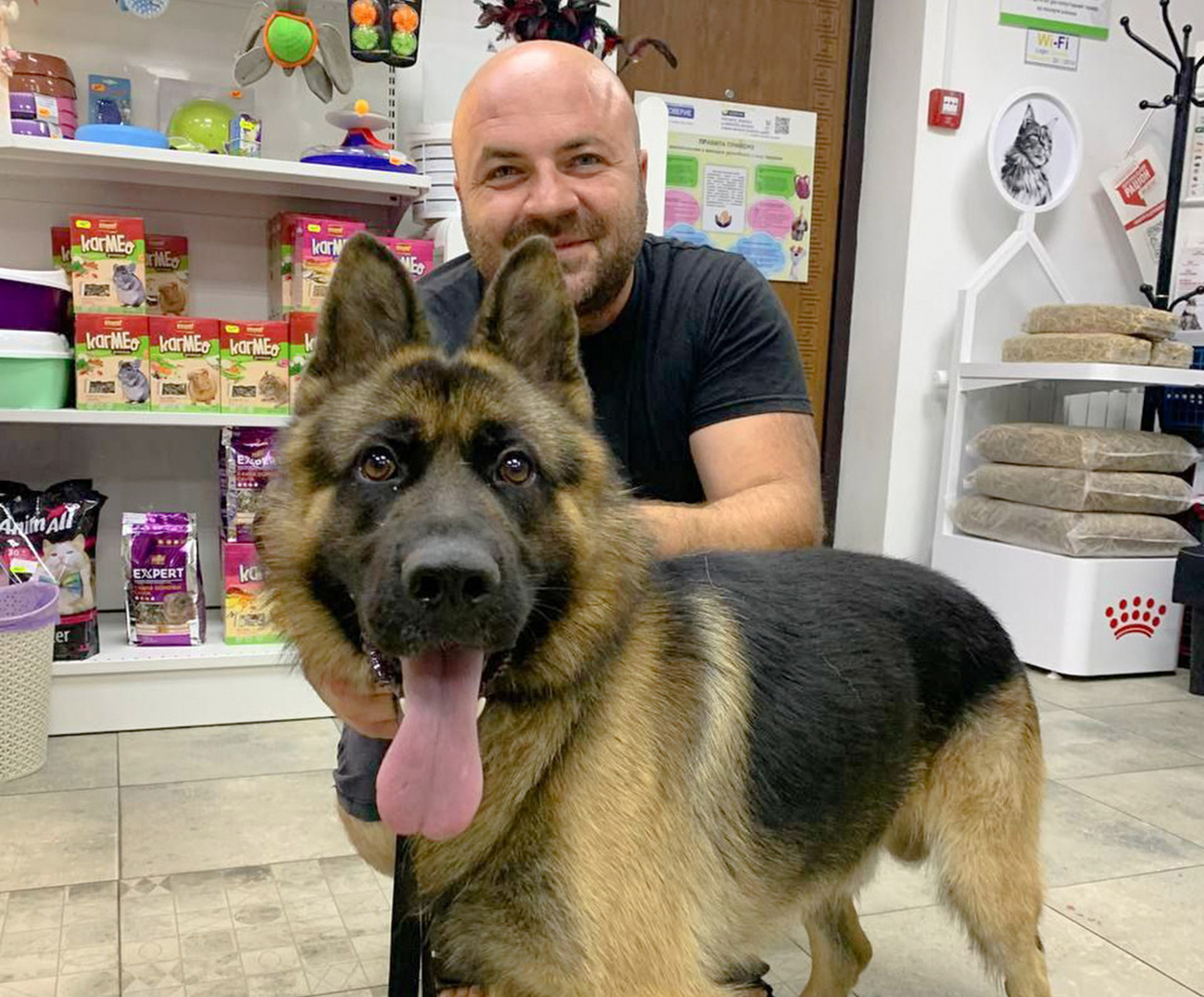
The program also helps prevent the already-large stray animal populations in Ukraine from growing further. These populations are vulnerable to outbreaks of diseases that can spread to wildlife and humans. The only way to curtail population growth is by ensuring animals are vaccinated, chipped and sterilized.
In Ukraine, it is not common practice to get pets sterilized or to go to a veterinary clinic for vaccinations and chipping. So USAVA started a public campaign to inform people of the program via city administrations, news outlets, social media and advertising on the streets and at key public transportation points. They also launched a website where people can find more information on why it is important to protect their pets.
The campaign has proved successful thus far: In the first two months, we have been able to help 3,794 animals with 1,414 vaccinations, 1,739 chips and 641 sterilizations.
ifaw has helped more than 75,000 animals in Ukraine over the past six months
9 September 2022
As IFAW passes the six-month mark of giving aid to animals and people in Ukraine, we are actively expanding our efforts. To date, we have issued 63 grants worth a total of over US$1M to local organizations. That money has helped more than 75,000 companion and wild animals. Here are a few examples of what local grantees have done with funds from IFAW:
Feed 6,000 pets. U-Hearts Foundation was one of IFAW’s first grant recipients in Ukraine. With the funds, U-Hearts purchased 20 tons of pet food, which they’ve been distributing across the country.
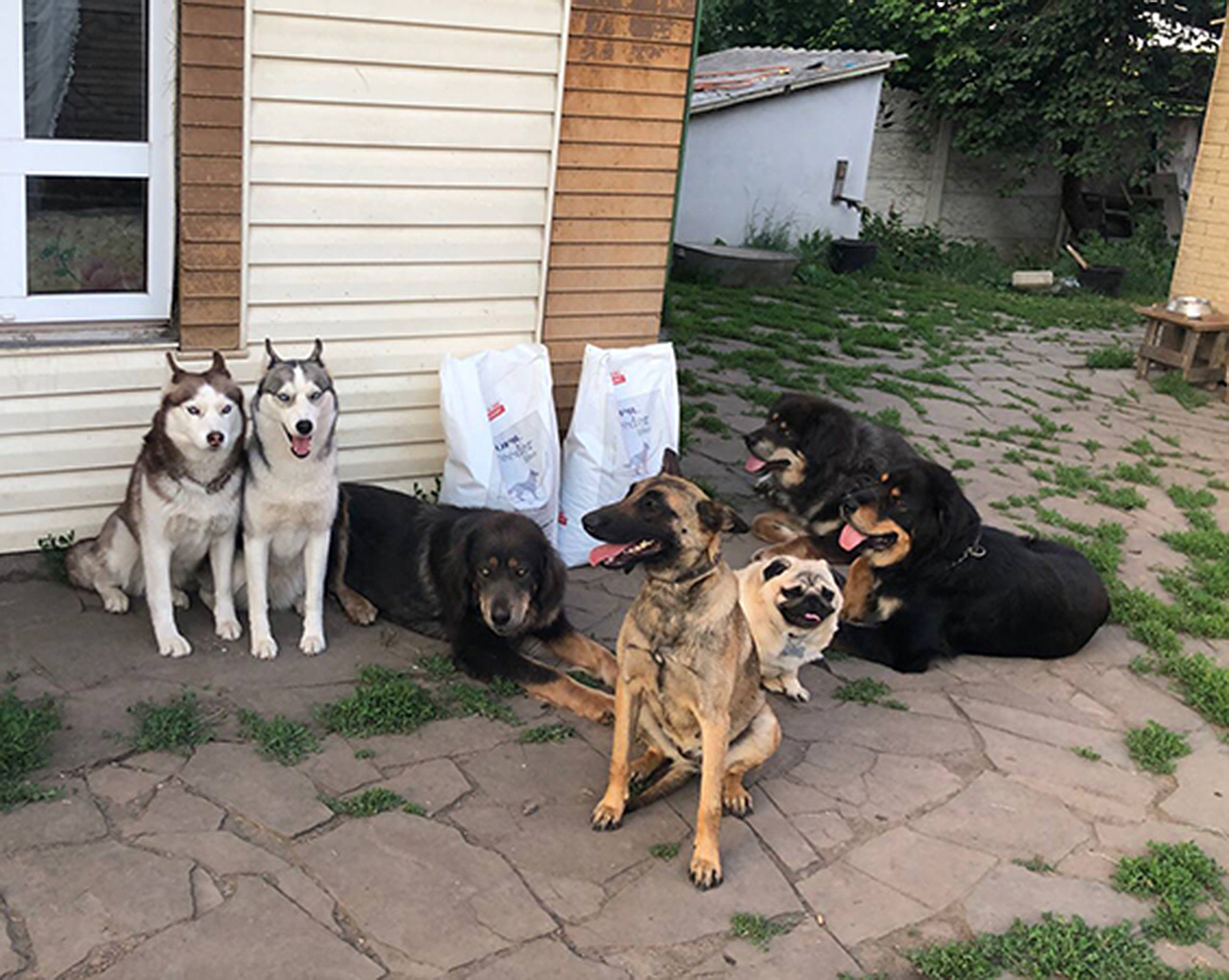
Transport 3,873 animals and 9,057 people. Enjoying Life is a humanitarian organisation that works with suppliers to ensure fuel will be available for evacuation routes amid fuel shortages in Ukraine. When some transporters were unable to evacuate pets along with their families, Enjoying Life organized transport that could include animals and provided people in need with carriers and animal food. IFAW gave the organization funding to cover the cost of fuel and supplies.
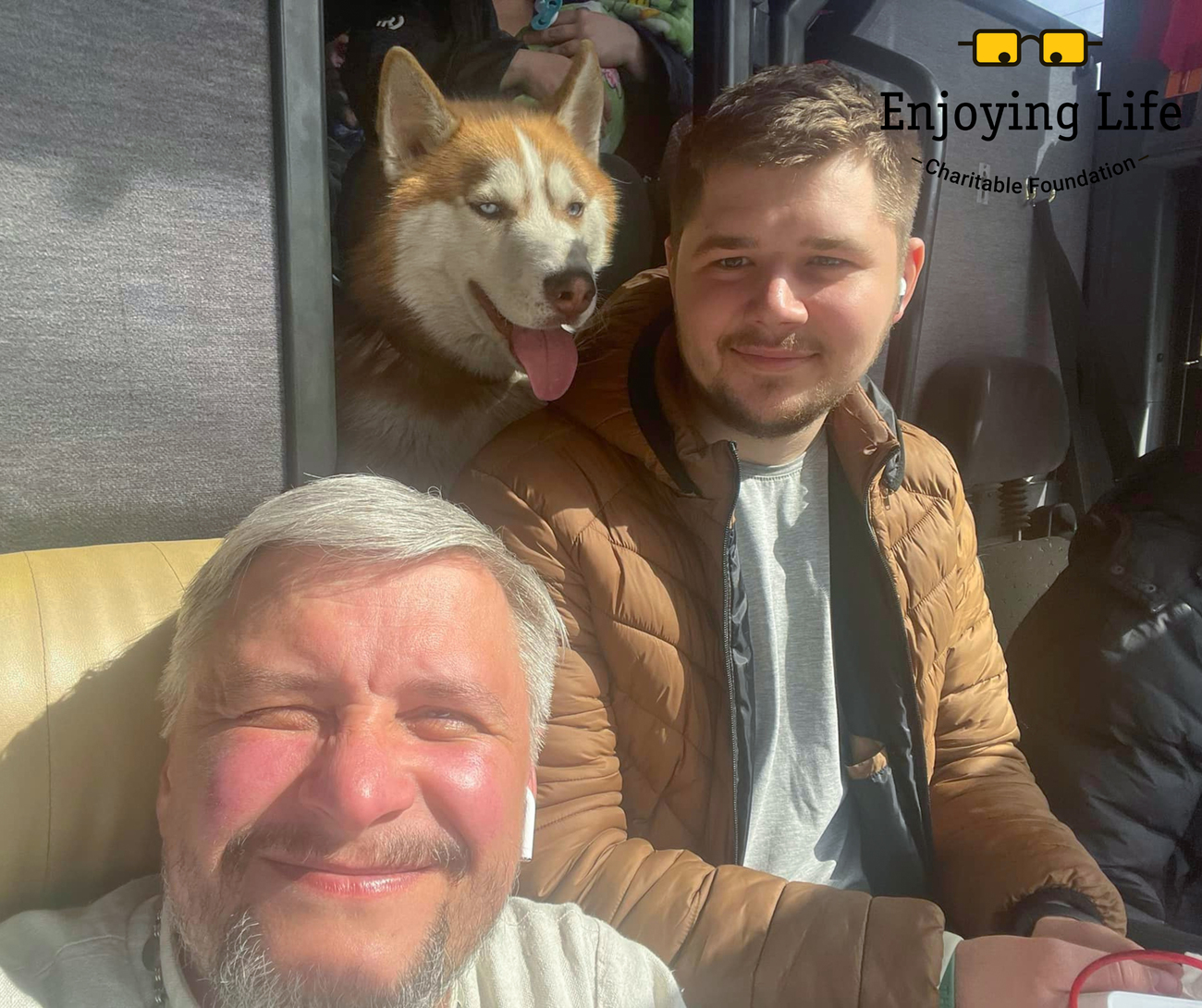
Buy animal carriers and pet food. Save the Dogs has been helping animals impacted by the Ukraine war in various ways. Earlier in the year, the organization had staff posted at the Isaccea border crossing handing out pet food, leashes, and collars to refugees arriving from Ukraine—many of whom carried their cats and dogs in their arms or tucked into their jackets. Funding from IFAW helped the organization buy animal carriers, along with 223 tons food, which they have distributed to refugees struggling to feed their pets.
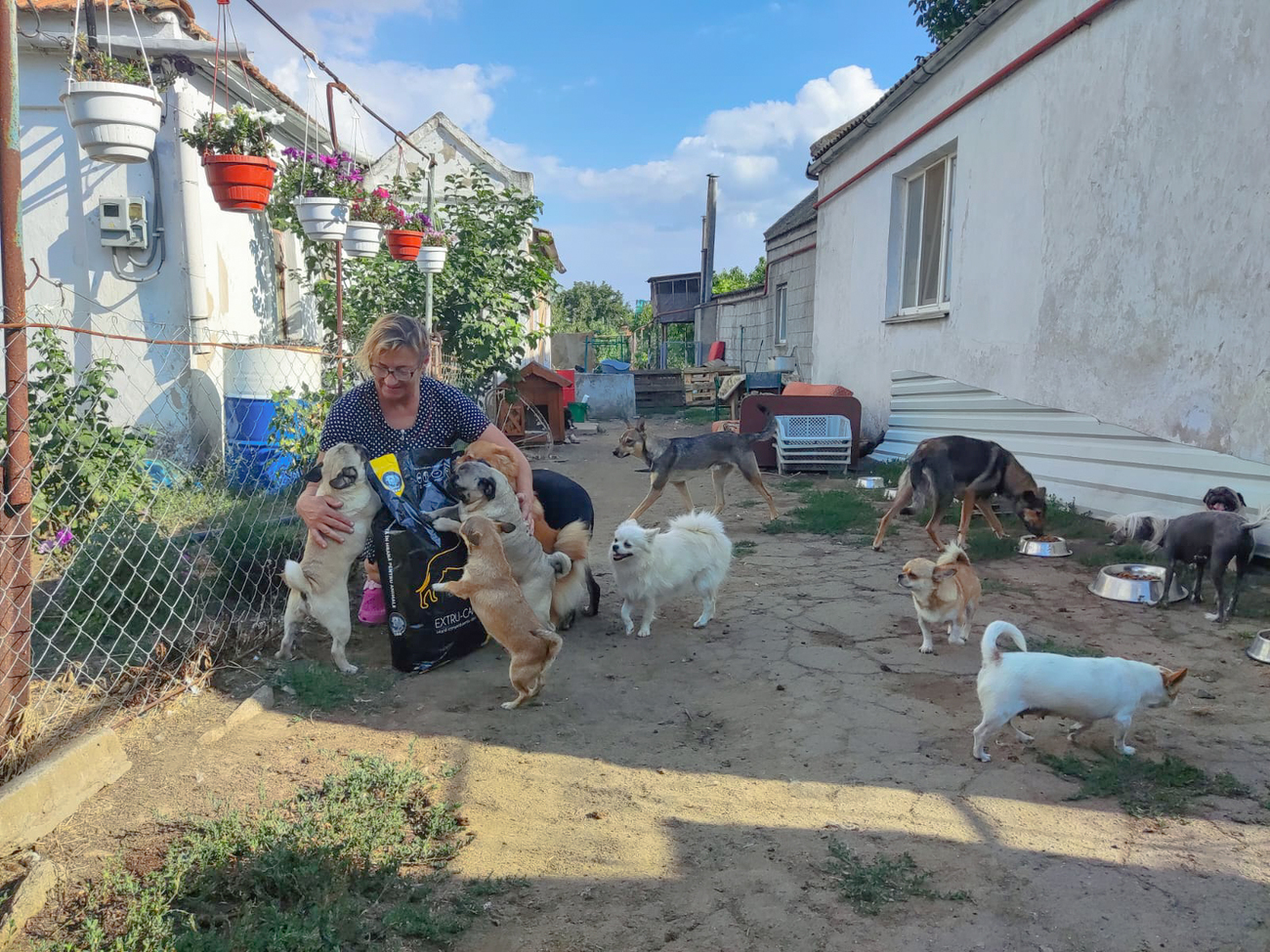
Care for ill and senior dogs. Shelter Sotnitskoe cares for many chronically ill and senior dogs that were abandoned in Ukraine. With the help of an IFAW grant, the shelter was able to hire refugee workers who had lost their homes and means of survival during the war. The funding also supported the purchase of animal food, supplies and veterinary care.
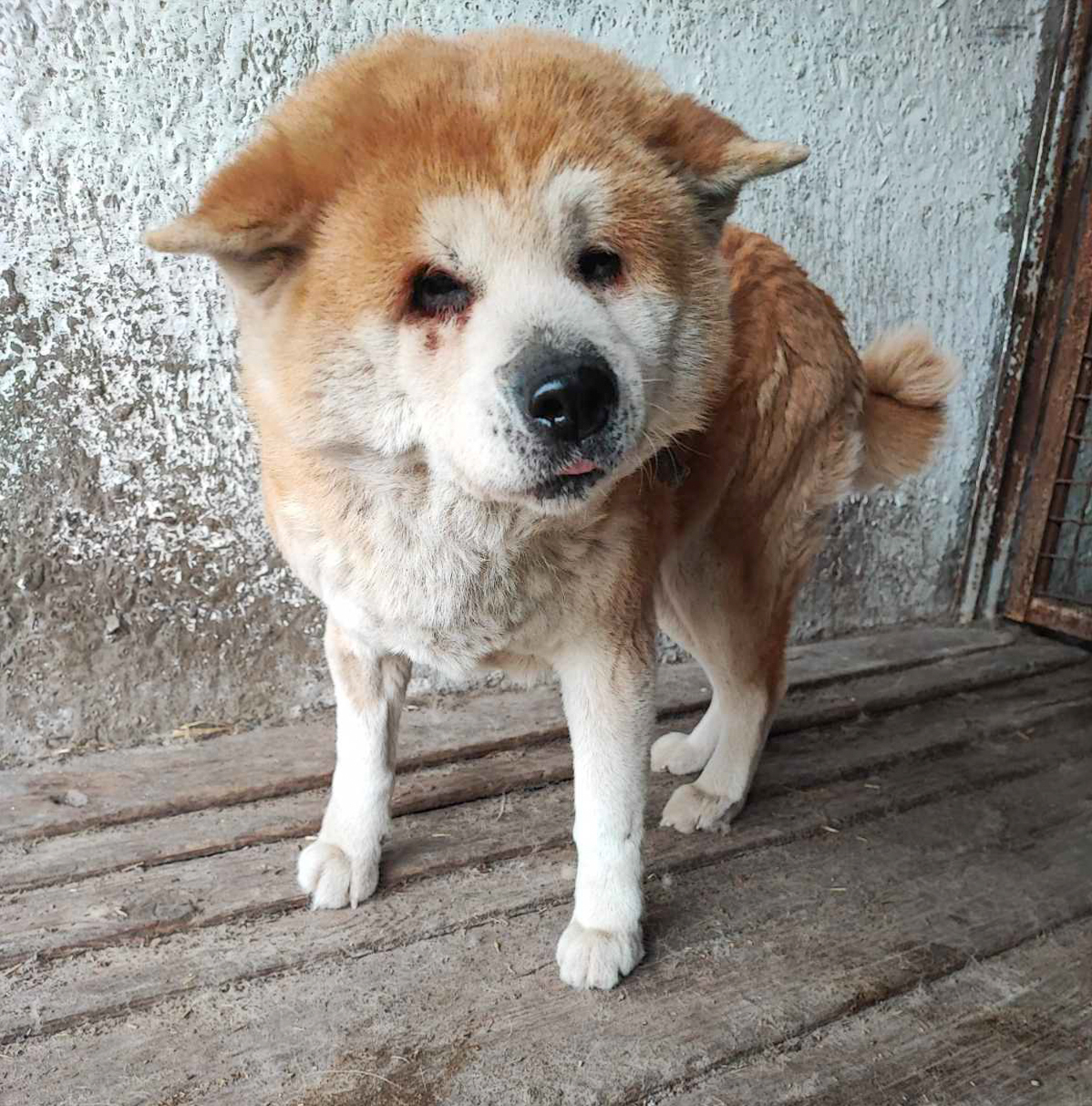
'We’re helping people through animals. That’s what we’re doing'
31 August 2022
IFAW has provided $940,776.74 in grant funding since we first deployed to Ukraine. One of our grant recipients, U-Hearts Foundation, used their grant to purchase 20 tons of pet food they’ve been distributing across Ukraine. To date, the grant has been used to help more than 6,000 animals.
One of those animals was a young dog named Dobby.
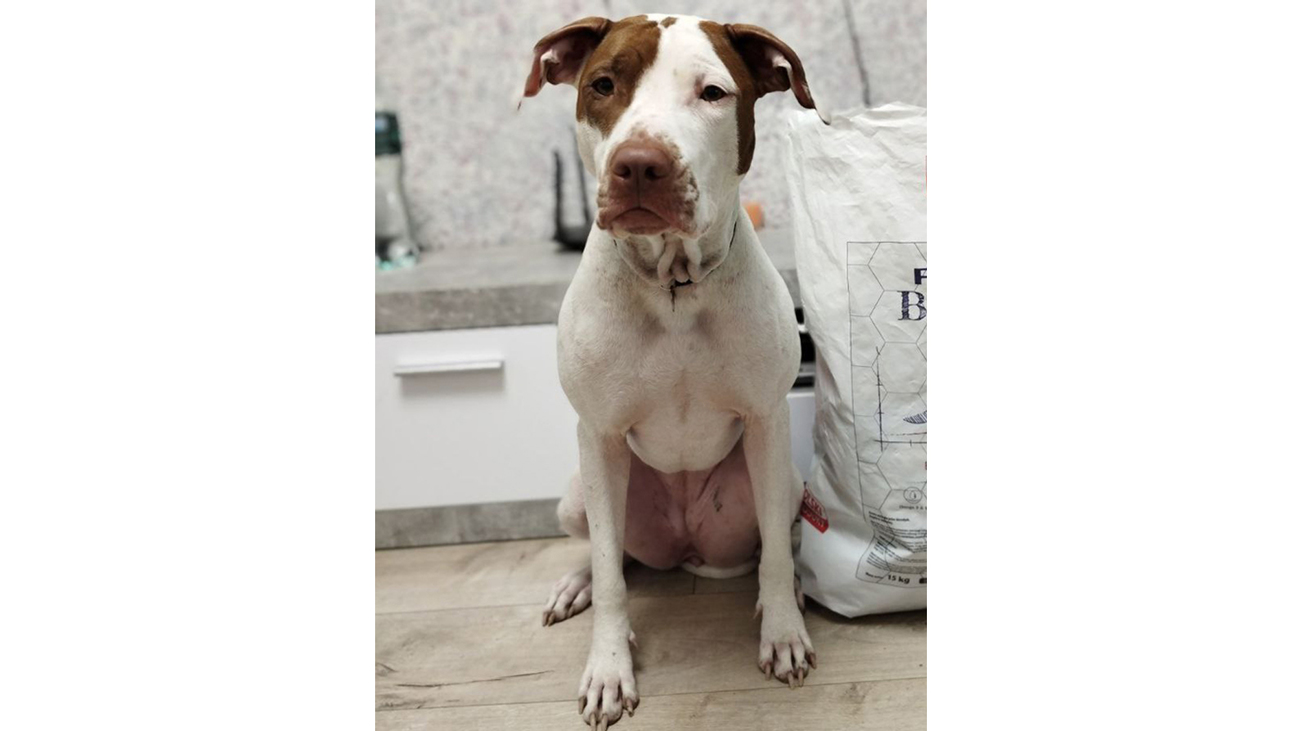
When the shelling started in Chernihiv, where Dobby lived with her family, she was terrified. Along with the loud noise and chaos of the shelling, the conflict separated her family. One of Dobby’s owners left to defend Ukraine as part of their armed forces; the kids were sent to a relative's house in a safer village in Ukraine. Dobby was left with her other owner, who stayed behind to care for her. The conflict took a heavy toll on Dobby—living in constant fear had made her behavior unpredictable and even harmed her health.
When her family contacted U-Hearts Foundation for help with Dobby, the staff there encountered barrier after barrier trying to get her the support she needed: endless shelling, power outages, internet outages. Communication was sometimes impossible, but U-Hearts Foundation persisted. Thanks to their dedication, Dobby's health improved over time, although the effects of the trauma she’s suffered haven’t gone away entirely.
Dobby’s owner was so grateful to U-Hearts Foundation that she’s even paying it forward by helping other pet owners. She takes Dobby with her as she distributes pet food and other goods to families in Chernihiv—adding two new faces to U-Hearts Foundation’s volunteer force!
IFAW’s “blue tent” at the Ukraine-Poland border
8 July 2022
Veterinarian Andrew Kushnir recently returned from IFAW’s “blue tent” at the Ukraine-Poland border where he volunteered for several weeks. Andrew is of Ukrainian heritage—his father’s family fled Ukraine during World War II. When the devastating war began this past February, he thought of his father and all the people of Ukraine. And as a vet, he thought of the animals.
Teaming up with IFAW’s responders, Andrew provided much-needed vet care to cats, dogs and other animals crossing into Poland with their owners. As Andrew explains, “We’re helping people through animals. That’s what we’re doing.”
See more of Andrew’s story below.
Helping people through animals: Veterinarian Andrew Kushnir at the Ukraine-Poland border
Our "blue tent" closes, but the work continues
31 May 2022
Our time at the so-called “blue tent” came to an end on Sunday 15 May. For two months, we’ve had the honor of helping thousands of animals, and their people, who crossed the border from Ukraine into Poland. Over the past few weeks, we’ve seen a steady decline in the number of people and animals crossing the border, and we already see some people returning to Ukraine.
IFAW continues to send food and supplies to relief workers and other organisations going into Ukraine, and to grant emergency funds to support animals in need. Our two IFAW-supported Ukrainian veterinarians also continue to assist refugees and their pets entering Poland via the Przemyśl train station. Moreover, we have outlined a multi-year project plan focused on our continued support of current and ongoing emergency needs, as well as recovery and rebuilding efforts.
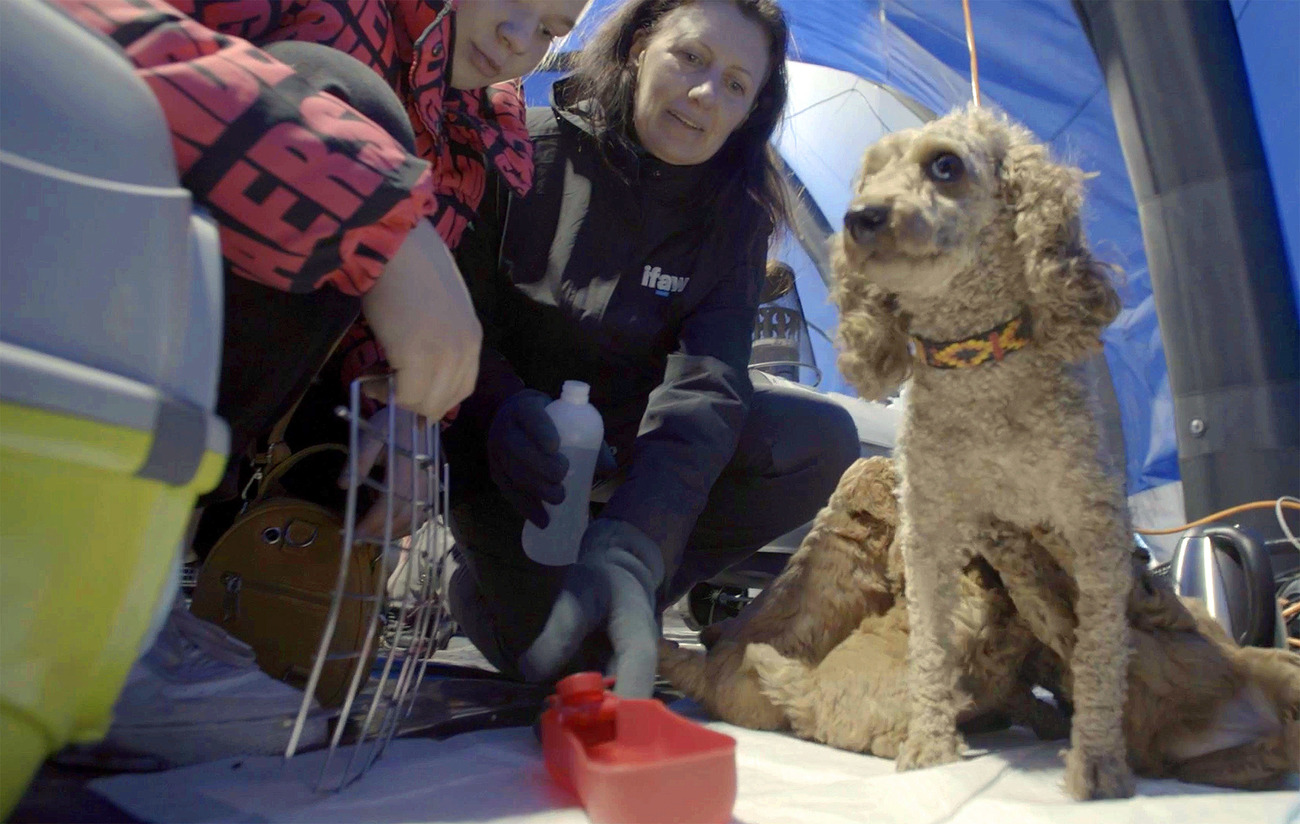
ifaw on CNN International's "First Move with Julia Chatterley"
10 May 2022
IFAW’s Shannon Walajtys recently appeared on CNN International’s “First Move with Julia Chatterley” to discuss IFAW’s work helping refugees and animals impacted by the war in Ukraine.
A testimonial from Viktoria
27 April 2022
At IFAW's "blue tent" we recently met a refugee named Viktoria who was touched by the care she received from our team. After fleeing from the Kharkiv region with her daughter Sofia and their three dogs, she arrived at the IFAW tent after a day of traveling. To our surprise, one of her dogs, two-year-old Jessie, was pregnant with her first litter of puppies—and just 10 days away from giving birth. After Jessie was examined and found in good condition, we provided the family with carriers to comfortably transport Jessie, along with new leashes, harnesses and water for the journey ahead.
A Ukrainian refugee and her dogs find care and support at the IFAW tent
Helping refugees and pets at the "blue tent"
26 April 2022
For nearly a month, IFAW has managed the only animal service tent at the border crossing in Medyka, Poland. The tent, nicknamed the “blue tent,” is bright blue and located a few meters from where refugees, fleeing the war in Ukraine, enter Poland.
Our responders, veterinarians and volunteers at the tent continue to work nonstop to help refugees and their pets. In 8 to 12-hour shifts, they provide 24/7 access to pet food, triage veterinary care and animal supplies. The work is serious and at times hard, but the atmosphere in the tent and along the footpath is also positive, as everyone is working together to help.
A tour of the "blue tent" at the border crossing in Medyka, Poland
As Diane Treadwell, IFAW responder for over 10 years, says: “We’ve had varying weather conditions, but often it is cold, windy and/or rainy. As a result, we see animals come in wet and cold, so we dry them and warm them up, get them some wet pet food and water, and new carriers for the next part of their journey. It’s really great to be able to take care of these animals and to help the people of Ukraine. We just continue each day and do the best we can!”
Our teams report seeing hundreds of refugees per day and have helped an estimated 1,400 animals at the blue tent since late March. Many people tell us how grateful they are to be received with such empathy and compassion, and that we alleviate some of the worry about their furry friends. And we have met so many of them: cats, dogs, rats, hamsters and more.
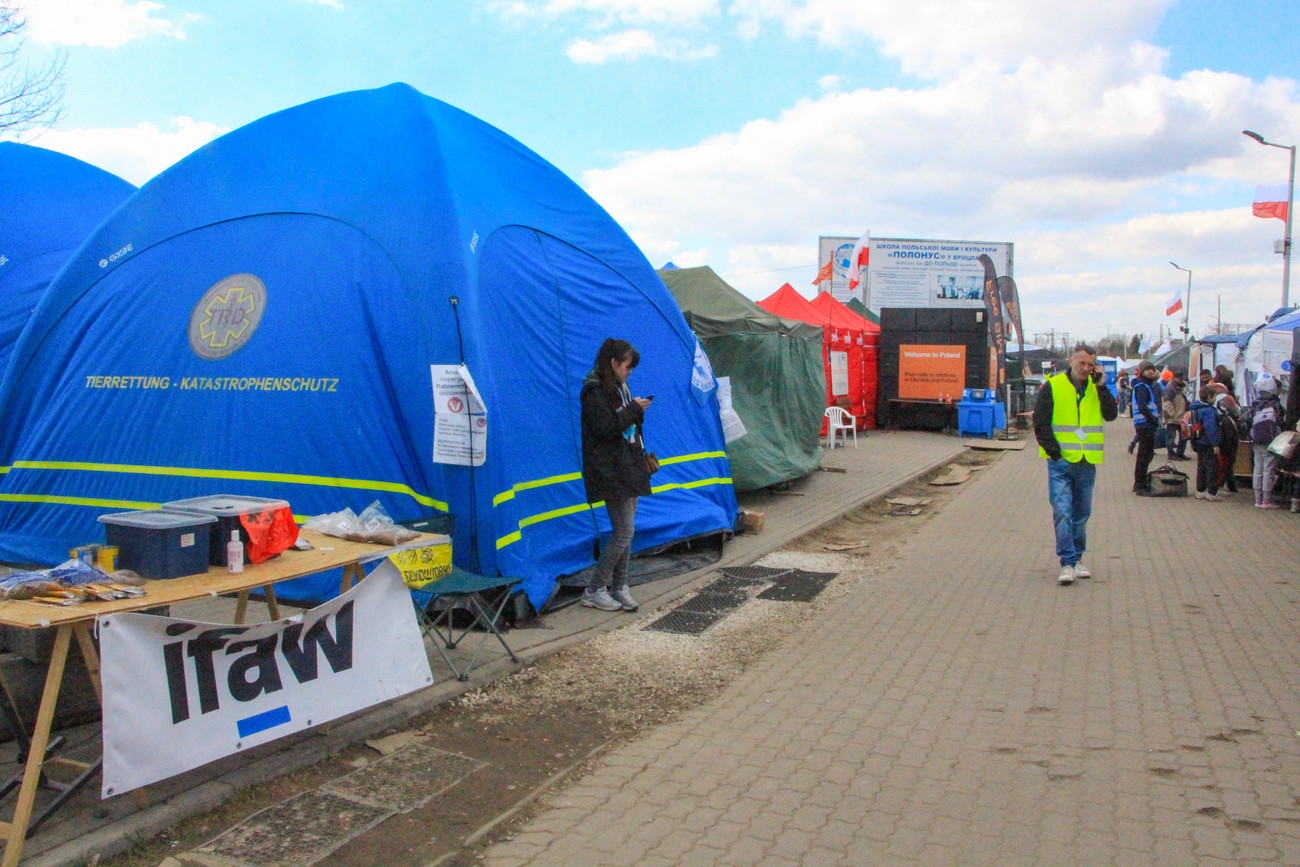
Over the past few weeks, the number of refugees and animals crossing the Medyka border had decreased, but in recent days we are again seeing a steady increase. Authorities have also added back a third train from Lviv to Przemyśl to accommodate the increase they are also seeing. Therefore, we have extended our management period of the tent, to ensure that we can keep helping those in need.
---
Supporting a bat rehabilitation center
13 April 2022
IFAW has provided an emergency grant to the Ukrainian Independent Ecology Institute to support food, veterinary and staff costs. For over 20 years, the institute’s bat rehabilitation center has surveyed and protected bats in Ukraine. Despite the ongoing war, brave rescuers continue to rescue, rehabilitate and release bats. Many of their bats were in hibernation when the war started and, amazingly, undisturbed by shelling and heavy artillery. The team said nearly all the bats hibernated perfectly and woke up ready to be released.
Due to conflict near the center, the team released the bats next to the nearest river at sunset, where the bats could use the river to locate nearby forests.
We are cheering on all the released bats and wish them a happy and wild life!
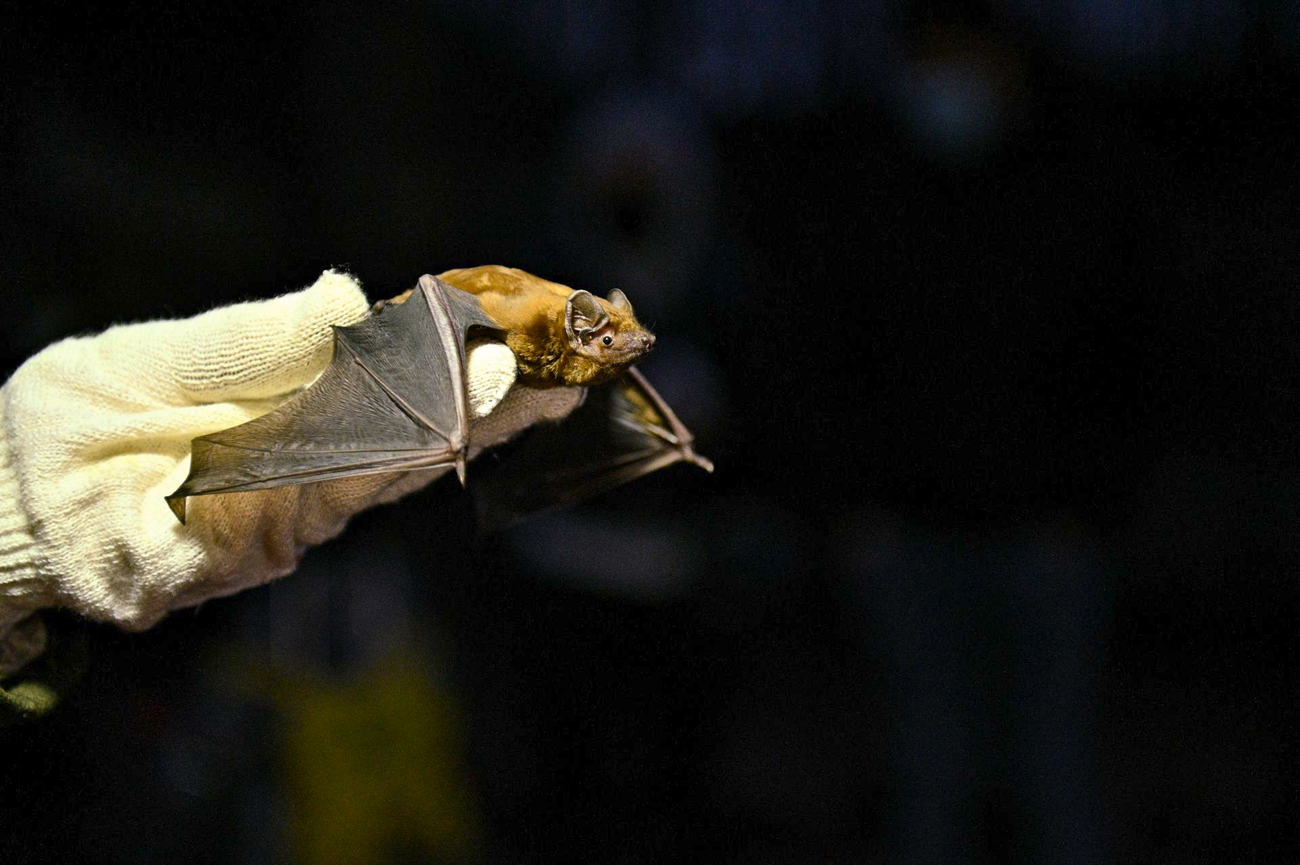
IFAW has also issued grants to the following wildlife facilities.
- Informal Petting Zoo Kherson—IFAW issued a grant to help caretakers purchase food and veterinary supplies for the 300 animals at the facilities. Both domestic and wild species are in care here.
- Animal Park Kyiv—We issued a grant to help cover costs of caretakers and to purchase food and veterinary supplies for the 250 animals in their care.
- XII MONTHS PARK—We provided an emergency grant to cover costs for animal food, veterinary supplies and staff costs.
- Feldman Eco-Park—IFAW provided an emergency grant to animal food, veterinary supplies and staff costs. We are aware of the ongoing situation on the ground and understand that given the facility’s proximity to the Russian border, this is an extremely dangerous situation. The park is working with Ukrainian zoos to move their animals and recent reports indicate some animals have been moved to other facilities.
---
Alina's story
6 April 2022
Our teams recently met a refugee named Alina, and were deeply moved by her determination to survive and save her mother and three cats. Read about Alina’s incredible story here.
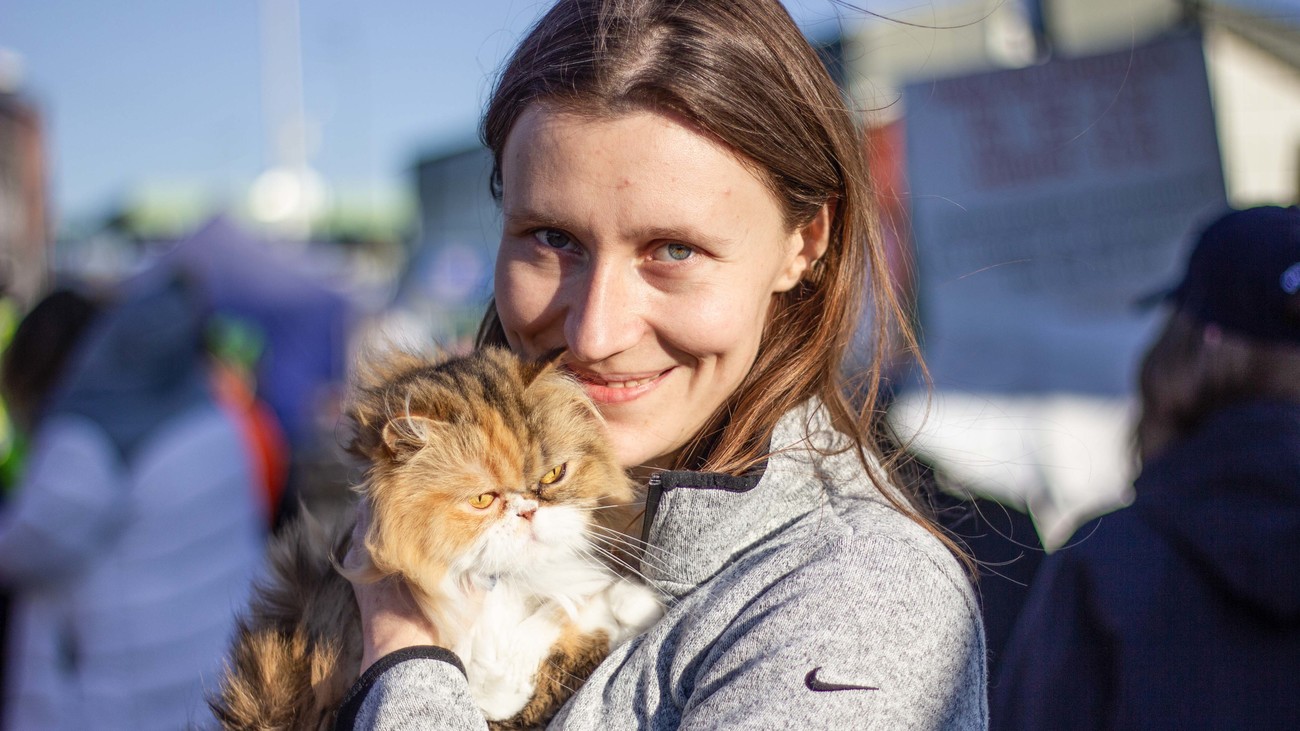
Managing an animal service station at the border
1 April 2022
There is an overwhelming need for pet supplies and basic veterinary care at the main border crossing near Medyka, where an estimated 80 % of refugees and their pets cross into Poland. Our teams have assumed management of the only animal service station there—a large blue tent—helping the hundreds of animals arriving. Two German NGOs, Deutscher Tierschutzbund (DTSchB) and Bundesverband Gemeinschaft Deutscher Tierrettungsdienste (GTD), initially set up the animal service station at the beginning of the war. Now, trained IFAW responders, veterinarians and local volunteers rotate in 12-hour shifts to provide 24/7 access to pet food, triage veterinary care and supplies for refugees with their pets.
Animals that arrive for care are traumatized from the war and stressed from long days of travel to the border crossing. The most common health issues documented by our veterinarians at the station are malnutrition, dehydration, hypothermia and stiff joints from being carried in cardboard boxes, coats and plastic bags.
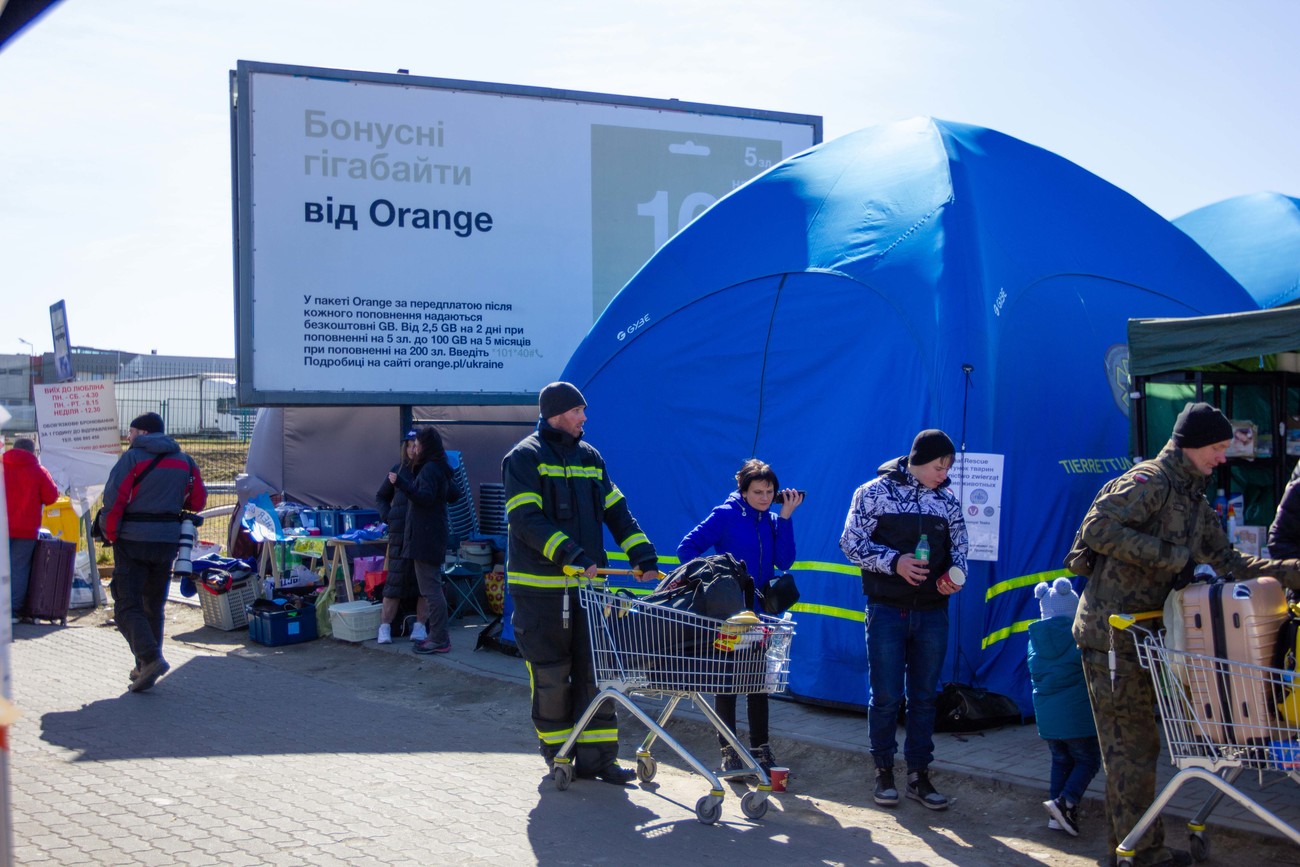
Another key transit location for refugees and their pets is the Przemyśl train station. With the help of your donations, we are able to have two IFAW-supported veterinarians from Ukraine working alongside Polish veterinarians operating the animal border control. In 24-hour shifts, the veterinarians assess the animals’ health, provide vaccinations and microchipping, and help with the paperwork required to ensure pets can travel into Poland and other EU countries. The owners are also provided with items such as carriers, leashes, harnesses and muzzles, and pet food to bring with them on their journey.
Tomasz Dzimira, Head Veterinarian of the Przemyski District, told us that there was one dog in particular that he remembered: “One of the dogs that came in was not well. He was supposed to have surgery in Ukraine on the day that its owners were forced to flee. So the minute the dog came into Poland, a veterinary colleague and I operated on the dog to remove some kidney stones. I am happy to say that the dog is doing well!”
---
Refugee stories from the border
25 March 2022
At several border crossing points along the Ukrainian-Polish border, refugee welcome centers have been set up. Every day, thousands of refugees come in who need a place to stay overnight, before continuing their journey into Poland and from there other neighboring countries. Our team has visited several of these border crossings, supporting the local veterinary teams and distributing water, pet food, harnesses and carriers to refugees who have fled Ukraine with their pets. Here are some of their stories.
In Korczowa, we meet Iuliia as she sits on a cot in the refugee center. She tells us that she escaped the bombing in Kyiv and is hoping to bring her eight-year-old Pomeranian, Hugo Boss to the United States, where she has family. IFAW emergency responders Jennifer and Shannon help advise her on the process for getting Hugo Boss the correct vaccinations and paperwork for an “owned dog” importation permit.
At the border crossing in Medyka, our team finds Tania sitting outside in the cold. Tania left the war-torn Kyiv region with her 10-year-old daughter and one-and-a-half-year-old Pomeranian, Mikaela, who she calls her “best friend.” While talking to us, Tania is overcome with emotion trying to explain why she had to leave Ukraine. We stay with her for a while, give her some dog food for Mikaela and wish her well on her way to Germany.
Making a difference for Ukrainian refugees and their pets
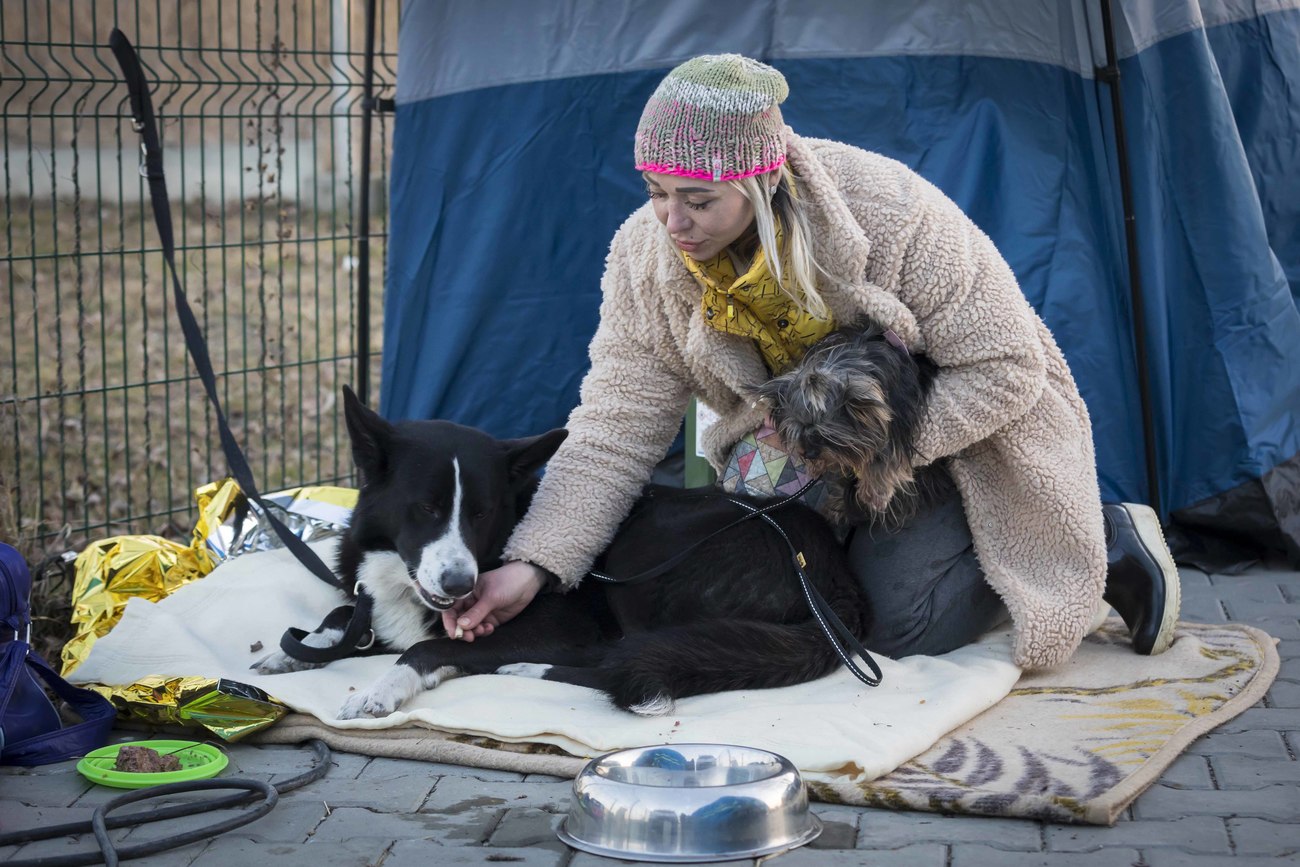
At another location, we meet a family with a little dog called Lala, sporting a small ponytail and sitting wrapped in a pink blanket. The family is at the border crossing trying to figure out how to get to a pet-friendly shelter. Apart from Lala, they have two other dogs with them and at least three cats. Part of the family has stayed with the animals, while the others are looking for a place to stay for the night.
And then there was Bono, who our team met while taking the train from Przemyśl to Kraków. Bono’s owner is from Kyiv and on her way to Kraków to stay with family. She left her home because of the war, and her husband stayed behind to fight. She is understandably very sad and luckily has Bono with her to provide some comfort. The team sees that she doesn’t want to put him down on the seat beside her because Bono is a bit dirty from the travel, and she explains that someone else might want to sit down. One of our team members gives her an old black t-shirt so that Bono has a little bed for the duration of the train ride. He falls asleep soon after, while his owner tells us that he’s been very nervous from all the bombs going off and hasn’t been sleeping well. We feel that this train is probably the first quiet place they’ve gotten to in quite some time.
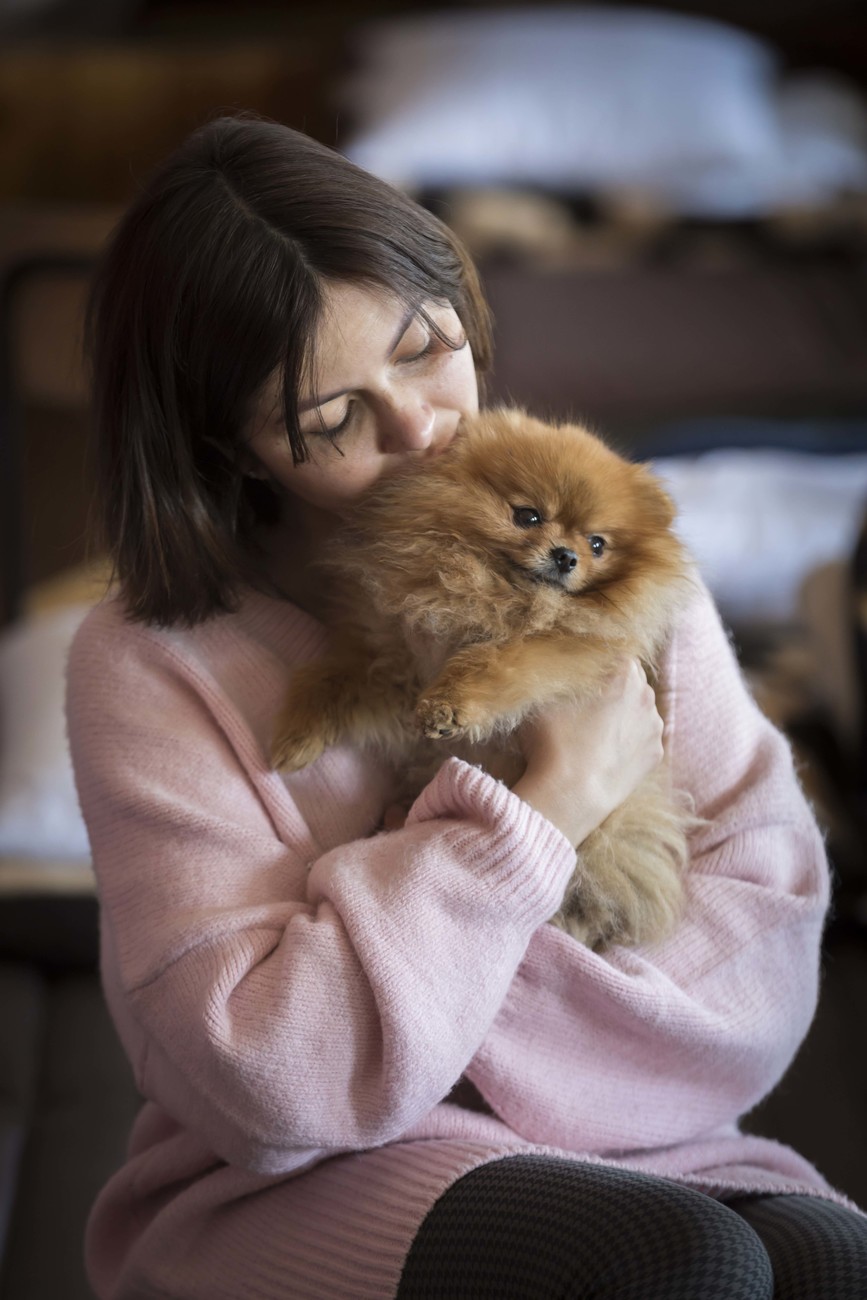
There are many, many more stories like these. All people and families trying to get to a safe place, together with their loved ones—including of the furry kind. We are so thankful to be able to make even the slightest difference for some of these animals and people in their time of need.
---
Helping Ukrainian refugees and animals at the Ukraine-Poland border
19 March 2022
IFAW’s emergency response team has met with organisations and authorities in Poland working on the frontlines of the crisis. Staff and volunteers we have met are tired, anxious and very emotional about the situation facing Ukraine citizens and animals. There are still so many needs, for people and animals.
In Warsaw, IFAW’s team met with Polish veterinary authorities to discuss how they are processing refugees and their pets from Ukraine. There is estimated to be around 80,000 refugees coming into Poland on a daily basis, many are bringing their pets with them. Polish veterinary teams are processing 500 to 600 animals per day and have vaccinated and microchipped over 12,000 animals since the war began. Some families hide their pets for fear they will be confiscated, so clear communication at the border crossing points is crucial.
Helping Ukrainian refugees and animals in Poland
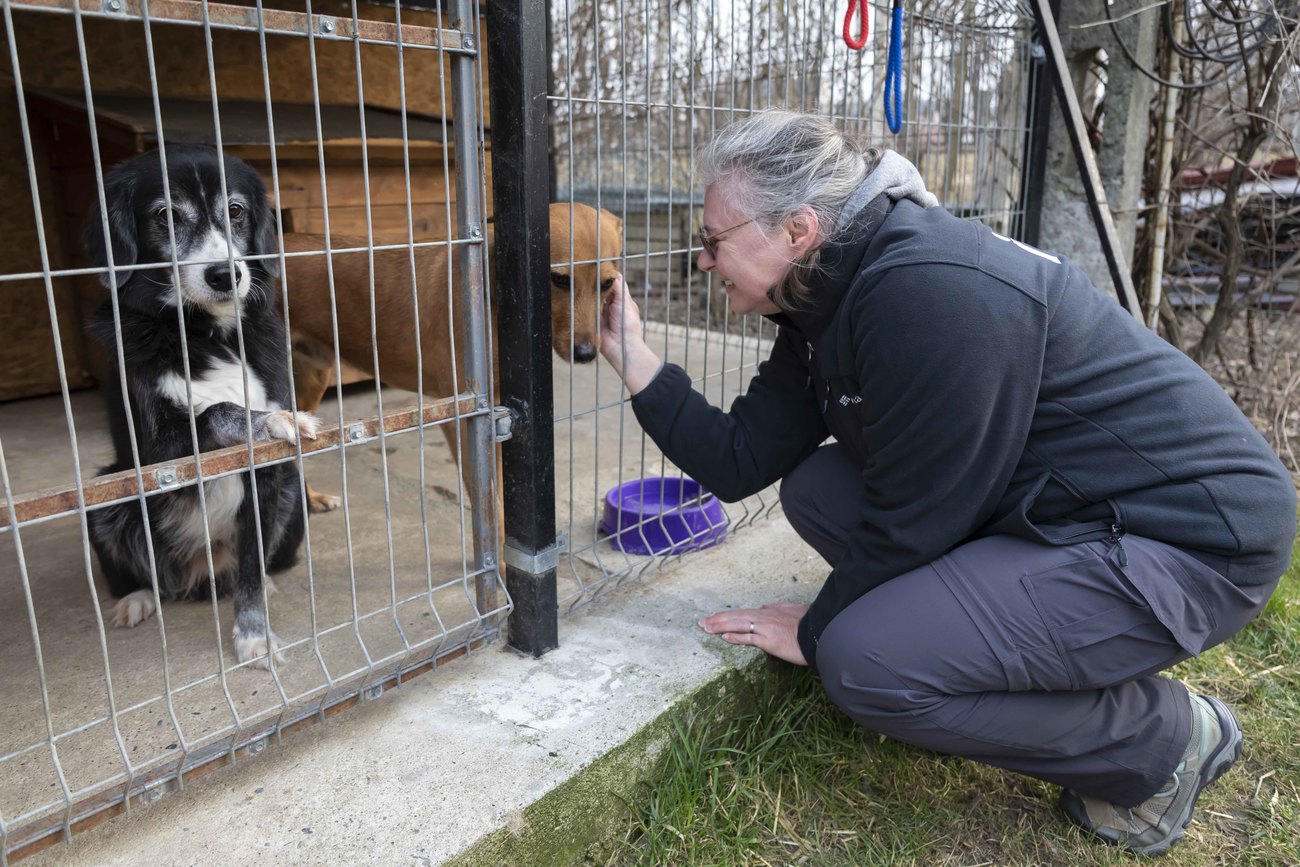
The train station in Przemyśl in the Subkarpaten province has thousands of refugees coming and going daily, everyone trying to get to a safe destination in Europe. It is bitter cold at night (at times freezing and below) and families are queuing for trains all day long. They have their animals and families with them and just want to remain together. When we arrived at Przemyśl train station earlier this week, we found that the veterinarians working at the station were completely exhausted. Every day their team of three people processes up to 200 dogs and cats, coming in on trains from Ukraine. The animals have traveled miles with their families and are often dehydrated and showing signs of hypothermia, so wet food and other items such as cat carriers, leashes and harnesses are continuously needed. We are delivering daily supplies to the station team, so refugees have critically needed support for their journey onward. As the situation in Ukraine intensifies, there is expected to be an influx of animals in crisis.
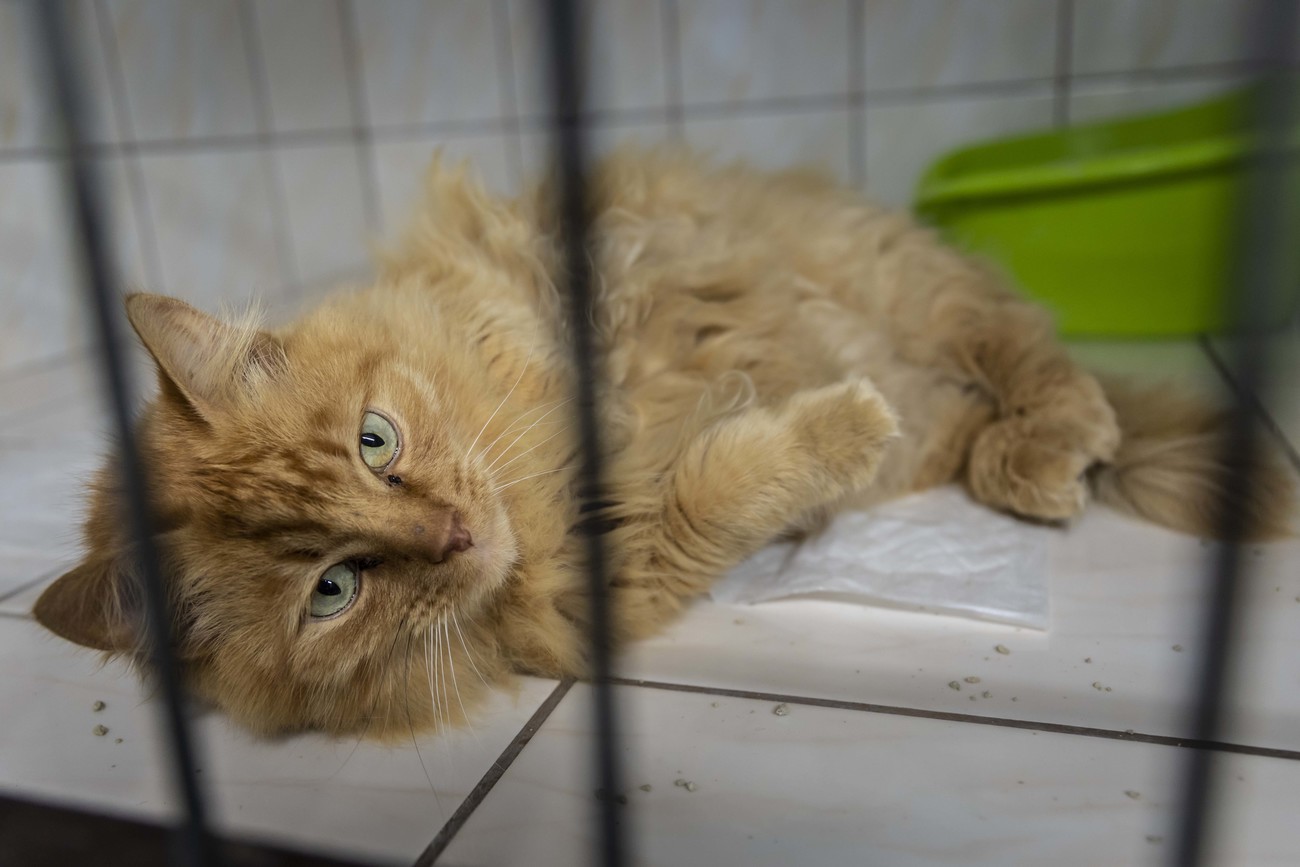
Our shelter partner, ARKA Animal Protection Association is also located in Przemyśl, about 15 kilometers from the Ukrainian border. Before the conflict started, they made the tough decision to transport dogs and cats in their care to neighboring countries, to make room for animals arriving from Ukraine. When we visited ARKA the other day, we met Pavo, the shelter manager, and learned that they are expecting a new influx of dogs and cats to come in any day now. They are working closely with volunteers who bring over animals from Ukraine, and with their veterinary inspector to process the animals. IFAW’s support covers veterinary expenses for exams, microchips and vaccinations prior to placement. Pavo and the entire ARKA team work tirelessly to care for animals in need and we are proud to support their mission to save lives of Ukraine’s dogs and cats.
Emergency grants were recently issued to Feldman Ecopark in Lisne, Kharkiv and XII Months Park in Demydiv, Kyiv for food, vet supplies and operational expenses.
We are very grateful for your ongoing and generous donations that make all this work possible. And we will continue to stand with dedicated and selfless shelter staff in Ukraine, Poland and all countries supporting those most in need.
---
Shelter destruction in Berdyansk
17 March 2022
It is impossible to tell the story of our shelter partner in Berdyansk, Ukraine, without telling the great losses this horrible war has cost them. Their facility has remained at the center of terrible conflict and attacks. Yet, the team remains onsite and committed to caring for the animals. Some animals have died from explosions or gunshots, while others have run away after an explosion opened a hole in the shelter’s walls. For the first five days of the invasion, we were not able to reach the facility. Since that time, connectivity has been restored and we have been able to communicate and send emergency funds.
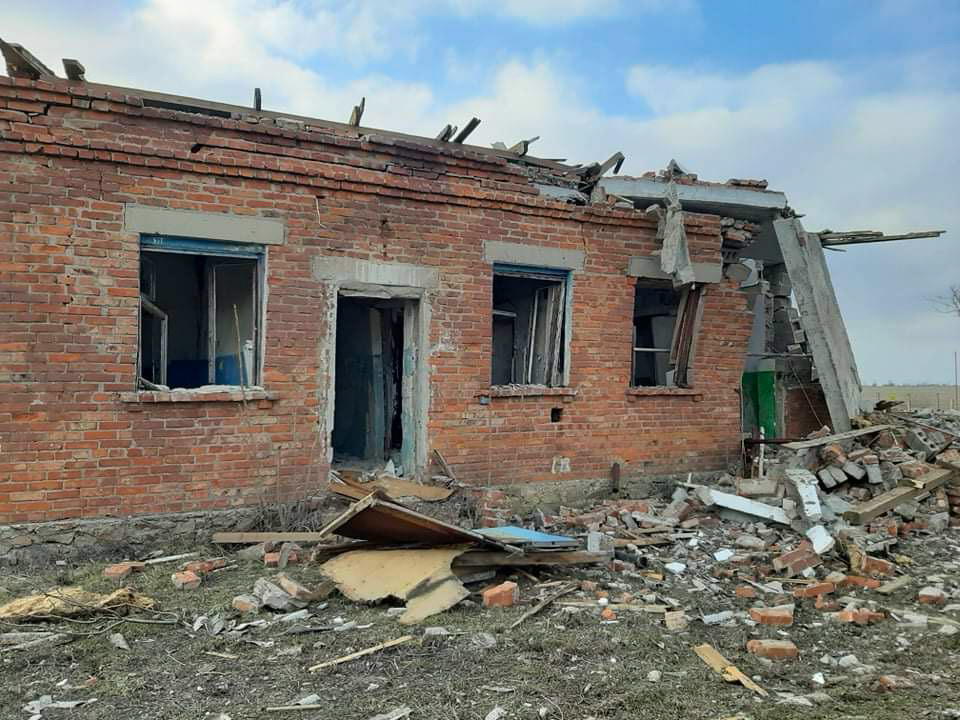
In the last couple of days, the shelter team sent us an update that they used some of the emergency funds to purchase two tons of grains and dog and cat food.
The shelter director sent a heartfelt thanks, saying, “Your help at the moment is invaluable.”
Our thoughts are with the team and their dogs during this incredibly difficult time. We cannot say thank you enough to our supporters, who make it possible for emergency aid to reach those who need it most.
In the midst of all the chaos, we wanted to share a small story of goodness and hope. Shortly after the conflict in Ukraine began, one of our shelter partners rescued Dashenka, a small one-eyed dog. She was well taken care of and clearly from a good home. Right away, the search began for her family. It took about a week before the team finally connected with her family, who had been searching for her the entire time. We are happy to report Dashenka has been reunited with her loved ones and we wish them all the best.
---
IFAW deploys to Poland
13 March 2022
Since the conflict started, IFAW has supported multiple partners helping animals and people in Ukraine and the surrounding countries. Our team has now deployed to Poland and will continue to work with local shelters and government authorities. Our first priority on the ground is to understand the scale of unmet needs for shelters, animals, and people and their pets. Because of you, we are able to provide immediate support where it is needed most. We will be sharing stories and updates from our field team in the coming days. Thank you to everyone who has supported us so generously to help save lives and keep families together!
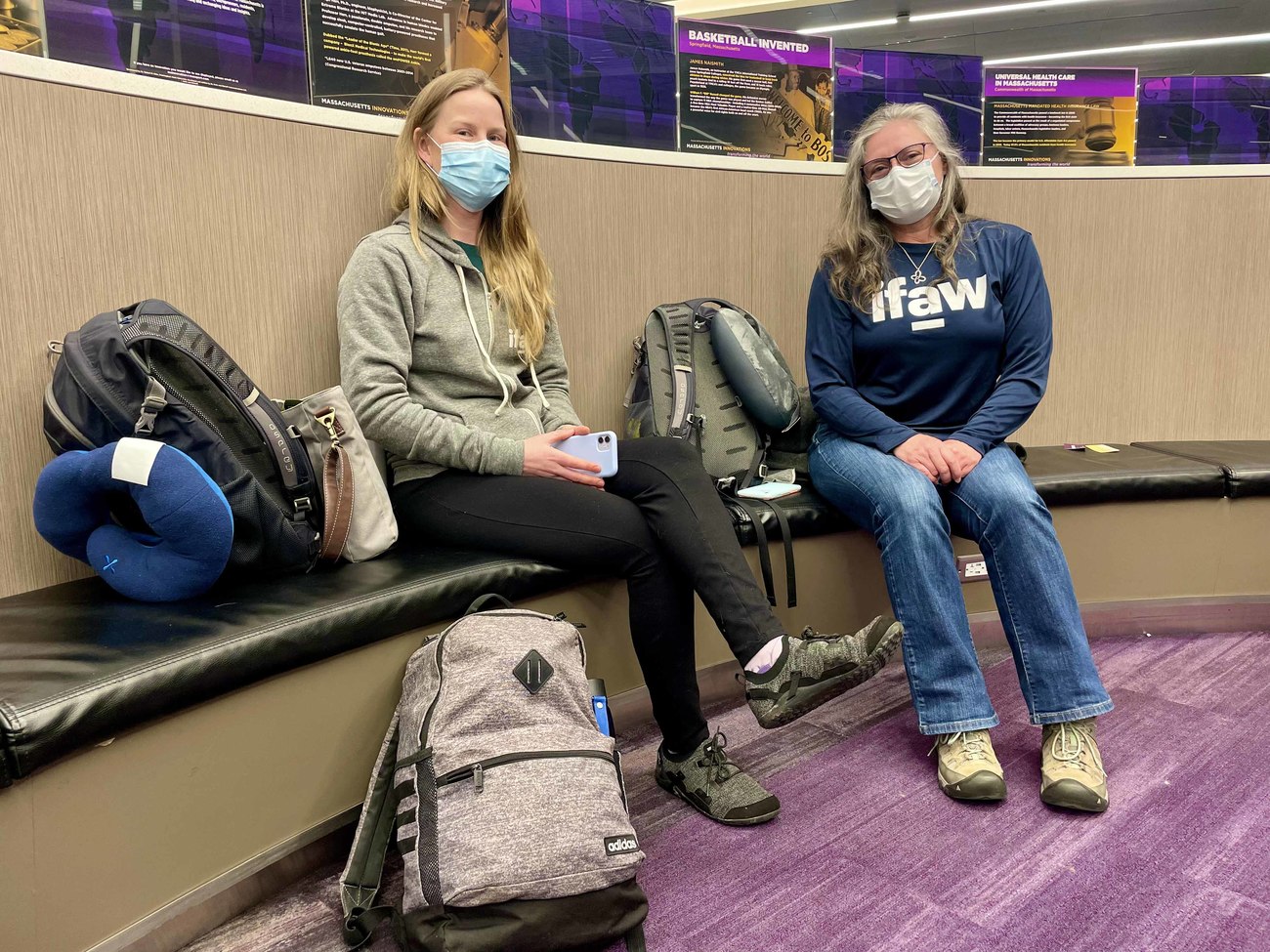
Supporting a bear rehabilitation center
8 March 2022
IFAW continues to expand our support to local partners in Ukraine who are helping animals amidst ongoing and violent attacks from Russia. Our team also awarded an emergency grant to Save Wild’s White Rock Bear Shelter, a bear rehabilitation center in Chubyns’ke outside of Kyiv. Staff and volunteers sheltered in place to care for their animals after armed conflict near the city intensified. With our grant funding, the center was able to purchase much-needed food and supplies for the bears under their care. Since then, the bears have been evacuated and relocated to the Four Paws’ Bear Sanctuary Domazhyr in the Lviv region, Ukraine.
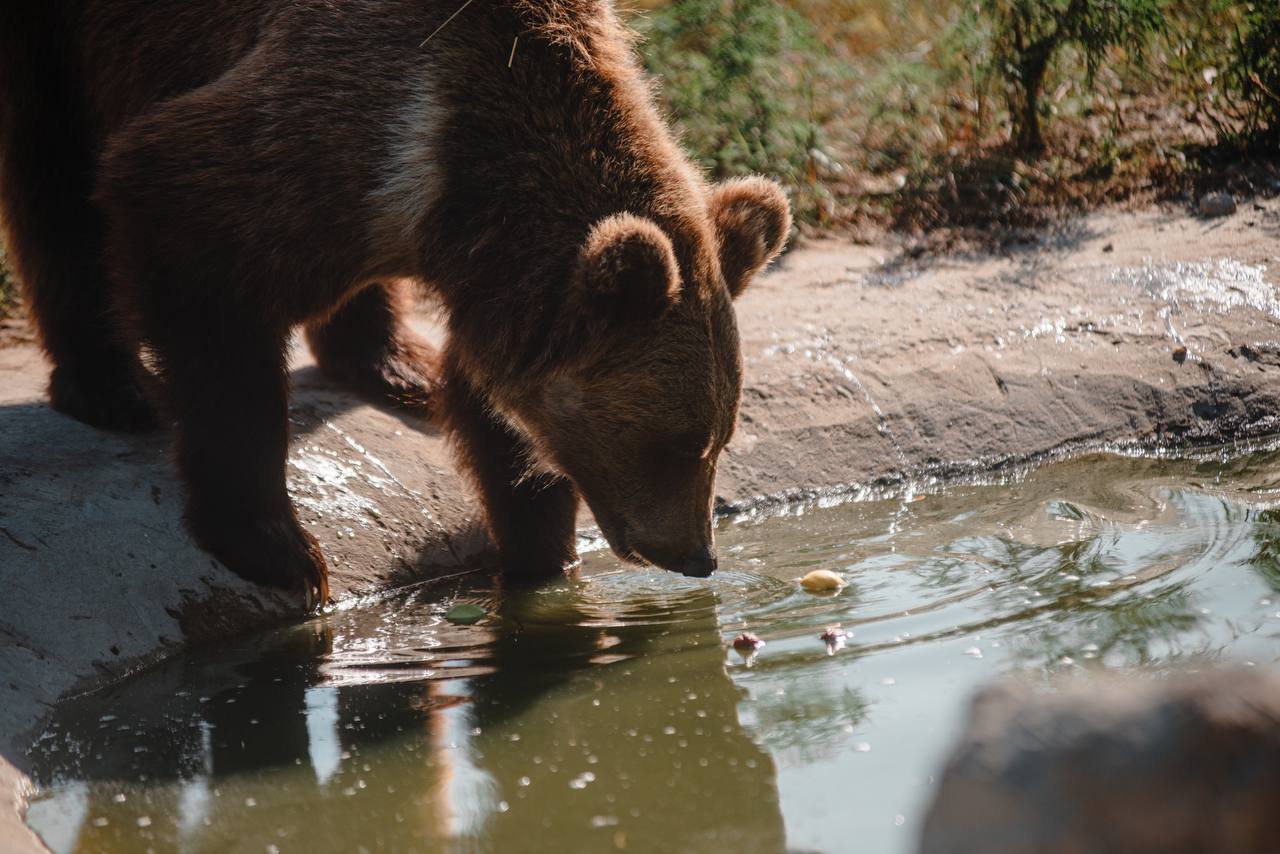
Our shelter partners in Ukraine have received additional wire transfers of emergency funds to support the purchase of dog and cat food and veterinary supplies. Tragically, we received reports today from local partners of more shelling resulting in damage to facilities and loss of life, both human and animal. We send our condolences to the survivors and continue to stand in solidarity with all victims of this war.
---
Caring for wildlife at the Poznań Zoo
4 March 2022
IFAW has partnered with the Poznań Zoo in Poland to provide temporary shelter and care for wildlife rescued from the conflict in Ukraine. We are thankful for zoo director Ewa Zgrabczyńska, her incredible team and those who risked their lives transporting these animals to safety.
Ewa sent this emotional message after IFAW reached out to offer our support.
“Dear Colleagues, thank you very much for your great readiness to help in this horrible situation! At the moment, I am staying on the border, waiting for the transfer of lions and tigers. Animals still alive, but I am crying, the road is full of escaping cars and people, a dramatic situation, time is so important to help them. You can't imagine the tragedy of the war here, animals in Kyiv—killed. No food. I feel powerless, but we will try to organize more transfers and will bring food for them.”
The nail-biting rescue began when local authorities in Poznań approved the zoo’s request to provide a safe place for wildlife evacuated from a sanctuary in Kyiv. Ewa, her team, and sanctuary staff made preparations for a massive relocation operation. But the journey was not without its perils.
The reality of how challenging this move would be started when the team first departed for the Polish border. Immediately, the convoy came under fire and had to return to the sanctuary. The following morning, they tried again, but were stopped and surrounded by Russian tanks.
Ewa and her team feared the worst and waited all night for updates on the convoy. The following morning, they finally received the good news: “Kiev defenders carried out transport through the occupation line. They're on their way!”
The convoy moved slowly and deliberately, avoiding bombs and Russian troops, and finally arrived at the border safely. Though the team and animals were exhausted, everyone was alive.
The animals were unloaded at the zoo and have been in recovery ever since. Each animal is dealing with the trauma of war in different ways—the animals are resting, eating and sleeping away the stress of their precarious rescue.
Special thanks the Authorities of the City of Poznań, Mr. President Jack Jaśkowiak and his Deputy Mr. Jędrzej Solarski for saving and helping free Ukraine. We send special thanks to the Chief Veterinarian Doctor Paweł Niemczuk and his Deputy Dr. Krzysztof Jazdżeewski and the Borderline Veterinarians of Korczowa. Without them nothing would have been possible.
---
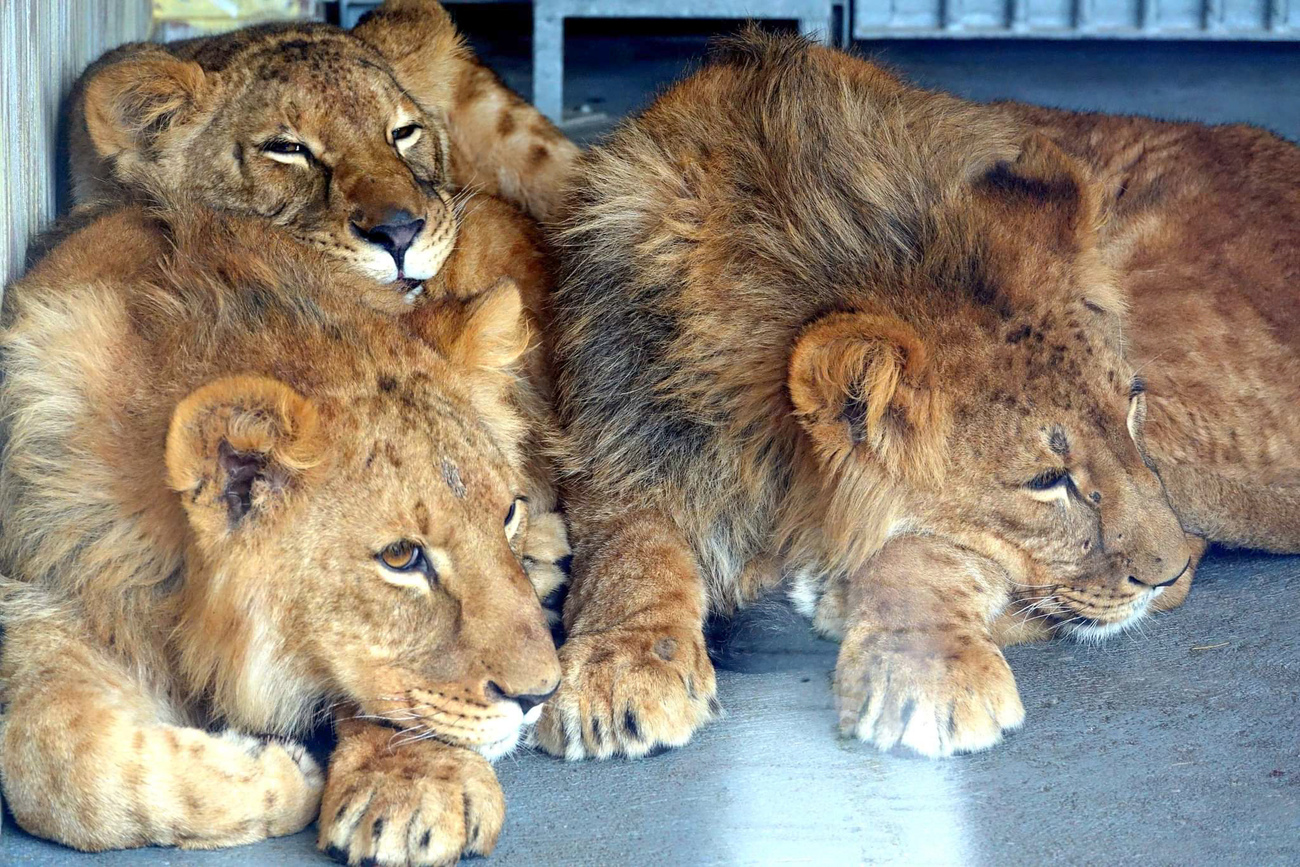
A grant to World Central Kitchen
3 March 2022
Amid this terrible conflict, people and organizations are stepping up to help people and animals displaced by the violence. We have issued a $50,000 grant to World Central Kitchen (WCK), an organization IFAW has worked with on multiple crisis events. We previously partnered with WCK to provide relief to families at the height of the COVID-19 pandemic and several disasters around the globe.
We are grateful for the dedication and compassion WCK and chef José Andrés have shown to people and communities impacted by the crisis in Ukraine. As of today, over a million refugees have left Ukraine, and there is a clear need to help as people seek safety. WCK recently helped a woman named Shatabdi as she entered Poland from Ukraine. Shatabdi fled Ukraine with her cat, Crimsee (zipped in her coat), walked over 37 miles with no food or water and waited in line for 12 hours before crossing into Poland. WCK was there to give her a place to sit and a hot meal to eat.
WCK teams will continue to serve meals in five cities in Ukraine, including Odessa and Lviv. They have set up teams at eight border crossings in Poland and are onsite in Romania and Moldova. Soon, they plan to expand relief efforts to Slovakia and Hungary.
---
Shelter partners in Ukraine receive emergency funds
1 March 2022
Both of our partner shelters in Ukraine confirmed that they have received initial emergency funds from us. This first grant will cover pet food, veterinary supplies and wages for daily care staff. They are still able to purchase supplies locally, but we know that will not last. We continue to collaborate with our partners in an effort to source supplies within the country and from neighboring countries.
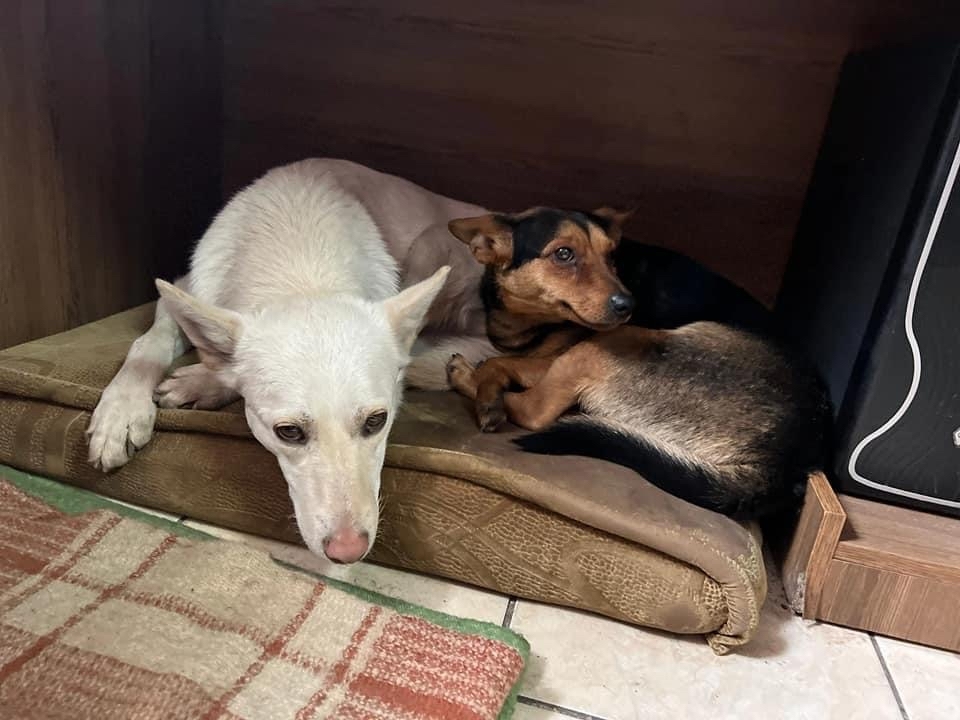
Preparing to rush emergency aid to Ukrainian shelter partners
24 February 2022
Russia has invaded Ukraine following days of gathering its forces along Ukraine’s border.
We are preparing to rush emergency aid to our local animal shelter partners in Donetsk and Gorlovka, who report a very dire situation for their staff, volunteers and the 1,100 dogs in their care.
In Gorlovka, staff are not allowed to cook hot food for dogs in care because the fire could draw unnecessary attention to the shelter. They desperately need to buy dry dog food.
In Donetsk, the streets are deserted and one car continues to drive through the city, playing a message via loudspeaker urging residents to evacuate immediately.
IFAW is committed to providing several months of animal food and veterinary supplies, and our emergency grant will also support operational costs for staff and volunteers as they continue to care for their shelter dogs.
IFAW first developed close partnerships with these shelters in 2014 when Russian troops invaded the eastern region of the country. We partnered with each shelter to provide critical support as they slowly rebuilt their homes, shelters and lives.
All too often, animals are the voiceless victims of conflict, and these shelters need our support now more than ever.
A message from our shelter partner: “Our dogs are very scared. Many do not leave [their dog houses]. [Indoor] dogs do not go outside. We are without rest and breaks at the shelter. It's very difficult for us right now. We are grateful to everyone. We really want peace. We are extremely tired mentally and physically. You are there and we feel it. THANKS! 10,000 times THANK YOU to everyone!”
We are overwhelmed with gratitude for your generosity and concern. Thank you for your support and encouragement as we continue to help where we are needed most during this crisis.
---
Shelter damage in Gorlovka
27 February 2022
We are devastated to share that our partner shelter in Gorlovka sustained damage and, unfortunately, one dog was killed after a shell hit the facility. Staff remain in place and have continued to care for their dogs. We are working with the team to assess damage and help as much as we can. They are in our thoughts and we will keep you updated.
We are standing by to deploy our trained responders to assist local partners with the ongoing crisis in Ukraine. Our goal would be to help where we are needed most and to keep families together as they flee Ukraine in search of safety. In the coming weeks and months, families, including their pets, fleeing Ukraine will need each other more than ever. IFAW has no intention to enter Ukraine, but will work with our local partners in countries that surround Ukraine. We, and our partners, are so thankful for all your support and will continue to share updates during this crisis.
---
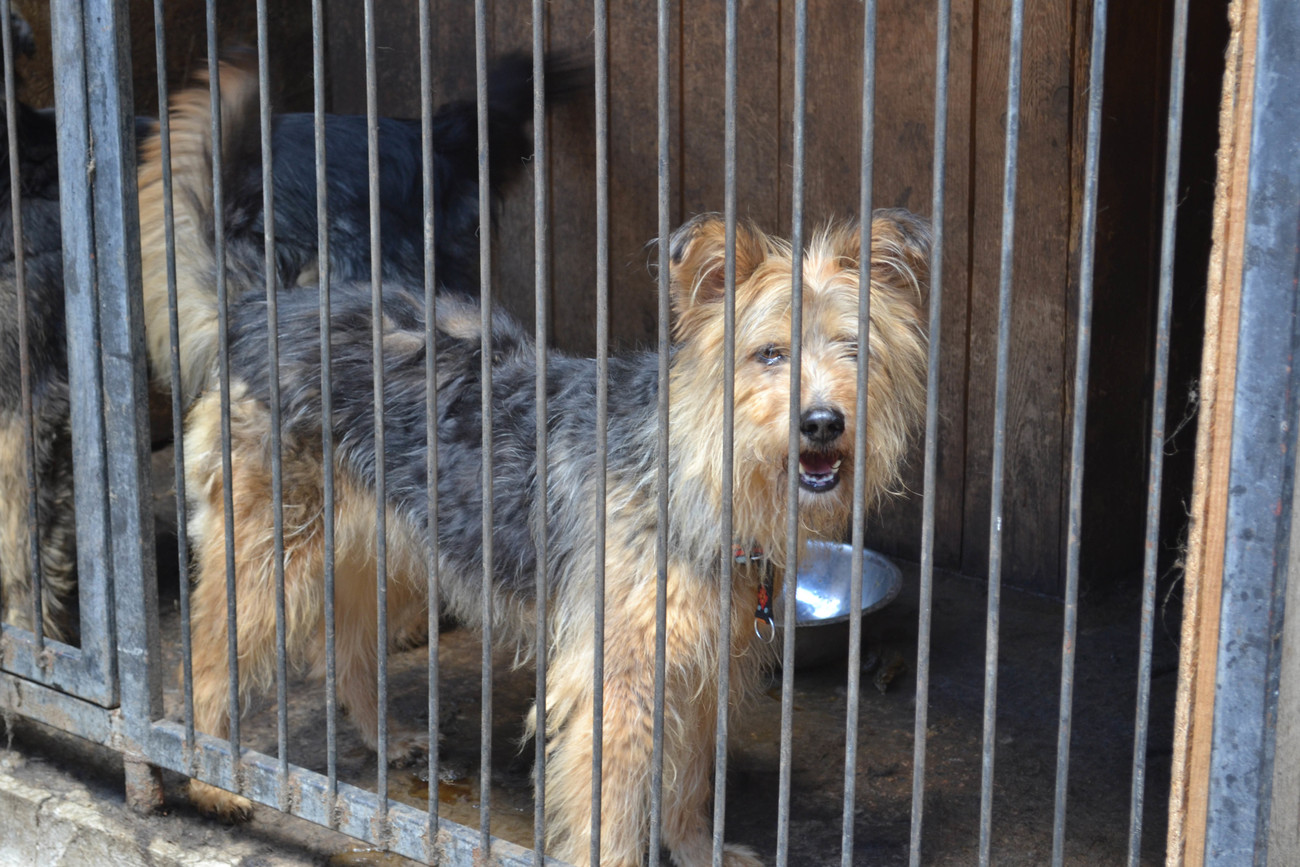
See how ifaw supported Shelter Pif in 2015
Related content
Our work can’t get done without you. Please give what you can to help animals thrive.